Portraits of Us:
A Book of Essays Centering Black Women Leading Philanthropy
Edited By Toya Nash Randall Curator and Catalyst Voice. Vision. Value.
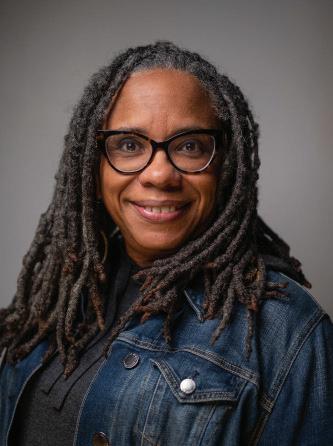














Portraits of Us is dedicated to my grandmothers Lillie Mae Keys and Nalvina Harlen Mickens. Together they demonstrated a deeply rooted bond of sisterhood, established a multigenerational community of
care across their two families, and exemplified unwavering love, faith, and service to community. Because of them, I found my voice, I have a vision and I know my value.
“I can’t believe my good fortune. I’m so grateful to be a Black woman. I would be so jealous if I were anything else.”
Maya Angelou
Black women are the full force behind Voice Vision Value and everything I’ve dreamed for the platform is possible because they continue to say yes. I am forever grateful to all the women who spent countless hours dreaming and scheming with me for the good of this project.
It is my deepest hope that when you visit voicevisionvalue.org and read the pages of Portraits of Us, you too will be inspired to gather with women across your network to share stories, generate ideas and activate
your collective power in ways that matter to you and on the issue(s) that matter to people like you.
I hope you see yourself and know that you are not alone. I hope you find comfort and reassurance in knowing that there are women like you across the sector who show up and say the quiet parts out loud. Women committed to making the sector more equitable, inclusive and just. Make note of the names, remember their faces. Reach out and connect. Reach in and reflect.
—Toya Nash RandallPortraits of Us features the creative works of the following:
Cover art was designed by Dejah Tanner and inspired by “Art Is,” a 1983 performance art piece by artist Lorraine O’Grady. In her referenced work, O’Grady uses an antique gold frame to show Black women thriving at the intersection of arts and culture.
Contributing Writers
Ebony Aya
Gennette Cordova
Kelly Harris DeBerry
Traci O’Neal Ellis
L’Oreal Thompson Payton
Adena White
Principal Photographers
Brittany Dacoff
Shellee Fisher
Idris Hassan
Alex Jenkins
Awa Mally
Danielle Miles
RoGina Montgomery
Monique Brunson Jones
Tiffany Friesen
Utoia Wooten
Traci O’Neal Ellis
Qiana Thomason
Mares Asfaha
Nancy Sanabria
Chanda Smith Baker
Takema Robinson-Llewellyn
Deborah Aubert Thomas
Brandi Howard
Summer Jackson
Lateefah Simon
Kameron Green
Wellspring Philanthropic Advisors
W. K. Kellogg Foundation
Angell Foundation
Pivotal Ventures
Health Forward Foundation
Satterberg Foundation
California Wellness Foundation
Ewing Marion Kauffman Foundation
Spears Group
Casey Family Programs
Forefront Illinois
Philanthropy Southeast
Philanthropy Northwest
Philanthropy Ohio
Greater New Orleans Funders Network
Southern California
Grantmakers
Black Funders Network of the Bay Area
Portraits of Us: A Book of Essays Centering Black Women Leading Philanthropy was funded by generous donors and investors and produced as part of Voice. Vision. Value. Black Women
Leading Philanthropy. All proceeds from book sales will be donated to ABFE, a Philanthropic Partnership for Black Communities.
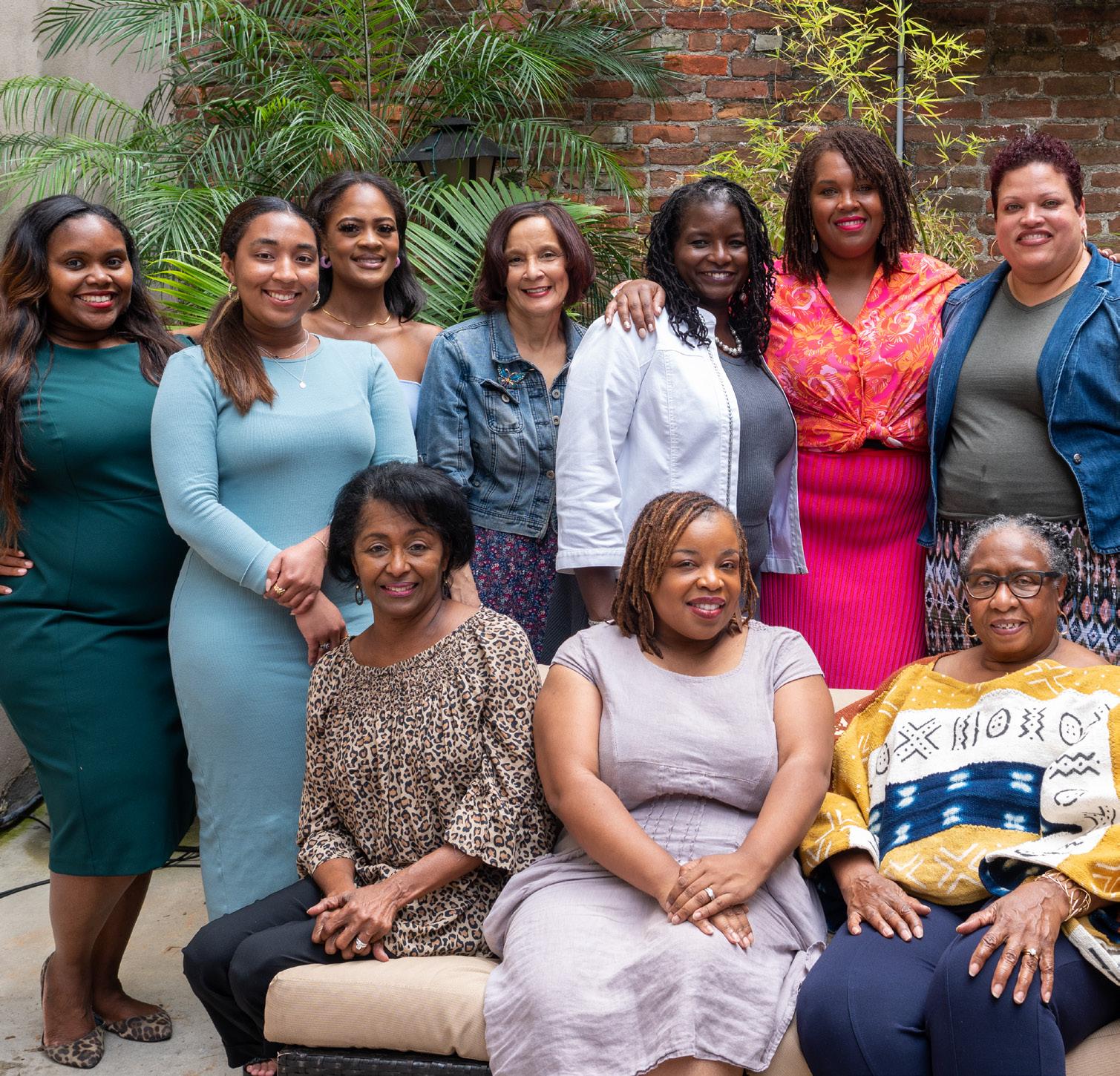 New Orleans, LA
New Orleans, LA
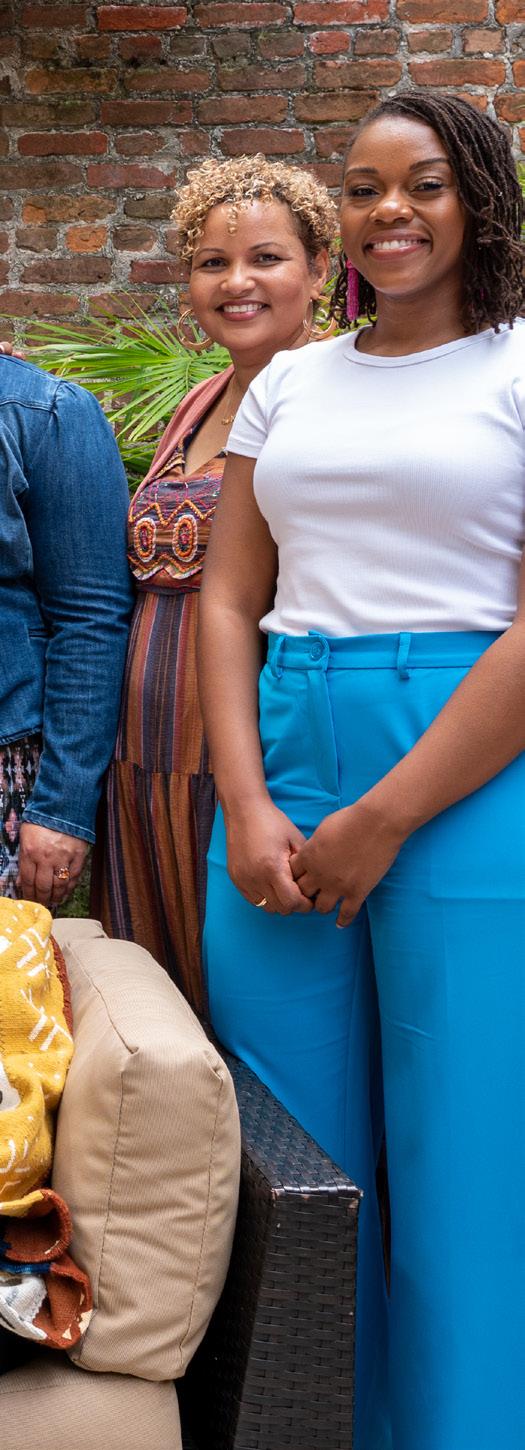
In New Orleans, the most African city in America, Black women in philanthropy are more than mere colleagues. The African philosophy of Ubuntu, “I am because you are,” anchors their sisterhood with gratefulness and a sense of duty. The ancestral spirit and culture of the city serves as the backdrop to their
work. These Black women in philanthropy see themselves as carrying on a legacy passed down to them from grandmothers, mothers, aunties, cousins, teachers, churches and community elders. They know what generations of women before them knew: that it not only takes a village to raise a child, but that it also takes a village to sustain it. Informal and communal philanthropy sustained us in the past and, even now, continues to be transformative.
New Orleanians such as Linetta Gilbert, Ashleigh Gardere, Joycelyn Reynolds, Christy Wallace Slater, Carmen James Randolph, Takema Robinson-Llewellyn, Ashley Shelton, Jilla Tombar and Ciara Coleman have been connected to the work and to one another since before Hurricane Katrina, and have maintained those connections through local and national political shifts, a deadly and disorienting pandemic, police killings and Black Lives Matter protests, Hurricane Ida and

the current inflation-related economic hardships. What’s more, by passing on the same legacy that was passed on to them, they are setting the table for the next generation of New Orleans’s Black women philanthropists.
“Philanthropy can be a lonely place because everything is so transactional. It was hard for me to trust people early on in my career.”
Christy Wallace Slater, V.P. of Programs for Women’s Foundation of the South and former program officer at the Kellogg Foundation
Many Black women in philanthropy admit stumbling
into the field. Their earliest dreams didn’t include philanthropy, nor did their college degrees predict their future profession. Takema Robinson-Llewellyn and Christy Wallace-Slater, for example, were thrust into philanthropy leadership through disaster crisis. Their previous work in the community propelled them into a moment that was greater than themselves.
Their passion for building up their communities has always been there for these women, but their journey into philanthropy just like Black women’s journey into any workplace, especially has been fraught with white supremacy, patriarchy, betrayal from women of every race, jealousy, accusations of reverse racism and wage disparities, to name just a
few issues. Philanthropy can be so transactional, it can be difficult to trust and develop meaningful relationships outside of institutions. Navigating philanthropy meant learning how to endure and work around elitism, cutthroat politics, demeaning bosses and put-downs and questions about their qualifications from less educated and less accomplished colleagues.
Black women’s desires for professional validation can often tempt them to avoid being their most authentic selves, thereby hindering the contributions and impact they can make at work. However, this group of Black women philanthropists has declared that shrinking themselves in the attempt to survive in a workplace is not an option.
They have instead vowed to show up in the world of philanthropy as their most genuine selves. Finding other Black women like themselves in their field has been a lifeline. The encouragement that characterizes the sisterhood has helped them be bold and unapologetic about who they are and what they bring to the profession. They’ve learned that their survival in the field requires faith, truth telling, self-care, personal and professional support systems and, when necessary, a strong drink with a sister friend. Just about every Black woman of excellence who cares about other Black women’s success is not only doing the job she’s been hired to do, but also working to promote the personal and professional well-being of other Black people, especially Black women.
“Our lives and experiences make us valuable and inform our expertise. It has taken a while but I know that I am enough. My value is in doing, it’s in being.”
Linetta Gilbert, a bridge maker for so many Black women in New Orleans and across the country credits the support and mentorship she received from women philanthropists in and outside New Orleans when she got her start in the field at the Greater New Orleans Foundation.
friends, she became an expert in leveraging small and big donors, escalating and sustaining the work while resourcing growing communities. When she got her start, Linetta Gilbert didn’t have a lot of Black women colleagues in philanthropy in the Deep South and she wasn’t at a large philanthropy institution. There were two other women doing similar work in New Orleans at the time that she recalls but they weren’t at philanthropic institutions: Jocelyn Reynolds at the New Orleans Arts Council and Rhonda Miller at the Louisiana Endowment for Humanities.
With help from those
“I was constantly reminded that I was not alone,” Gilbert says. “Others in philanthropy showed up for me with a listening ear, connecting me to others in
the field, helped me develop ideas about grantmaking and often leveraged their institutional dollars to support my vision from afar.” Outside relationships helped create and continue to create connections to and collaborations with other philanthropists in the nation.
Linetta Gilbert cites Black women trailblazers in the field, such as Ruth Goines, Gloria Primm Brown and Alvertha Bratton Penny, and describes them as invaluable thought partners during her career. Her eventual role as Senior Program Officer at the Ford Foundation and the national connections she built would be pivotal to bringing communitysustaining resources to her home base of New Orleans.
“Relationships on all levels are vital in philanthropy. It’s not enough to just find your purpose. You have to work on your purpose and that purpose has to be a vision that is bigger than you.”
Linetta Gilbert, Founding Member of the Board of Directors for the Foundation for Louisiana
After Hurricane Katrina, Black women in New Orleans, and specifically those in philanthropy who were connected to the city and cared deeply about its survival, were keenly

aware that philanthropy must reimagine and model investments that localized empowerment on the ground—especially if Black families, neighborhoods and institutions were to survive the reset of New Orleans.
Through the thought leadership and hard work of Linetta Gilbert, Gladys Krigger Washington, Sherece West-Scantlebury, Ashleigh Gardere, Samantha Bickham and community leaders and allies of all races and ages, began to build partnerships,
programs and funding pipelines. They knew it wasn’t enough to activate funders. Hurricane Katrina and the flood caused by the levees collapsing had left New Orleans broken and nearly empty. The storm and its aftermath constituted a life-changing disaster that required not mere charity but significant and systemic change. These women labored together, sometimes formally and sometimes informally, to center the voices and needs of Black and marginalized people as the plans to rebuild New Orleans were being developed and executed. These Black women philanthropists in New Orleans proclaimed the urgent need for a broader, institutionalized strategy to ensure money was being directed to the right
places and landing in the hands of the right people.
Historically, the people of New Orleans and Louisiana who have needed help have instead been the victims of corruption, red tape and unfilled promises. After the upheaval that was Katrina, these women knew it was imperative that the narrative of Black New Orleanians not be hijacked by people with outside motives. There needed to be efforts for us and by us to leverage the resources that were coming in from around the country.
There were people of all economic and educational backgrounds either living in FEMA trailers or living somewhere outside New
Orleans after the Hurricane, and Black people often reported having the hardest time returning home. There was not only a need for rebuilding in the city, there was as great a need for healing. Some of the Black New Orleans women in philanthropy mentioned above were among the many living in FEMA trailers while trying to do the work of finding resources for their particular communities.
Money was flowing into the state, and they knew how critical it was that there be an infrastructure and people in place to develop plans, and execute them and to hold accountable everybody put in charge of distributing of federal, state and local dollars. Black women led the way and were able to convince national funders to invest in New Orleans and the state in a way that
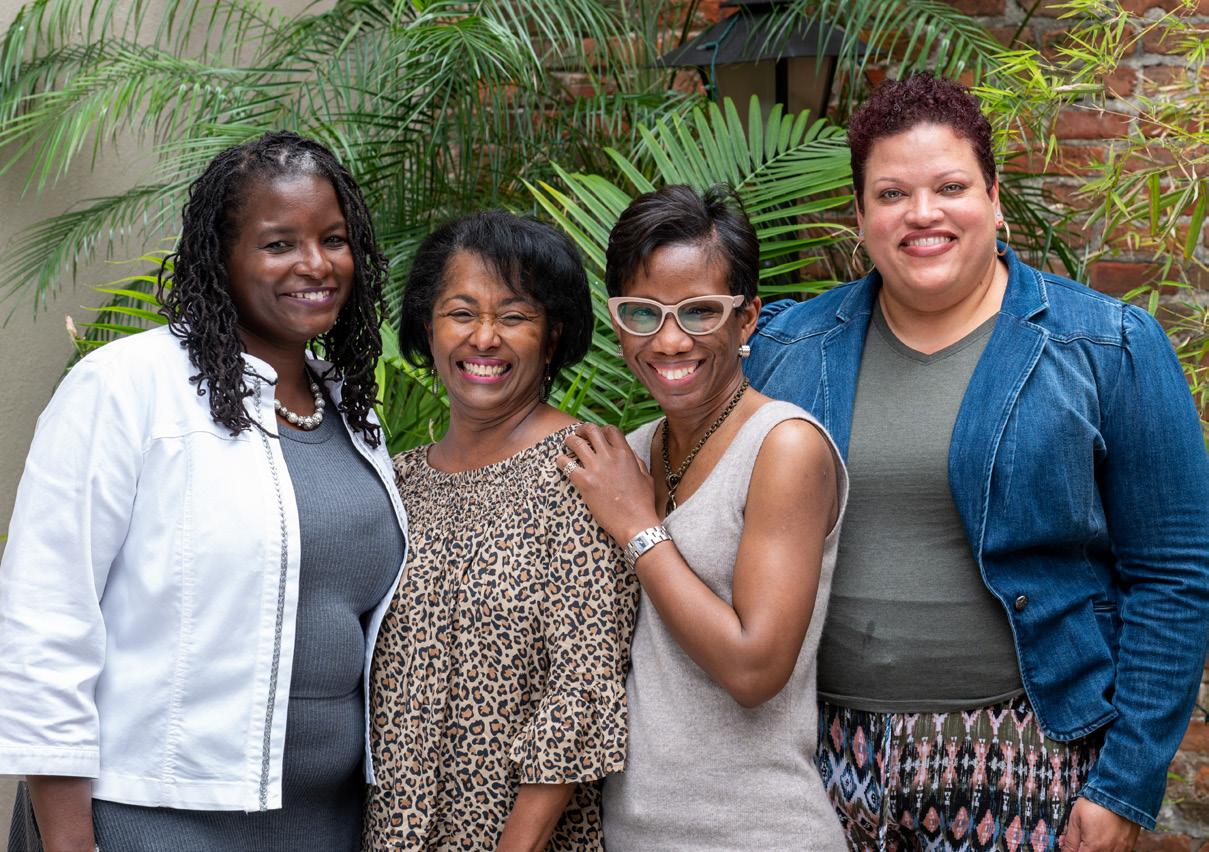
is still positively impacting communities of color today.
The Louisiana Disaster Recovery Foundation (LDRF), now called the Foundation for Louisiana, was urgently developed and launched after Hurricane Katrina to provide a systematic way to receive funds and distribute them to people on the ground. It was the first state foundation
conceived of, created and led by Black people. Sherece West-Scantlebury served as the founding CEO of the Louisiana Disaster Recovery Foundation and was instrumental in developing a strong vision for the foundation’s future. That new vision was built around the idea that big things could happen if philanthropists shifted their approach from providing charity to
assisting communities to bring about change. Today, the Foundation for Louisiana unites donors, committed organizations and caring residents to promote lasting change across the state. According to its website, “The foundation has invested $55 million in more than 250 mission-critical nonprofit organizations working across the state toward building a more just Louisiana.”
It’s also important to note the leadership of Ashley Shelton. The expertise she had developed at the Baton Rouge Foundation made her the ideal choice for Vice President of Programs at the Louisiana Disaster Recovery Foundation. In her role at LDRF, she designed, initiated and coordinated a comprehensive policy strategy, which led to a systemic approach to
equitable policy development on a local, state and national level. Her expertise in state policy and her connections in Baton Rouge proved to be pivotal for the great number of people who had to work in Baton Rouge until New Orleans was livable. Shelton now leads the Power Coalition, one of Louisiana’s most influential organizations for mobilizing Black and marginalized voters
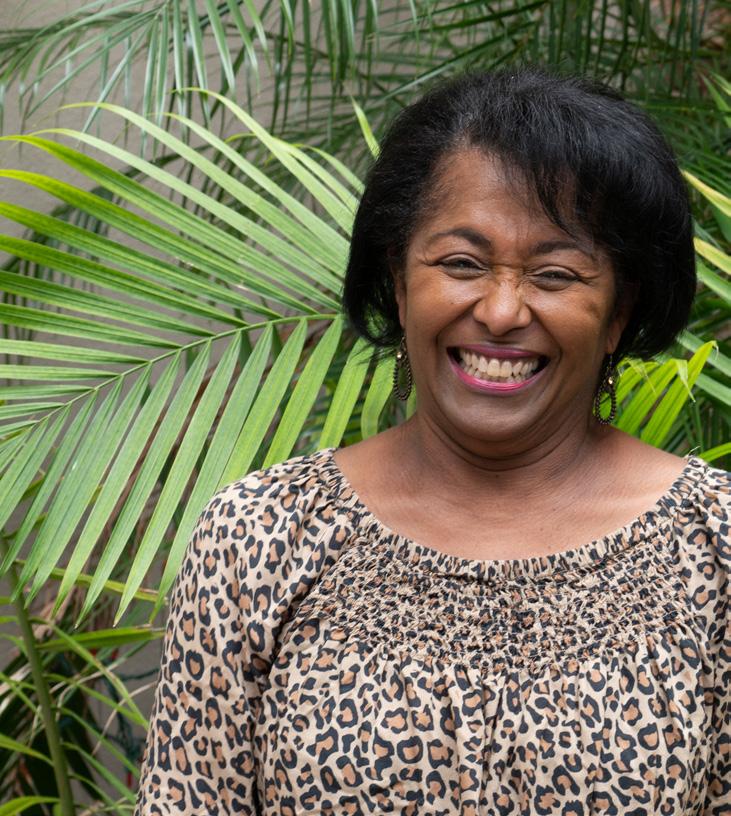
statewide.
The Central City Funders Collaborative was another post-Katrina undertaking fostered by Black women. Then-Mayor Ray Nagin announced the city would try to return by neighborhood. National funders were encouraged to invest in the Central City neighborhood by Black women including Ashleigh Gardere, who was then leading philanthropic
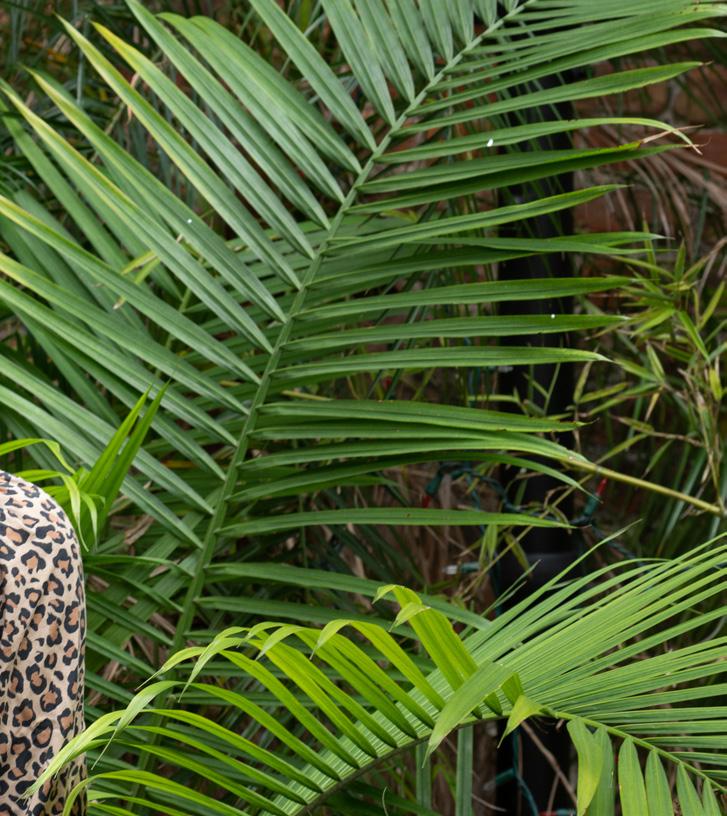
efforts at the Chase Foundation as the V.P. of Community Development. She was instrumental in driving support to Central City, a historic Black neighborhood that did not flood and because of its high and dry status and proximity to downtown, historic St. Charles Avenue and its streetcar was a target for gentrification. Black women led the way in stepping in to preserve Central City’s immediate future, and, because of them, Central City was finally the recipient of an unprecedented level of investment. There were action tables for funders and three community projects were established.
Christy Slater Wallace and Ayo Fayemi-Robinson (formerly Kysha BrownRobinson) helped create a vision and strategy of what
investment should look like and how it would be defined by the people who lived there and had already been active in their community and city for years. Central City Funders Collaborative not only leveraged investments and human capital in the neighborhood but, the collaborative also helped to influence a change in philanthropic behavior. A greater level of accountability was placed on funders and grantees. Funders were more engaged with the actual people they were funding and local residents were ensured a seat at the table. This was a major shift from what was happening prior to the hurricane.
Because so much was at stake for the community, Black women strategized and led the discussions on how to fund pressing short-term
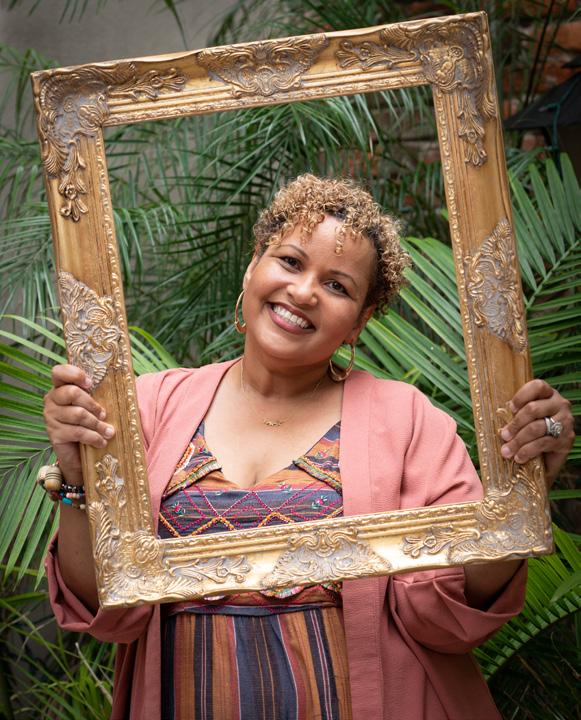
needs but also how to build in long-term sustainability. Consequently, New Orleans became a national model for how philanthropy could authentically and responsibly invest in post-disaster communities. As climate change continues to bring about drastic weather events with a disastrous impact across the United States, this model will continue to serve as a template for such hard-hit communities. Today, Black women in New Orleans
are well-positioned to lead with lessons from the past that inform this moment of reckoning, climate change, and national chaos.
“We have been assigned the ancestral work of breaking the idea that our purpose is only found in producing and working for others.”
Takema Robinson-Llewellyn, Founding Executive Director Greater New Orleans Funders Network
In a Southern state built with free labor, Black women in New Orleans working in philanthropy experience
constant
and systematic
roadblocks rooted in deep red-state historical harm.
Community outsiders look at Black women (and men) in philanthropy positions and often assume access to money is accompanied by the will of an institution to right systematic wrongs. The pressure to fix the world is a heavy expectation. While Black women in New Orleans and beyond have been pushing for equity in their fields before equity was a trending topic, they are aware that grants can’t make all of a community’s problems go away. That said, today more Black-led New Orleans organizations are receiving funds to help their community’s problems because New Orleans Black women in philanthropy were positioned to advocate on their behalf.
Black women in New
Orleans are not only steering investments into their communities, but they are also serving as leaders in the region. Money in New Orleans is controlled by a few. Unlike places such as New York, Atlanta and Oakland, New Orleans and Louisiana do not have an abundance of foundations. The local foundation landscape is vastly different from that which exists in other cities.
The Greater New Orleans Funders Network (GNOFN) was led by founding director Takema Robinson-Llewellyn up until December 2022. The GNOFN’s mission is to “convene and organize philanthropic partnerships, equity initiatives, and investments in Southeast Louisiana that allow the people who live in the Greater New Orleans area to invest in human capital and participate in decisionmaking.” GNOFN created multiple opportunities for amplifying voices at multiple levels in the field. This was critical given that so often there is internal inequity in philanthropic spaces. GNOFN wanted to spotlight the needs of the region, support leadership development and strengthen communication and partnerships among colleagues. There are national funders also represented in the Greater New Orleans Funders Network.
No doubt many New Orleanians and the region have been positively impacted by the work of Black women in philanthropy. Still, a lot more work needs to be done to advance equity in Louisiana and within the field of philanthropy. Many
Black philanthropists recall a time when equity was a dirty word and remember when it took courage to bring up, let alone demand, racial and economic equity. But many agree today that the conversation has advanced through relationship building with younger white generations. Through such work by Greater New Orleans Funders Network and by the mere fact that more Black women and men hold and influence purse strings, Black philanthropy in New Orleans has been able to make small dents in broken systems. These Black women philanthropists in PostKatrina New Orleans organized themselves to say to all sectors in New Orleans and surrounding areas: “We are building a singular system that brings together
economic development, small business, workforce development and community development using a racial equity lens for the economic betterment of all New Orleanians.” “We
were trying to drive as much money to this city as possible. I was going to spend my budget and yours, too.”
One lesson learned after the hurricane was that regardless of the organization, everyone had to get better at understanding policy and its dynamics within the state of Louisiana. No longer wanting to be in a defensive posture, Black women started not only organizing
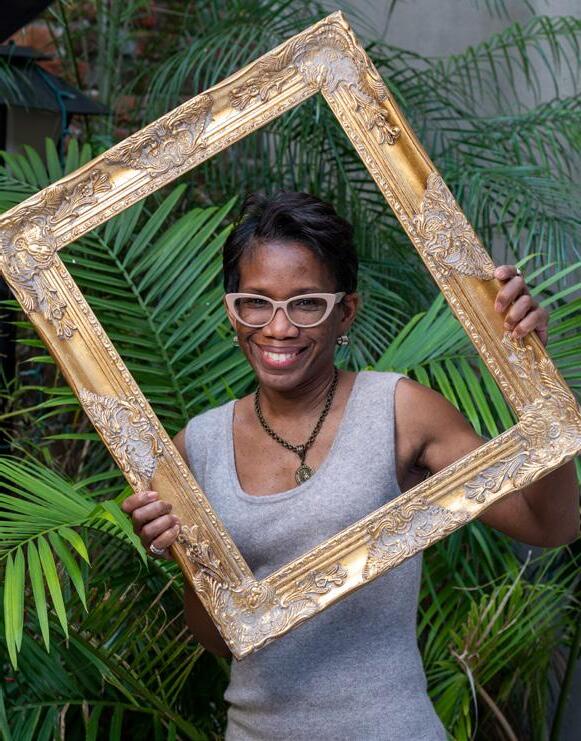
their resources, but they also began getting more proactive about opposing policies that hurt Black and marginalized people and proposing or supporting policies that would help them. There was a need for more just policies to be created and implemented and resourced. The women were constantly thinking about their next move, that is, how to advance the vision past themselves so it would be of service to the next generation.
“You can’t serve the people if you don’t love the people.”
Loving the people, inclusivity and interjectionally were always core values of all the Black women in philanthropy in New Orleans. New Orleans holds accountable those people claiming to come into its communities to do good, and it takes note of those who are true to their promises. A good name among the people of New Orleans is its own capital. Once money was secured, figuring out how to leverage it was manageable because there was always a connection to community and a belief that New Orleanians could make a difference in their own
recovery, if given the monetary assets. Shifting the thinking of funders away from doing heart-string efforts to investing in the smart thing was a plea these women often made to those interested in investing in New Orleans.
This united front has helped bring at least a billion dollars in investments to New Orleans over the last decade. The Black women working in philanthropy in the city have widened the door and added seats at tables locally and nationally. Black women in New Orleans philanthropy tend not to be on golf courses like their white male counterparts looking to make deals, but they are intimately familiar with the communities in which they live and serve and know better than most institutions the power of our people on
the ground. Relationship building is an equalizer and is a superpower of these Black women working to steer money toward their communities in New Orleans.
“We may be belittled, betrayed, or disrespected but we don’t take off our crowns.”
Carmen James-Randolph, CEO and founder of Women’s Foundation for the South
How do you quantify the power of philanthropic sisterhood in New Orleans?
Look no further than the Women’s Foundation for the South (WFS). Our beloved
novelist Toni Morrison once said, “If there’s a book that you want to read, but it hasn’t been written yet, then you must write it.”
Carmen James Randolph, the founding CEO of WFS who spent years at the Greater New Orleans Foundation, decided to leave her position at GNOF to create the foundation she wanted to see. Because of her years of experience in philanthropy and the support of her philanthropy sisterhood, she was able to raise the funds to create the first foundation in the South dedicated to Black and brown womxn and girls. This would not have been possible without the network of sisterhood born out of previous philanthropy work in New Orleans.
The five founding women of Women’s Foundation of
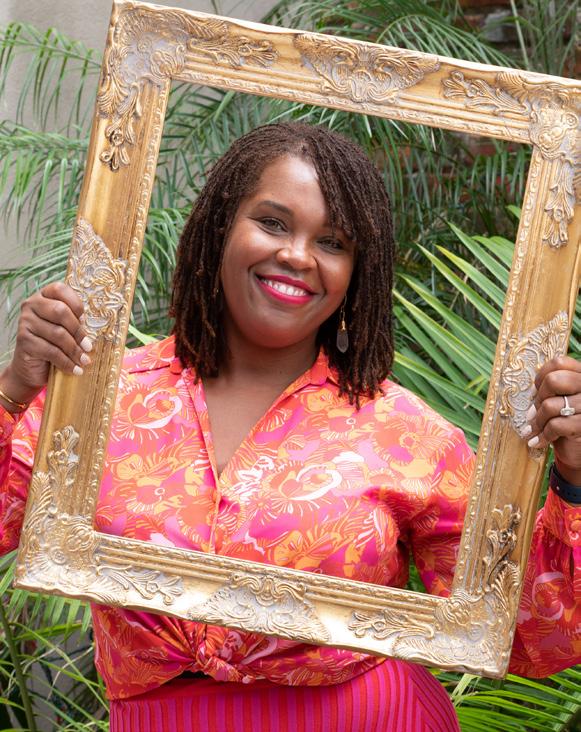 Takema Robinson-Llewellyn
Takema Robinson-Llewellyn
the South know from past experiences in philanthropy, and some from just living in New Orleans generally, that nonprofits led by women of color are underfunded. Their lives are more proximate to the conditions in the communities they serve. According to its website, “WFS was created to address the dramatic gap between philanthropic dollars given to mainstream nonprofit organizations and those led by women of color and
serving womxn and girls of color. The Women’s Foundation of the South’s mission is focused on health & well-being, wealth and power of womxn and girls of color in the American South.”
Carmen James Randolph and Christy Wallace Slater know too well how vital rest and rejuvenation are for women in New Orleans because they have struggled through living without it. They have taken the leap of faith and are now positioned to resource
women and children in the South because they know the struggle as citizens, mothers, leaders and philanthropists.
Keeping it 100:
The work is challenging and constantly shifting and burnout is real…
The investment Black women make in their families, careers and communities can lead to both success and
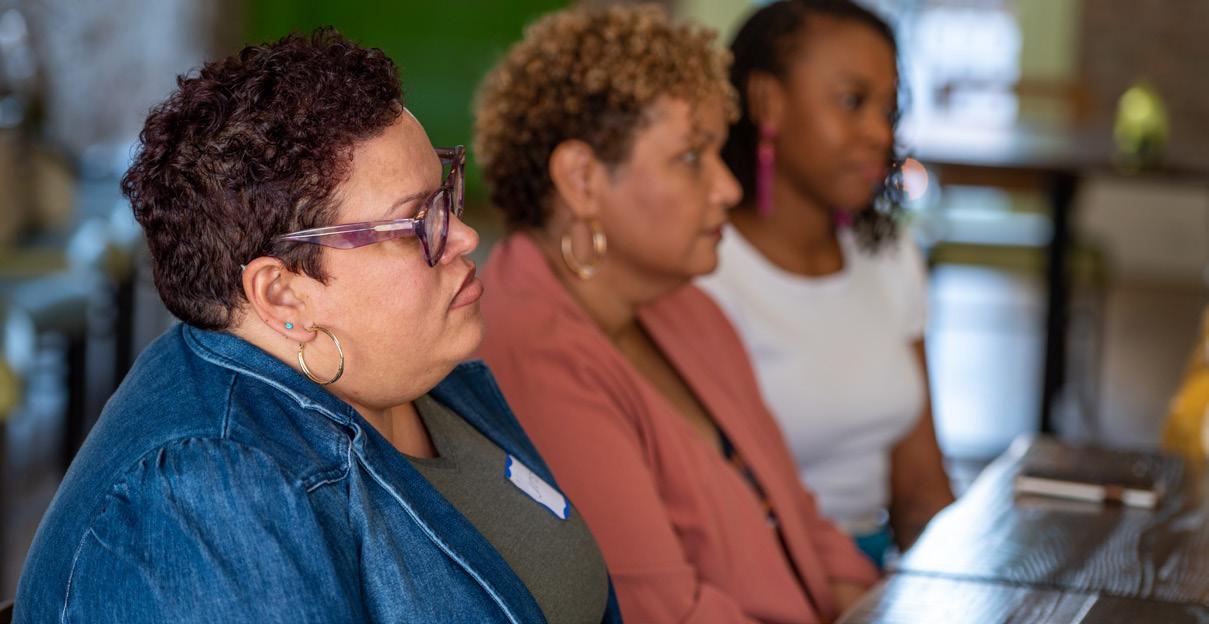
burnout. For many Black women in philanthropy in New Orleans, the deadly pandemic came with an unexpected opportunity. As the world was shutting down, it allowed them to pause, breathe, dream, and reconsider how they work.
Wellness has become a life lesson. There were crises before Hurricane Katrina and in Black communities across the country. Black women in the New Orleans philanthropy community had felt themselves hitting a wall, and they recognized that wellness needed to become a priority.
If the sisterhood of philanthropy in New Orleans wanted to be well, it would individually and collectively have to learn a different way to work or drown trying to save the world. They had to

remind themselves that Black women are not required to push through every trauma in their lives. Too many had seen their colleagues normalize being in pain and trauma, thinking that they had no other alternative but to press forward because so many people were depending on them. Almost every Black woman in philanthropy in New Orleans has experienced a major

health issue. Many admit to breaking down in meetings and sacrificing their personal well-being and family commitments to prove their professional value to others at the office.
Understanding the power of philanthropy and its limits and that it’s not your money can be freeing. For many Black women professionals it can be difficult to separate the work from their personal
lives and development.
New Orleans always seems to be in a state of recovery. Most recently, from Hurricane Ida in August 2021. The ability of Black women to hold their lives together while putting out fires can be worthy of applause, but it is not sustainable. Many New Orleans women have grown up in philanthropy and have simultaneously been divorced, watched their children grow up, parents age and health issues rise. The toll of work, being Black and woman, while living through layers of stress while everyone needs funding often leads to emotional and physical fatigue.
Everything must change. After Hurricane Katrina, there were more grants for wellness for leaders, artists
and women, but it wasn’t always acknowledged that women leaders in community and in philanthropy were in need of care too. There was a lot of joy and pain.
“I’m coming home to myself.”
Carmen James Randolph, CEO of The Women’s Foundation of the South
Today Black women in New Orleans are realizing they cannot serve their communities well if they are not healthy and whole. Putting boundaries in place helps to safeguard their wellness. So many Black women have allowed their work to define their entire identity, but now women in philanthropy are embracing the need for personal and professional coaching and therapy to help them define

exactly who they are as human beings. Black women can’t allow themselves to be another body that white supremacy consumes. This has led to many Black women in New Orleans making bold transitions in their careers and lives to craft a living on their terms.
The network of Black women working in philanthropy often reminds those in that network to be loyal to their divine purpose. When Black women feel validated and
supported, that validation and support can release them to make a different choice about how to create a more sustainable, impactful career. The impact of Black women’s work is deeply connected to personal investments in wellness and mental health. Rest and peace bring clarity to life and to the work.
Covid-19 has been a personal and professional defining moment for how the sisterhood works to serve New Orleans. Christy Ross, in her role as former Director of Maternal and Child Health at Louisiana Public Health Institute, demonstrated to everyone in the philanthropy sisterhood how deeply under-resourced public health issues were even before the pandemic. Her advocacy led a small cohort of women to work together on a strategy across sectors to help fund federally qualified health centers. It was their mission to advocate for citizens based on where and how healthcare was most accessible for marginalized people whether insured or uninsured. Language access barriers were addressed because often communities where English is not the first language are last to be served or, even worse, completely ignored in the city and state. Being a hospitality driven city, funders and community leaders had to finally do more than talk about livable wages and affordable housing. The city of New Orleans was deeply impacted by fewer people traveling and fewer hospitality workers, which meant less money being spent in the city by tourists and less money being earned in the city by people who worked in the tourist industry. Local
elected officials, civic leaders, employers and philanthropists are still grappling with these issues.
The sisterhood bond in New Orleans is strong, but the women’s roles in philanthropy have shifted. Many key leaders during Hurricane Katrina and Covid-19 have transitioned to other jobs. “Everybody has gone on to something greater. We’re not losing ground. It’s a ripple effect and people are taking the work elsewhere to have a greater influence on New Orleans and beyond and to be well,”said Takema Robinson-Llewellyn. Being a part of such a dynamic sisterhood in New Orleans has created a freedom to give one’s self permission to be whole and to pursue her wildest, personal and professional dreams— although it has left some
vacancies in Black women leadership at local levels. Life shifts don’t mean you still can’t do great work.
The collective legacy of Black women in philanthropy in New Orleans can be seen in the investments in community, the creation of new organizations and Black women being positioned from top to bottom in philanthropy spaces. Black women in New Orleans in philanthropy can have different philanthropic conversations within institutions than perhaps their mentors had a decade ago when there were fewer Black women in the field.
“Black women provide covering because philanthropy can
be harmful but the covering also helps maximize resources and gets things done. The covering is important in our personal relationships and in our work.”
Ciara Coleman, Manager, Economic Practice, Equity and Economic Opportunity (EEO) Initiative, The Rockefeller Foundation
These Black women covering other Black women has helped train each other for the work and the battles.
They have kept each other balanced and focused on the real work without getting distracted by agendas or feelings of disrespect. It’s
always about strategy in the work and in the world.
Black women in New Orleans have had to protect one other from outside threats to their work and careers.
National funders have tried to dismantle Black women leadership in New Orleans. From a distance, white people from other cities have tried to dictate to Black women and men in New Orleans what the agenda should be and who is qualified to lead. Black women in philanthropy in New Orleans have had to stay unified to fight for the work and themselves. The experience of Black women in the field has helped emerging leaders identify traps and plots that they may not have seen coming.
The belief in oneself that “I am enough” is tested in
philanthropy daily when it comes to Black women. The thought of partnerships and power that comes from Black women in New Orleans in philanthropy is evident in influencing policy at New Orleans City Hall and the Louisiana State Capitol and in amplifying community voices, issues and holding each other accountable.
More than being united by a common professional interest, New Orleans Black women in philanthropy are family, friends and colleagues whose bonds strengthen the work and the battles they must face.
Not unlike the pain suffered by Black professional women in general, the emotional and professional hurt Black women have experienced in philanthropy runs deep.
Every woman in this work in New Orleans knows the
institutional racism she is up against. On top of that, she has the everyday struggles of balancing motherhood, relationships, health challenges and natural disasters. Sisterhood is necessary for survival.
There’s Always a Way to Win
“Once your values are aligned, you become courageous.”
Linetta Gilbert
Black women’s presence in philanthropy has created expertise and resources that organizations and Black communities didn’t have access to years ago in New Orleans. Hopefully,
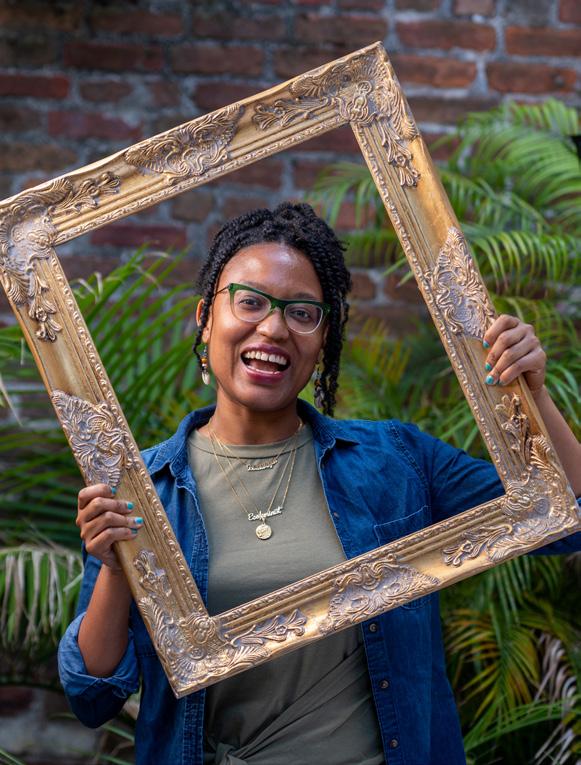
institutions will continue to value the leadership of Black women. The sisterhood of philanthropy in New Orleans is a reminder to other Black women, regardless of their industry, that they are never alone.
Creating trust and vulnerability as a community of Black philanthropists was modeled by mentors in the field. Black women in this field view one another as family and with
responsibilities to one other. Everyone that has been poured into feels a responsibility to pour into someone else. What has been so impactful for many Black women in philanthropy in New Orleans is that it was not only important to care for other Black women, but it was just as necessary to be cared for by other Black women.
Black women in New Orleans have taught and learned from each other and passed on the lessons to others coming behind them. The network of sisterhood processed conflict differently because a sense of family was always at its center. True sisterhood is love and holds each other accountable. The candid conversations of Black women in philanthropy in New Orleans over the years has led to strategies for
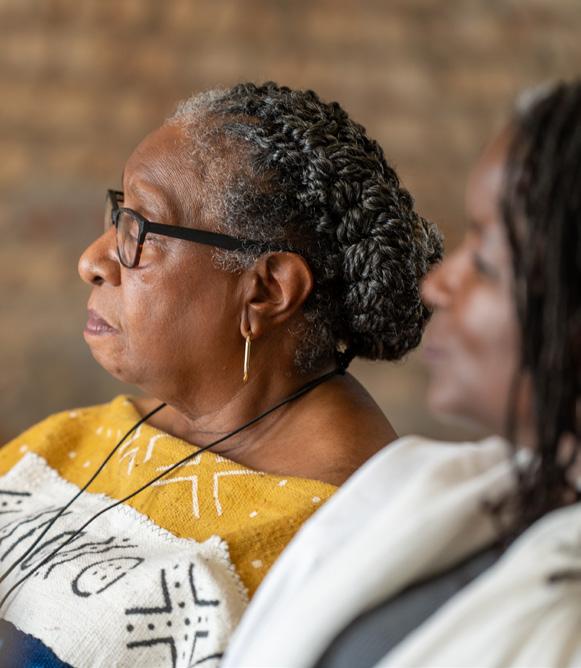
bettering the city of New Orleans and bettering their careers. There is a freedom in being able to curate destiny. This network of sisterhood in New Orleans was not planned, it happened organically. No doubt, this bond in New Orleans is not the norm in philanthropy, but their purpose driven work keeps them committed to each other beyond institutional obligations.
Their wildest dreams are to be free, creative, selfconfident, powerful, unified and properly resourced are not implausible. Black women in New Orleans want to see Black women, girls, organizations, and our communities of color abundantly funded and resourced. They know if they can leverage assets they can produce more than income— they can produce a legacy. By living authentically and boldly, these Black women are modeling freedom for the next generation. It is the hope of the sisterhood that Black women will no longer be a novelty in the philanthropy field. Black philanthropists in New Orleans want to create ways for younger people and
people new to the field that are connected to community and from other backgrounds that may not be typical in philanthropy. New models of leadership are needed to change the world.
Women advise that if you work for philanthropy be sure that it works for you. It’s ok to have a two-fold strategy of building inside of an institution while creating and investing in what fuels your passion. If you must, disrupt and influence internally, but don’t forget how often Black women are treated as if they are expendable. Keep dreaming. Keep building. Keep building your tribe. Always. This world needs the brilliance of Black women now more than ever.
The future of Black philanthropy in New Orleans will be shaped by women
chatting at kitchen tables, sitting on front porches, preaching in churches, protesting in the streets, teaching in classrooms, performing on stages and working with a host of other radical believers in justice, freedom and reparations. The architects for generations to come are on deck to radically change the world.
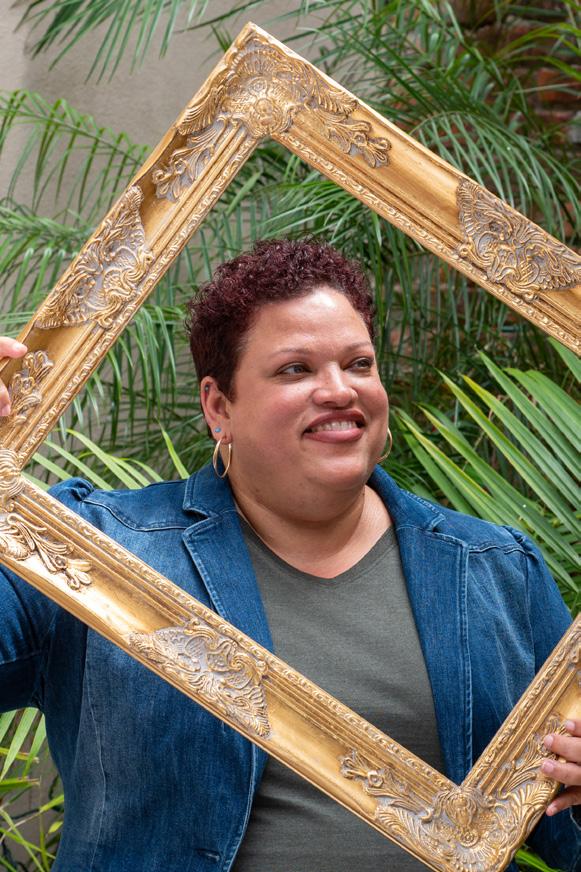
The current sisterhood in New Orleans wants the next generation of Black women in philanthropy to remember:
You are not alone.
Know your value.
Know your worth.
Know your power. Take risks. Do your best in the moment.
Set boundaries.
Have the audacity to believe in yourself and value. You are needed in this moment.
Black women make it happen.
Keep reimagining the world. New models of leadership must be embraced. Live out your true values. There’s always a way to win.
This is our time.
Ubuntu
I am because you are.
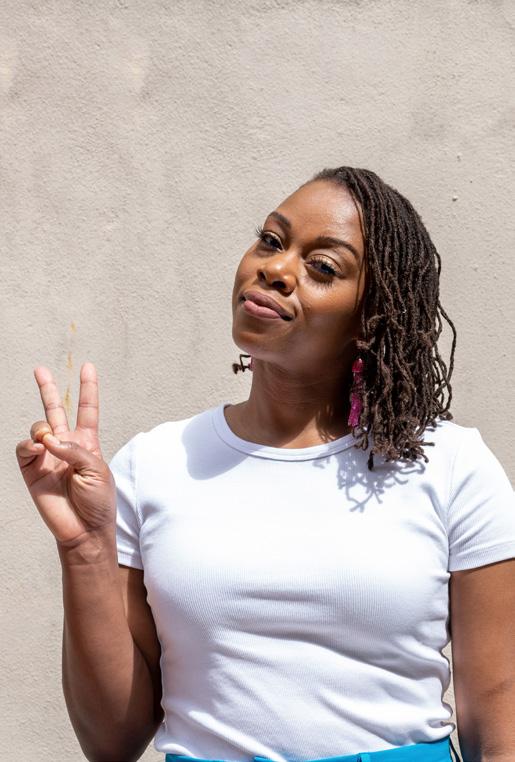

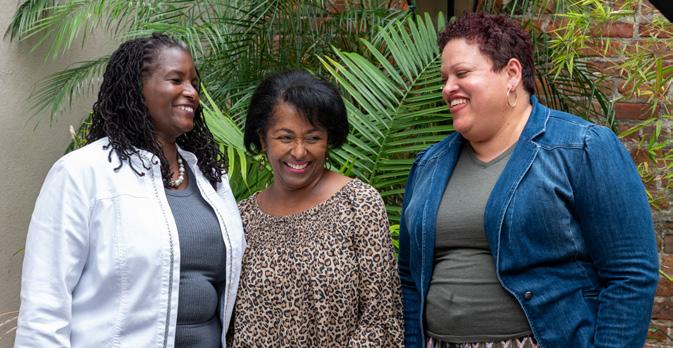
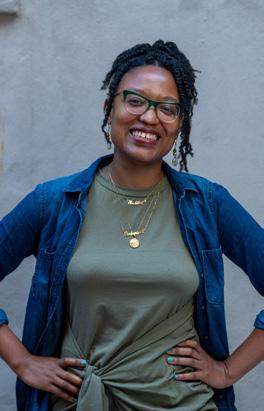
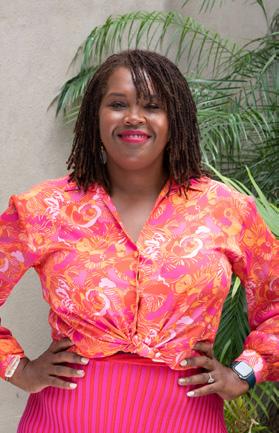

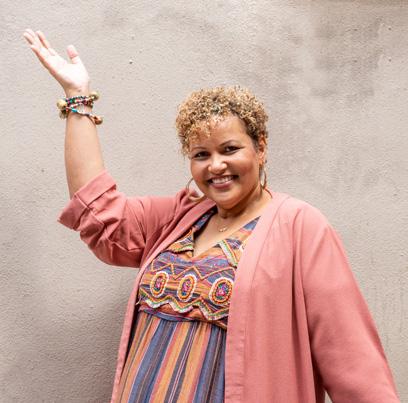
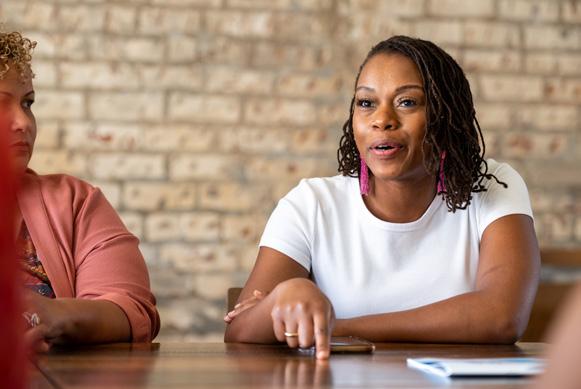
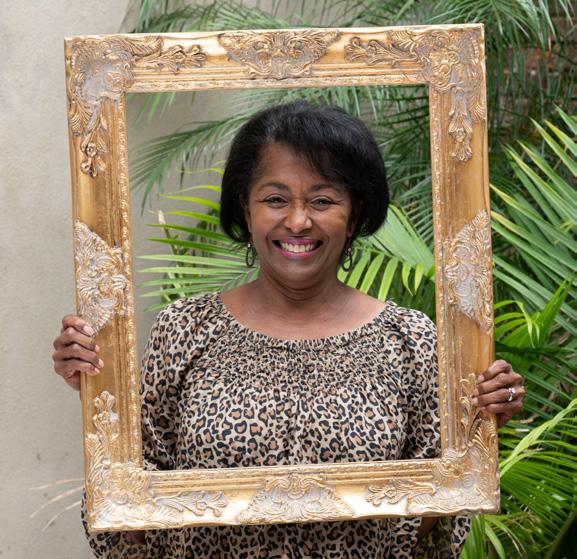
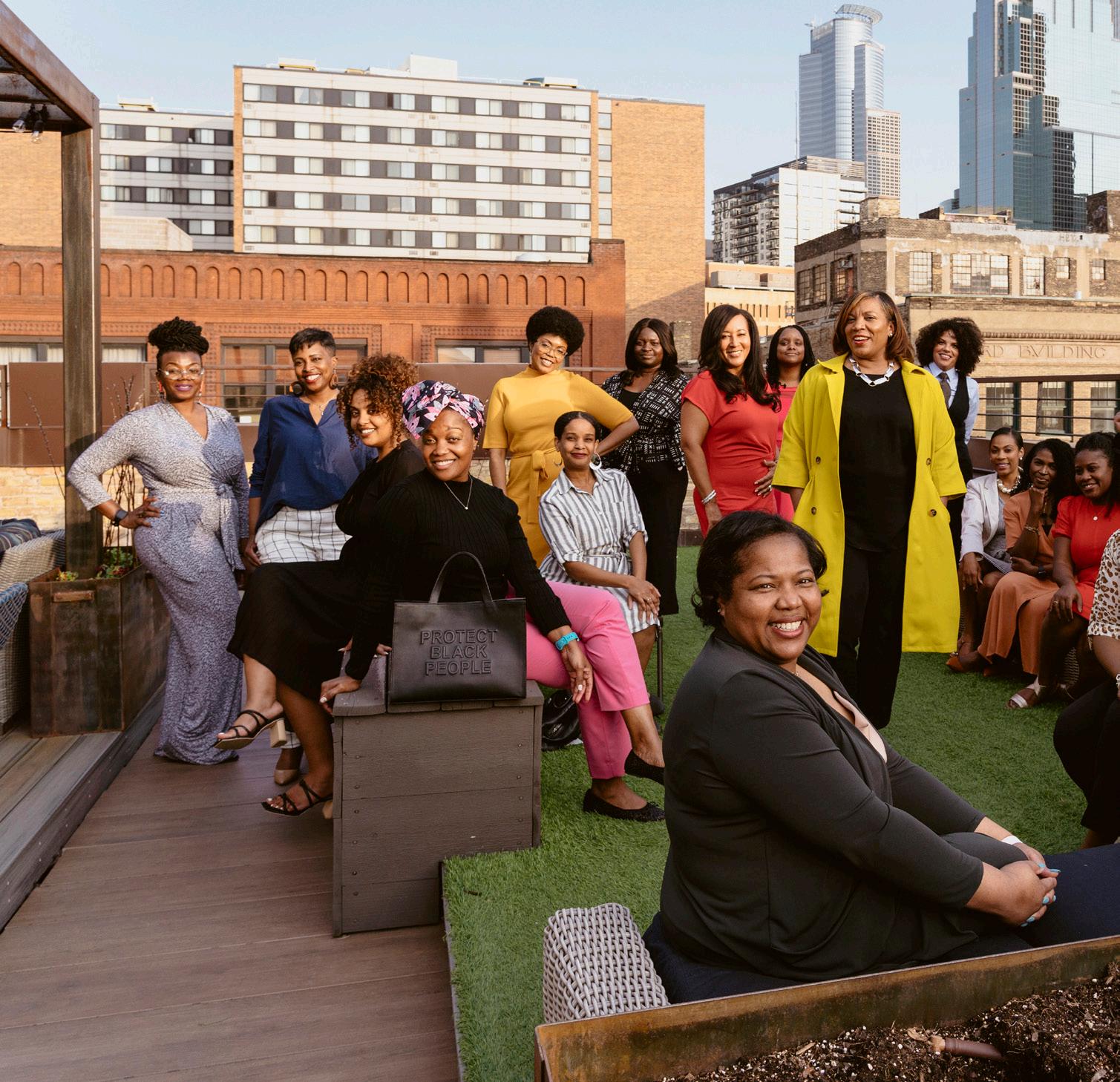

On Wednesday, May 4, 2022, nearly 40 Black women gathered at the Brick and Mortar, a speakeasy located in downtown Minneapolis, Minnesota. Exposed brick, hardwood
tables and tall ceilings helped to create the ambiance that was needed for that evening; the opened rooftop a sign that spring was finally here after such a long winter, the embracing and levity in the space a signal that just maybe the worst of COVID was behind us.
In that room, as the Black women who were present shared exchanges over food and wine, they also came forward to share their personal stories which depicted how they have exercised leadership in philanthropy. Those present ranged from Presidents of some of the largest community foundations in the region, to those newly employed as administrative assistants.Yet, the theme of the evening captured by Lulete Mola, co-founder of the Minnesota Black
Collective Foundation, situated Black women’s leadership and autonomy appropriately when she stated “Black
women are not defined by our roles. We define our roles.”
Mola co-founded the Minnesota Black Collective Foundation along with Repa
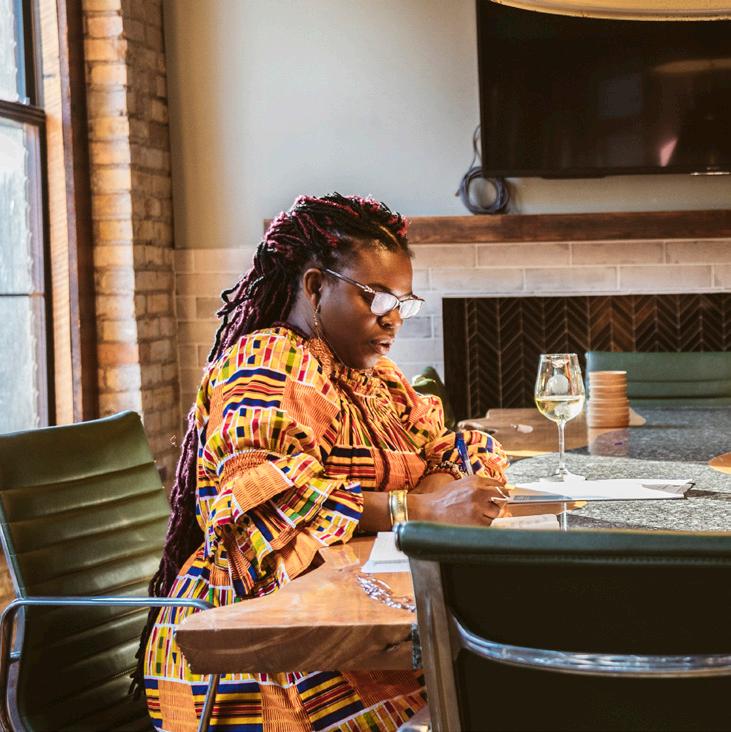
Mekha (Nexus Community Partners) and Chanda Smith
Baker (former Chief Impact Officer and Senior Vice President at the Minneapolis Foundation). Created in the aftermath of the murder of George Floyd, the collective was launched to combat anti-Blackness and center racial justice, engaging a “collective of philanthropic and community partners to effect long-term systems and community change.” Mola explained why this initiative
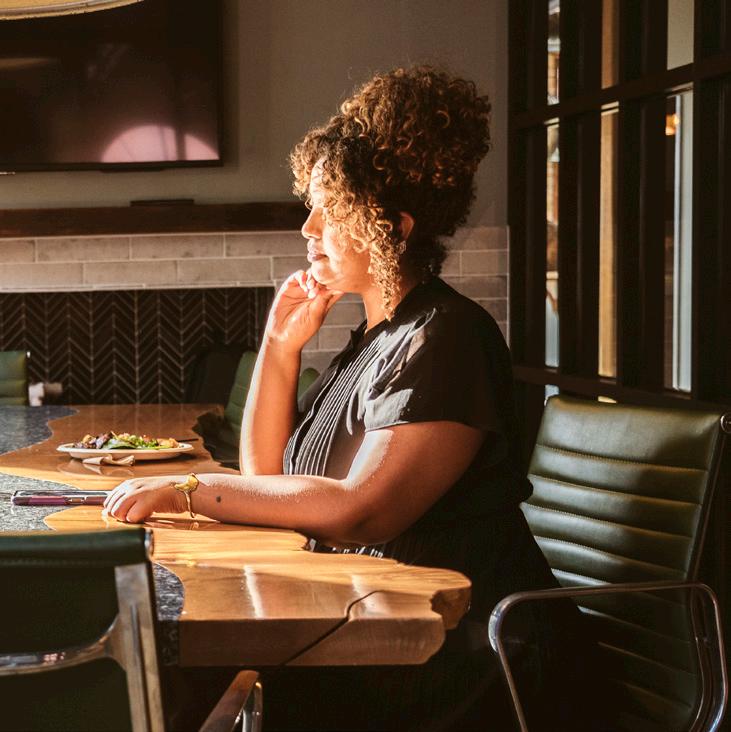
was so important to her stating that “our proximity to issues of racial justice show up continually and consistently.”
The same holds true for other Black women philanthropic leaders gathered that evening. Raichel Brown, who works for a corporate foundation, stated that in her work she felt as if she was at the forefront of advancing racial equity efforts, “doing it in ways that bring our lived experiences to bear.” This posture toward philanthropy is important because it means that the lives and experiences of Black women are crafted in the solutions that are proposed.
The work that Black women in philanthropy do to advance racial justice also reflects a commitment to elevating the voice of other Black women
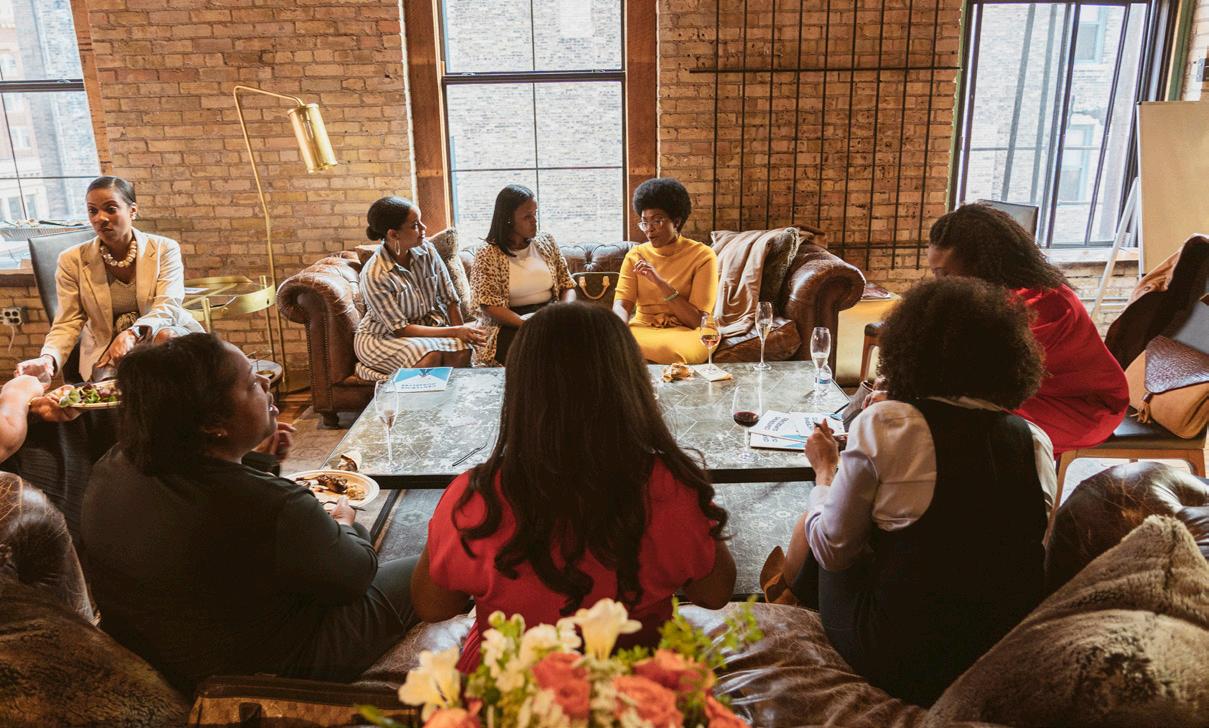
who are not at decisionmaking tables. Cassie Bean, of the GHR Foundation, stated that while funding is important, not everything is about a grant:
“Sometimes
you need
to see someone like yourself reflected in a leadership role.”
As a collective, many Black people are prone to give credit to the people that have enabled them to become who they are today. Ubuntu, a South African phrase that recognizes the interconnectedness of people, I am because you are, is a cultural value that shapes the way Black and African descended people acknowledge the leaders and
mentors who have been a part of their lives. The group of Black women gathered embodied this spirit of Ubuntu in many ways, (re) membering the people who have sacrificially poured into their lives.
For some, one’s own parents and family played a prominent role in nurturing them to success. Acooa Ellis former Senior Vice President of Community Impact with Greater Twin Cities United Way reflected on the value of her family and even her neighborhood in cultivating the person that she is today: “I grew up in a space where I could have gotten into a lot of trouble. I was set aside and protected.” Michelle Benson, Vice President of Marketing and Communications at the Minneapolis Foundation, recounted the influence of her mother, stating that
“I am my mother’s child.”
Susan Bass Roberts of the Pohlad Foundation indicated how her mother instilled in her a sense of independence and pride. “She taught me to believe in myself and not depend on others,” stated Roberts.
Similarly Milpha Blamo, Vice President of Talent and Culture at the Minneapolis Foundation recalled the impact of both her mother and father, and the sacrifices that both made to ensure her success and well-being.
Others acknowledged the value of the oft quoted African proverb “it takes a village to raise a child,” citing the montage of Black women and men who had been influential in their journey.
Cassie Bean, Program Manager of the Racial Equity Initiative at the GHR
Foundation, affirmed this and said that it is “Impossible to pick one single woman. There is a tapestry of women and some men, embodying these characteristics.” Tonya Allen also affirmed this, naming one woman in particular who she stated “set me up as a leader. Carol Goss gave me permission to lead in a strategic way.”
Counting the number of Black women who were inspiration in her own life, Lulete Mola stated,
“where there is a Black woman, there is love.”
Olivia Jefferson reflected on the importance of Black women as mentors as well, recognizing the privilege she has had of so many Black women pouring into her: “My
sister in love came into my life when I was 13 years old. I lost my mom in undergrad and she stood in the gap as a mentor and coach.” She also identified the Black woman who gave her her first job after college as well as the Black women who brought her into public health.
When it came to Black women in philanthropy, Mya Beecham said that her mentors encouraged her not to get stressed out about dominant culture: “Don’t let it get to your head.” Raichel reflected on the words that she was given to deepen her leadership, “Realize your power, don’t give it away.”
Similarly, Chanda Smith Baker shared that she was encouraged to “Be Bold and know that you alone may be the only one in the room…so be bold.”

Inspired by the ways that Black women have impacted their own lives, those gathered in the room also reflected on the advice that they would give to their younger selves as well as the next generation of Black women philanthropic leaders. Chanda spoke to
the importance of telling her younger self to hang in there in spite of the obstacles that would be encountered along the way.
“Keep the light burning, no matter what”
she said. Michelle illustrated the importance of slowing
down instead of rushing to keep up with others or feel a sense of false accomplishment. “My first job was so fast paced. I needed to slow down and take it all in,” she stated.
“I would also tell my younger self to know my value and worth. To speak up when I am at the table.”
There is enough room for everyone.” Similarly, Stephannie Lewis, Associate Vice President of Community Impact at Greater Twin Cities United stated the value of slowing down: “Relax, it will happen. In rushing, you make temporary decisions that have long term consequences.”
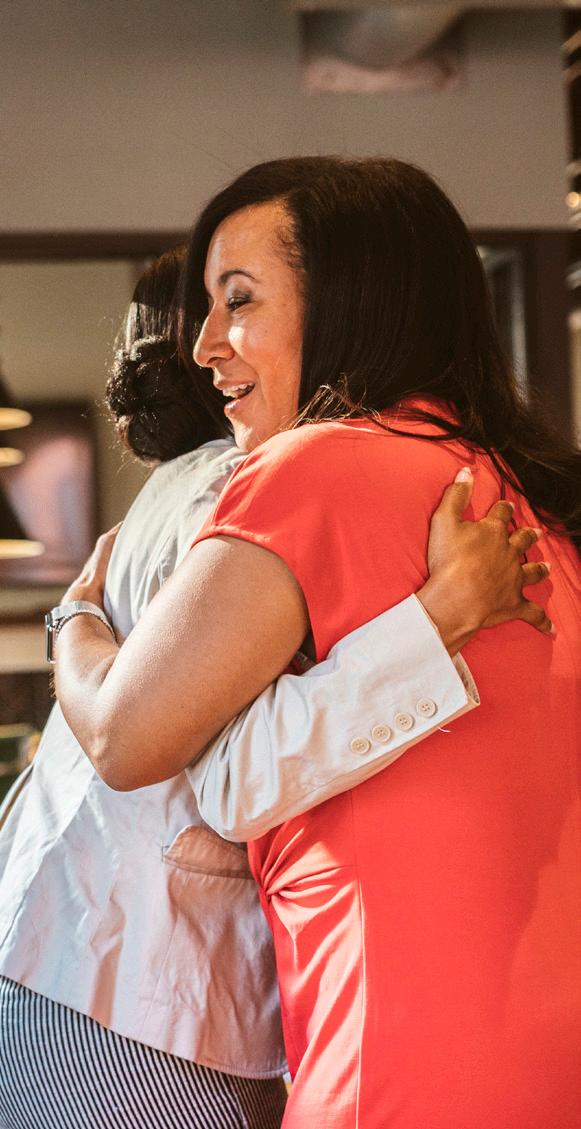
LaToya Burrell of the Anderson Foundation stated how she would encourage her younger self to understand the power and value of community, and to acknowledge the importance of networking and community resources.
Maya shared that she would tell her younger self to focus. “Focus on the right things,” she said. “Be responsible for your own education. Get rid of foolishness. If I knew back then what I know right now, I would be more laser focused.” Susan stated that she would encourage her younger self to tap into the things that she was most passionate about: “Figure out what moves you and what your purpose is. Move toward that and don’t let fear be a motivator.”
Offering words of encouragement to the next generation of Black women in philanthropy, Tonya Allen, President of the McKnight Foundation, offered poignant advice for Black women aspiring to be in philanthropy sharing that they can leverage to rewrite the rules.
“We have the power and the ability to rewrite the rules… We reshape institutions by rewriting the rules,”
she said. To this, Stephannie emphasized the importance of staying curious in one’s work: “Ask questions, don’t make assumptions. Curiosity will lead you to the solutions.” LaToya cautioned that it can sometimes take a while for the work that we do to pay off. She said, “You
plant the seed and may not be able to enjoy the shade.”
At the same time, she acknowledged the importance of building on the work that has already been done to improve the future.
Cassie similarly advised that we cannot “measure success based on snapshots. Things rarely happen from A-Z. Like our ancestors before us, plant the seeds.”
Acooa, speaking from her own professional and lived experience, articulated the value of Black women in
philanthropy first having experiences in direct service.
For her, the experience would give people a better understanding of the ways that philanthropy shows up in the lives of people and places.
The sisterhood, or network of Black women in philanthropy

is not just for aesthetics. Going back to the principles of Ubuntu, the sisterhood is important because it will take a village to move Black communities forward.
Tonya stated that the reason why the sisterhood is important is because of the way that Black women lead. “The most significant movements in racial equity have Black women associated with them,” she said.
“Black women are leading in innovative ways, diversifying and increasing investments for organizations of color.”
Similarly, Lulete shared that community building is critical for Black women in philanthropy because it is a strategy that leads to greater impact in the field: “We are more impactful in moving resources when we have each other, it is harder when we don’t have community.”
Susan felt that Black women in philanthropy as a collective represent people that she can turn to for help. “It is different than other Black women friends who are not in philanthropy,” she said. “We are talking about race at work daily, we need to have a squad who can lift us up when doing the heavy work. After George Floyd was murdered in the middle of COVID and we couldn’t gather. It was a time that was so heavy for all of us. For us to come together was medicine for the soul.”
For Olivia, the sisterhood is important because of the ways that Black women are marginalized in other spaces. “Our perspectives are often tokenized,” she said.
“The sisterhood understands and affirms us which is why there is a need to create safe spaces to talk about our own. And when we don’t have each other’s interest at heart, we can harm each other.”
Acooa also stated that “working in spaces that don’t center Blackness can be exhausting. We need people
around us who understand what it means to navigate white spaces in a Black female body.” But Acooa also offered words of caution in creating these spaces for Black women: “We need to support and affirm each other quietly because folks get nervous. So much of what we are doing involves moving resources. People get suspicious when moving the status quo.”
In spite of the barriers that these Black women have encountered as leaders in philanthropy, it is clear that their commitment to each other and to advancing equity in Black communities is a motivating factor in their work. Still, it is imperative that the philanthropic sector not only support Black
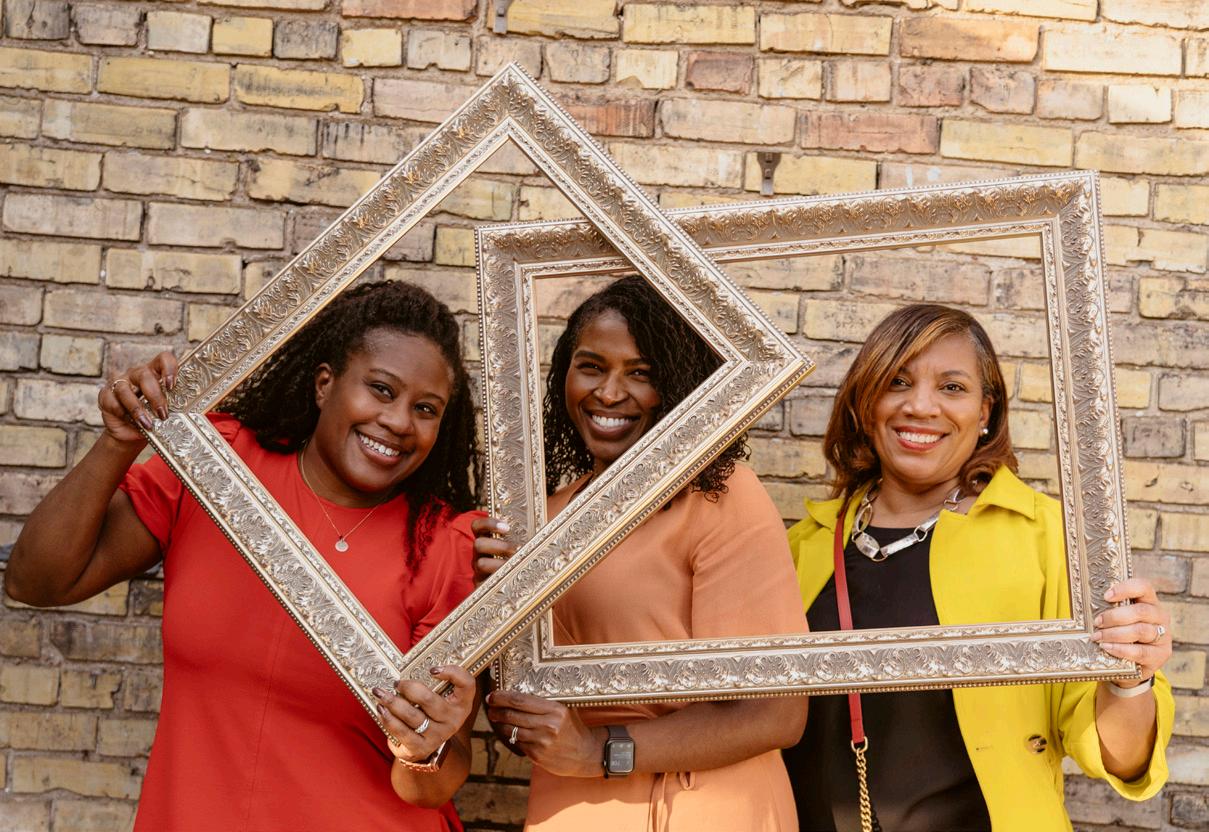
women’s leadership with lip service but place resources on the table to grow their leadership, strengthen their networks and sustain their emotional and physical well-being. Black women, though immensely powerful, cannot do the work to right the wrongs of white supremacy in isolation and need accomplices in the field, as well as outside the field, to ensure that their visions
are not only accomplished but sustained over the generations.

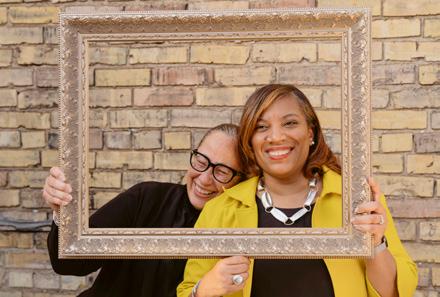
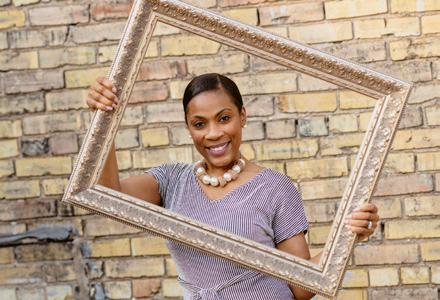
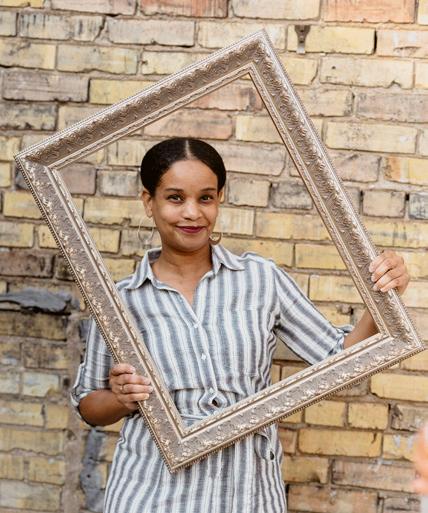
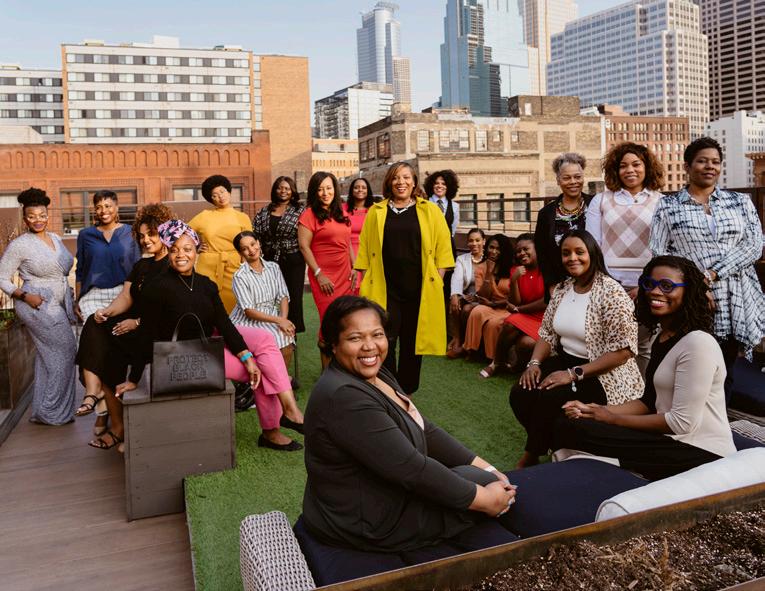
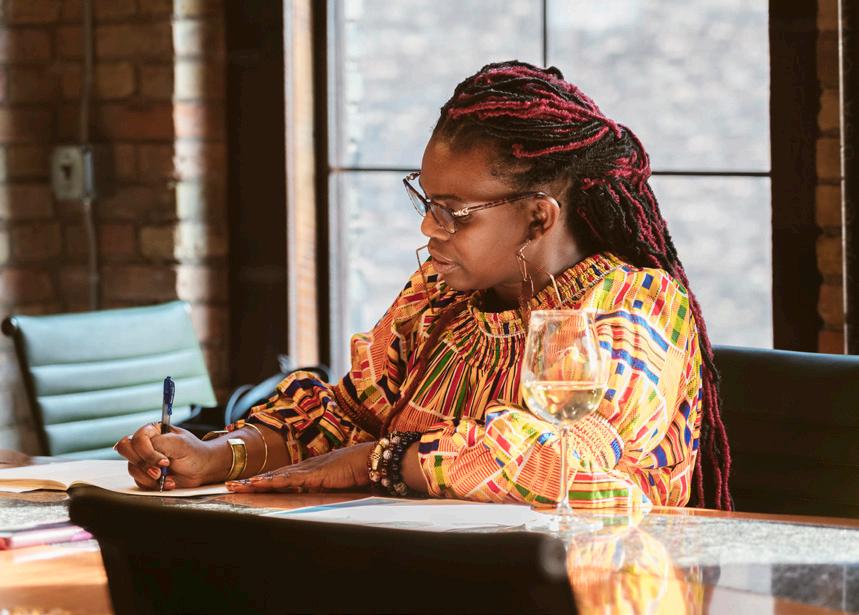
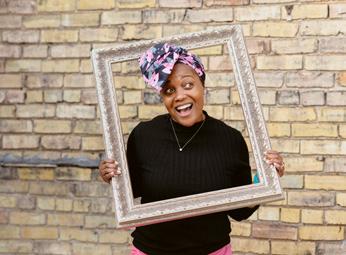

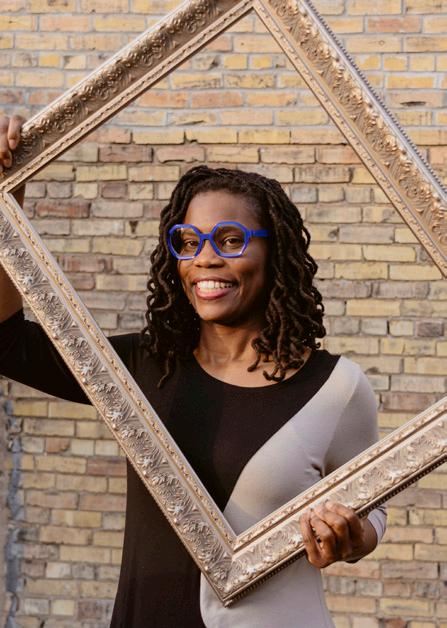
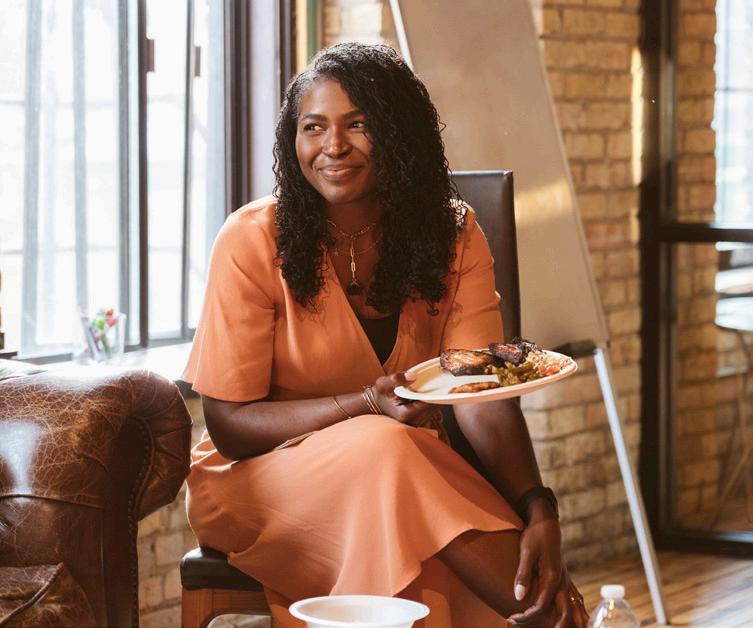

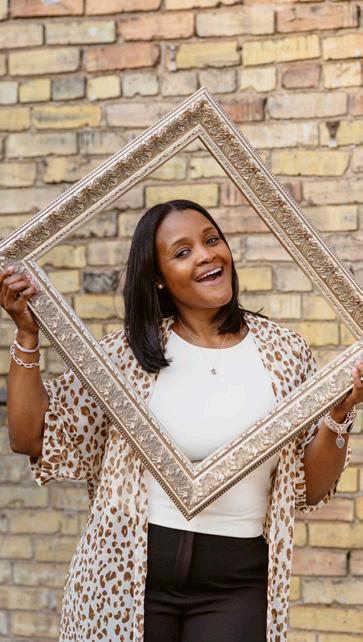
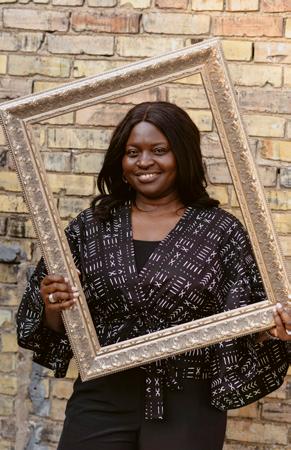
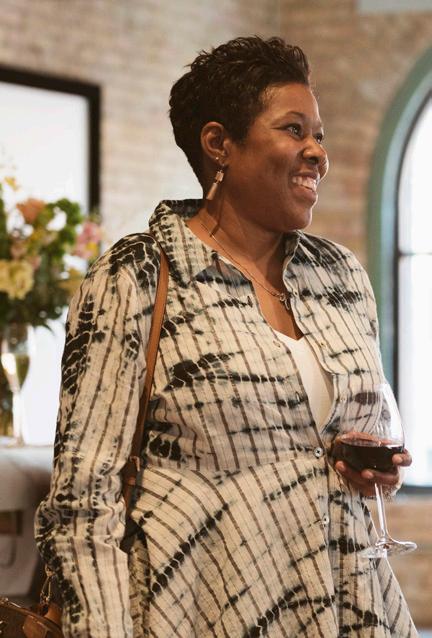
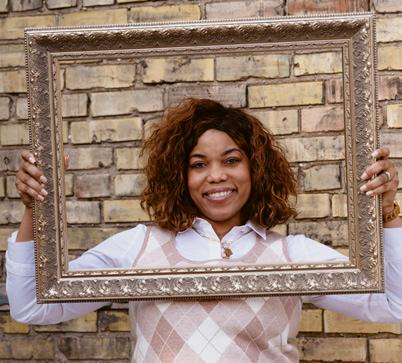
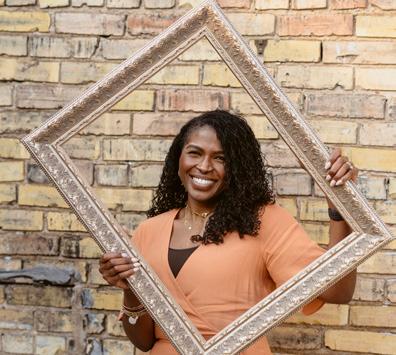
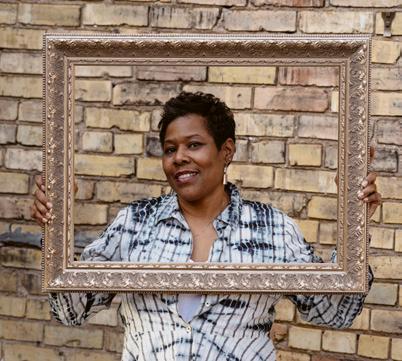
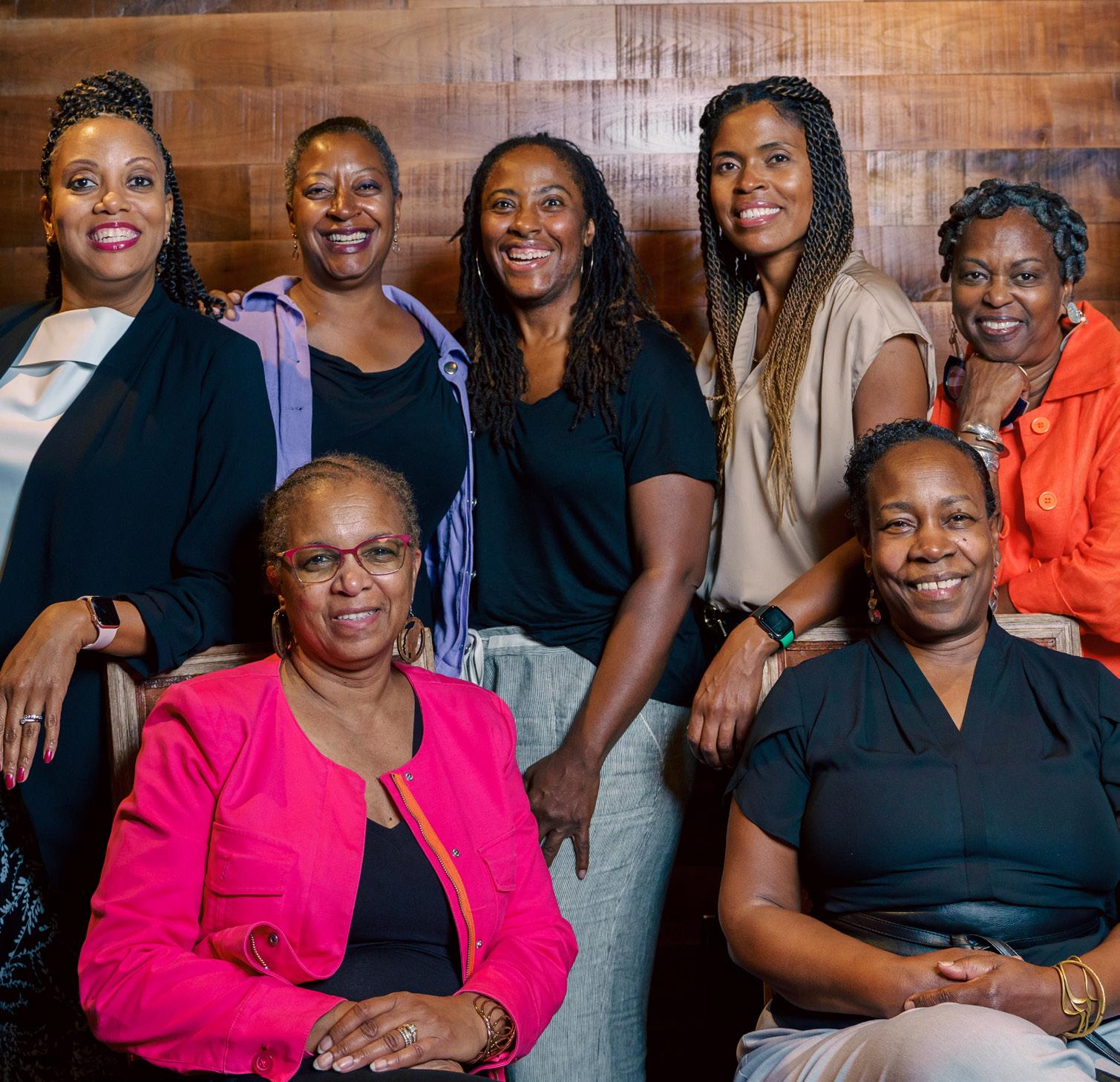

When it comes to Black women in philanthropy, no city in America is doing it quite like Chicago. In 2022, nearly two dozen Black women CEOS in philanthropy, government and business gathered at
the home of Coleman Foundation CEO and President Shelley Davis, according to an article in Crain’s Chicago Business. The gathering was so large, wrote journalist Tatiana WalkMorris, that introductions alone took three hours.
Such gatherings aren’t uncommon when it comes to Black women. For centuries, we have gathered around tables sharing stories, sharing wisdom, sharing recipes. And the night of August 17, 2022, was no different. On this night, nine women—members of Chicago’s flourishing Black philanthropic community— gathered to do just that for the purposes of this book. There were laughs, reflections, gratitude and, of course, a delicious meal served at none other than
Taste 222, the storefront showcase of Cleveland Headquarters, a venture capital and consulting firm fronted by one of their own— Liz Thompson, a prominent philanthropist in her own right.
In addition to the Cleveland Headquarters, Thompson is founder and president of the Cleveland Avenue
Foundation for Education Group, named for the Chicago street she and her husband, Don Thompson, grew up on. Coming up in Chicago’s Cabrini-Green neighborhood, Thompson maintains that giving back was a “bedrock” value in her household—it was part of her DNA.
The same can be said for many of the women gathered here and in the Black community at large.
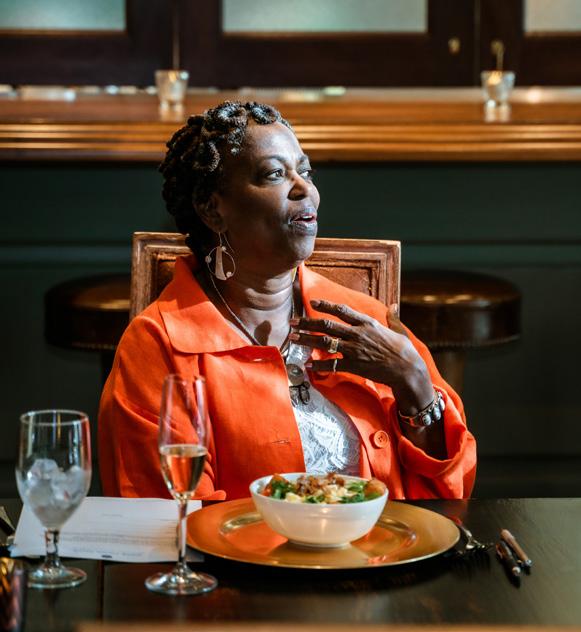
According to a 2012 report from the W.K. Kellogg Foundation and Rockefeller Philanthropy Advisors, “each year...Black donors give away 25 percent more of their incomes than white donors.” You can see it in our churches, in our community centers and our schools. Simply put, Black women are the backbone of modern-day philanthropy.
On that August evening, however, these women are able to set their capes aside for a few hours and focus on
lifting up each other over good food and even better conversation. But they didn’t always have a seat at the table.
Aurie Pennick, the first Black woman executive director and treasurer of the Field Foundation of Illinois, Inc. from 2004 to 2016, remembers a time when Black women weren’t as prolific in Chicago’s philanthropy scene. Born and raised in Chicago, Pennick never saw philanthropy as a goal because she didn’t see any Black people, let alone Black women, in the field when she was younger. She was working her way through law school when she began her career in philanthropy at the Chicago
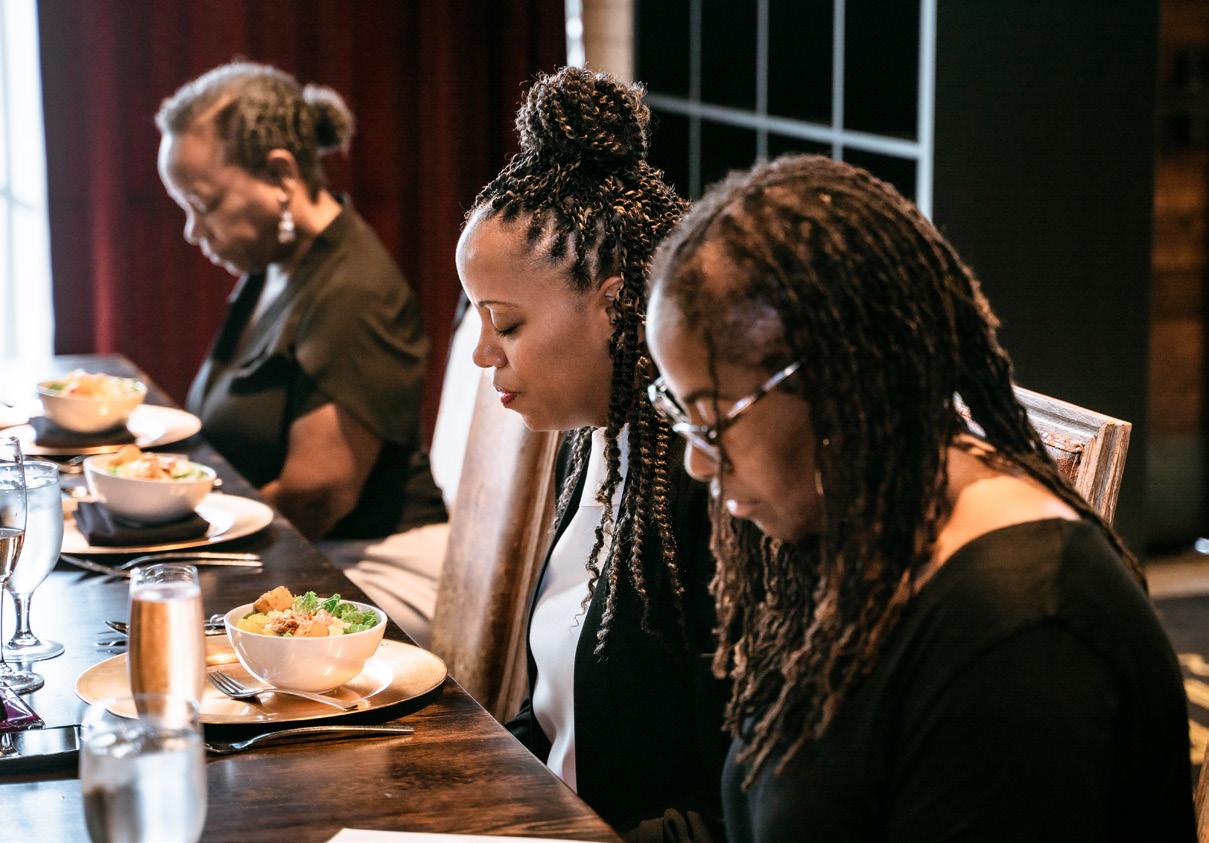
Community Trust as the third Fellow and first female in the Trust’s Minority Fellowship Program. The rest, as they say, is history.
Pennick would go on to lead several nonprofit organizations, including the founding Executive Director of the Greenhouse Shelter, the city’s first battered women’s shelter, and then later the president and CEO
of the Leadership Council for Metropolitan Open Communities, the nation’s only fair housing organization founded by Dr. Martin Luther King, Jr in 1966. But oftentimes, she was the only Black woman in the room.
“What Chicago Blacks in philanthropy stood for in the mid-’80s was more Black people and people of color on boards,” recalls
Pennick. Over time, that representation increased to what it is today. In 1998, nearly 100 African American people in Chicago’s social sector gathered under Deborah Harrington and Timothy Russell’s leadership to create Chicago African Americans in Philanthropy, an organization that is still going strong to this day.
“Chicago has, for me, a great history of Black women leadership. So seeing Black women in Chicago and Illinois having this strong representation in philanthropy
means a lot to me because it also means it worked. It’s part of what the sisters and the mothers who fought the fight for Black women to be leaders in all roles of society wanted,” said Pennick. “It makes me feel honored and very respectful of not only the women who are leading now, but of the women who came before them, such as Dr. Adrienne Bailey, Dr. Arnita Young Boswell and Rev. Willie T. Barrow, and other Black women who fought for us to be in these positions.”
Fast forward to present day and our dinner begins with a meditation on the South African phrase, ubuntu, meaning “I am, because you are.” The women go around the table and share who has helped them become the person they are today—a nod to the past and an offering of gratitude.
“I am because Amina Dickerson paved the way,”said Deborah Bennett, senior program officer at Polk Bros. Foundation, an organization dedicated to building and strengthening Chicago’s families and communities, especially those most affected by poverty and inequity. “And Sharon Bush, Janice Dunbar, Toya Nash Randall walked with me along the way.”
“I am because Nicole Robinson told me I had to lead the African American Leadership Council at Chicago Foundation for Women,” reflects Monique Brunson Jones, president and chief executive officer at Forefront, Illinois’ statewide association representing both grantmakers and nonprofits.
“I am because Deborah [Bennett] and I have walked paths together for many years in philanthropy and I have followed her leadership,” offers Sharon Bush, president of Grand Victoria Foundation, an organization whose mission is to build a strong, livable and equitable Illinois for every resident. “I would also include I am because of Aurie Pennick, who has just been an unconditionally positive supporter who would reach out unsolicited to ask, ‘How
are you doing? What do you need? What do you want to do?’”
“I am because of Linda Harlan,”said Jane Kimondo, executive director of Crossroads Fund, which supports community organizations working for social and economic justice in the Chicago area. “She took a chance with me at Chicago Foundation for Women as an intern and I never left.”
“I am because I partnered with Deborah and Sharon in the leadership of CAAIP (Chicago African Americans in Philanthropy] many years ago,”said Janice A. Dunbar-Travis, senior grants manager at the MacArthur Foundation, which supports creative people and institutions in building a more just world. “My involvement with CAAIP has led me to stay in this field for as long as I have.”

“I am because of two people,” starts Tovah McCord, executive director of Northern Illinois Community Initiatives, a foundation established by Nicor Gas. “One is my sister, who has been there for me through many career transitions and also introduced me to Angelique Power. She has truly supported me and I literally would not be where I am without Angelique
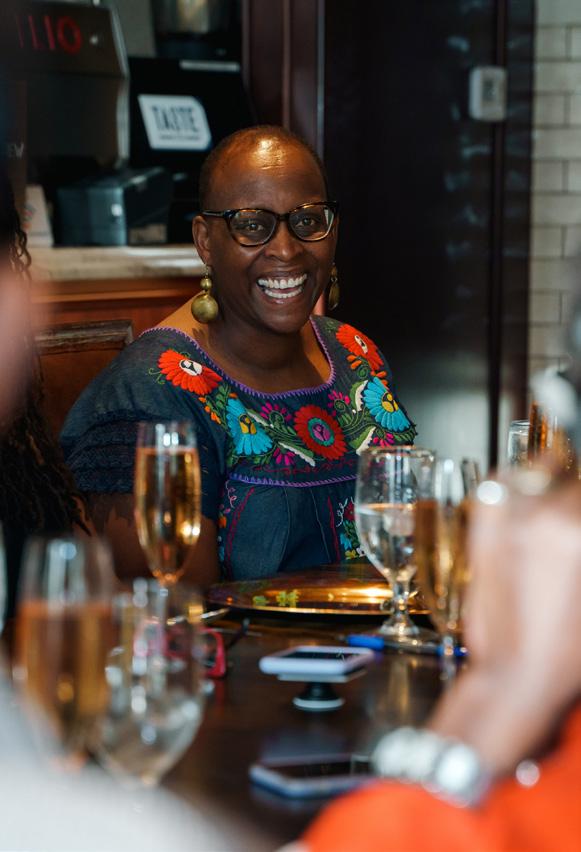
because she helped me get the role that I have now.”
“I am because of a woman named Peggy Cooper, later Peggy Cooper Cafritz. She created something extraordinary in Washington, D.C.,”said Amina Dickerson, Lloyd A. Fry Foundation trustee and former President of Kraft Corporate Foundation. “It was my first exposure to seeing women lead, women create, women serve and to understand the world of philanthropy because of the money they raised so all of these little Black children in Washington could be paid to do the arts over each summer that I was there as a teenager.”
“I am because of my dad, Milton Davis, who served on the board of the Field Foundation and the board of the Chicago Community Jane Kimondo
Trust when he was either the only or one of very few Black trustees,”said Davis, president and CEO of The Coleman Foundation, which invests in the efforts of community-based organizations and local institutions preserving the physical, economic and emotional health of people in the greater Chicago region. “And I am because of Handy Lindsey, who hired me as an intern when he was CEO of the Field Foundation and supported me in going to New York and working for the Ford Foundation. The rest is history.” Voice. Vision. Values founder Toya Nash Randall even felt compelled to join the conversation.
“I was in a room with Deborah Harrington, Amina, Cleo Wilson, Nicole Robinson and Aurie Pennick. And they talked about what they had experienced coming up through the ranks and it was so similar to what I was experiencing at the time and I was like wait, so this happens to everybody all the time? That opened up my head and my heart in a way that I didn’t know was possible. So I sit here today because they were so candid, honest and vulnerable in talking about their journeys. It helped me understand what was possible and to not buy into the false narrative.”
Later, via email, Heather D. Parish, executive director of The Albert Pick, Jr. Fund, which supports furthering social justice in Chicago’s under-resourced neighborhoods,said: “I am because of God’s grace; my resilient Black mother who modeled independence and
success under challenging circumstances; and various mentors / sponsors who provided clear, loving guidance and support throughout my life’s journey.”
It’s easy to look back over the course of your career and identify the highs and lows. After all, hindsight is 20/20. So it was interesting to note the advice the women said they would give their younger selves—advice ranging from taking risks to fully stepping into leadership positions.
“A lot of times I’m the background person,” explains Dunbar-Travis. “I can help everyone else on their path and hold everyone else up, so
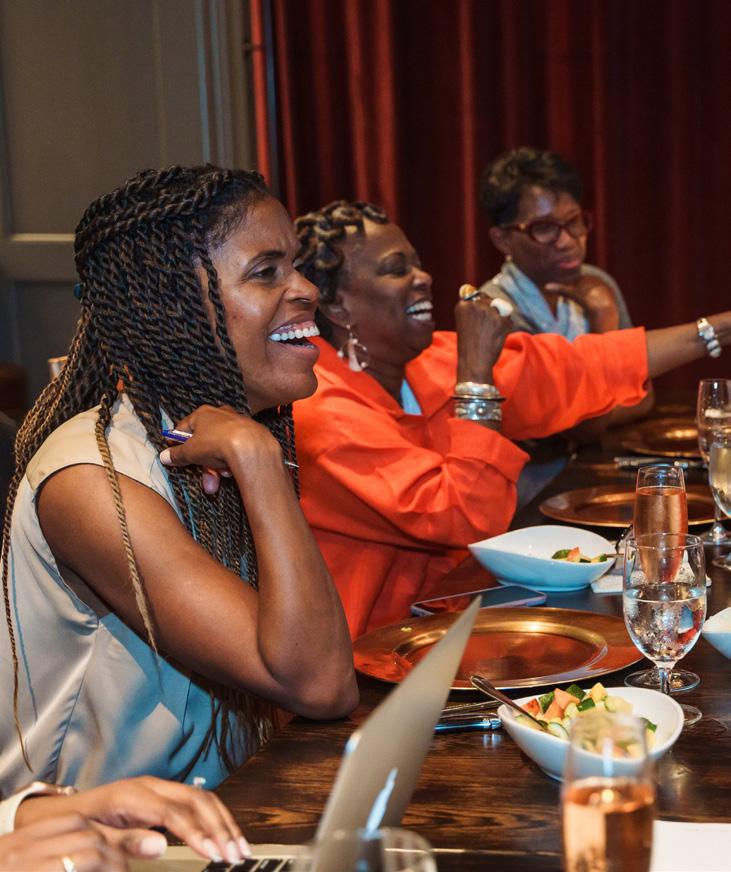
I would have told my younger self to take a chance on myself and move up. I think I could have made a difference in a lot of other people’s lives had I taken a leadership role and I’m still battling with that.”
Meanwhile, Dickerson said she would’ve told her younger self to lean more into courage: “I wish that I had had more courage to

experiment more and step out on possibility more.”
But Bennett insisted she was inspired by the courage Dickerson had already displayed. “That gives me courage because I consider you bold,” shares Bennett. “My negative self-talk is that I haven’t been bold enough and I’m not courageous. I am comfortable explicitly talking about race now, but I wish
that I was there 20 years ago when I started in the field.”
Reflecting on her experience, Bennett said she wasn’t sure that her talking more openly about race would’ve been well received earlier in her career. “I felt I had to establish myself within my organization,” she said. “I had to make sure my write-ups were impeccable and there were no grammatical errors. It took a while to establish myself and then I felt more comfortable taking those risks, but then it took even a few more years before I talked about race.”
It’s a phenomenon Black women across the country are all too familiar with— the notion of having to work twice as hard to get half as much as our white counterparts. The motto was even depicted in the season three opener of Scandal,
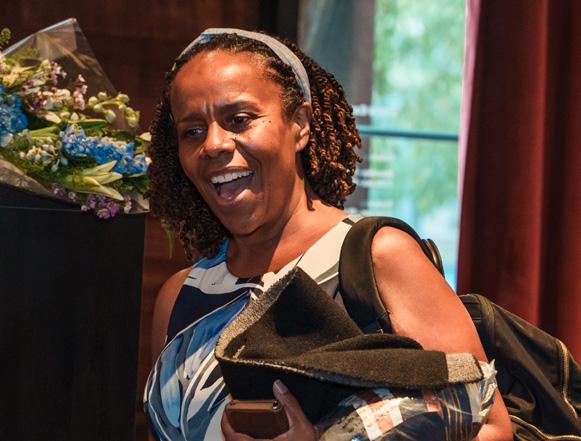 Liz Thompson
Liz Thompson
Shonda Rhimes’ popular political drama, during which Papa Pope (played impeccably by veteran actor Joe Morton) reminds Kerry Washington’s Olivia Pope she has to be “twice as good as them to get half of what they have.”
The women also agree that times were different 20 years ago—before the so-called racial reckoning of 2020 in the aftermath of the killing of George Floyd—and openly talking about race wasn’t as well received.
“I’ll never forget the meeting where I heard somebody white talking about white
supremacy and I almost fell out of my chair,” remarks Dickerson.
“So I would say courage is also showing up prepared, ready and able to defend without having second thoughts about am I good enough because I have done my work.”
To that, Bush said says she wishes she had learned to have more self-confidence earlier in her career. “So much of my experience was drawn from my own lived experience and so much of what I would experience
in philanthropy would go counter to that,” she explains.
“But I knew that there was something about the things I’d experienced that was relevant to how I could have an influence on how resources were distributed.”
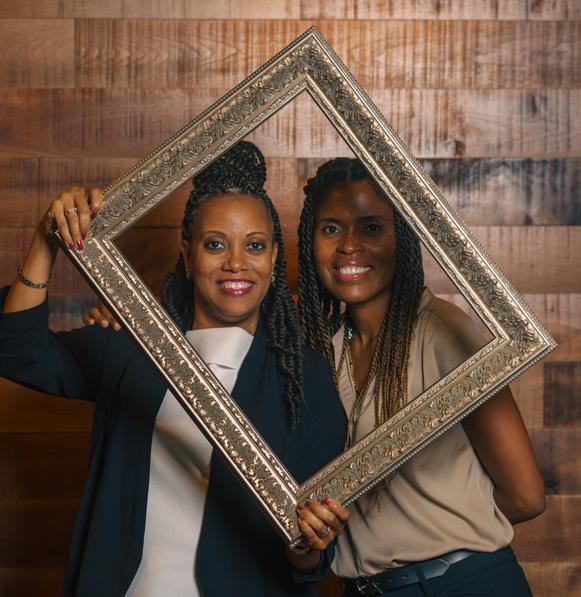
In the beginning of her career, Bush realized she didn’t lean into that experience more and she was being pushed to focus on perfecting her write-ups, even though she knew she was a great writer. “It takes me away from these other things that I intuitively know matter,” she said.
She points to the ABFE fellowship that led her into community with other Black women in philanthropy and helped her lean further into her expertise and experience, “The fellowship helped me remember that the reason I’m in the room is because of all the stuff I’ve been through,” Bush said. “Whether that was explicitly in the hiring process or not, implicitly that is the reason and so I’ve learned to continue being more comfortable relying
on that different intellectual knowledge or technical expertise, but also the Blackness. That’s who I am.”
The community-building aspect is crucial not only with each other, but allies as well. Earlier in her career when Brunson Jones was the director of programs at Chicago Foundation for Women, she would sit
opposite her CEO, K.Sujata, during important meetings.
“We did that intentionally because we would possibly be the only two women of color in the room,” Brunson Jones recalls.
“I wish I had told myself to own it rather than feeling
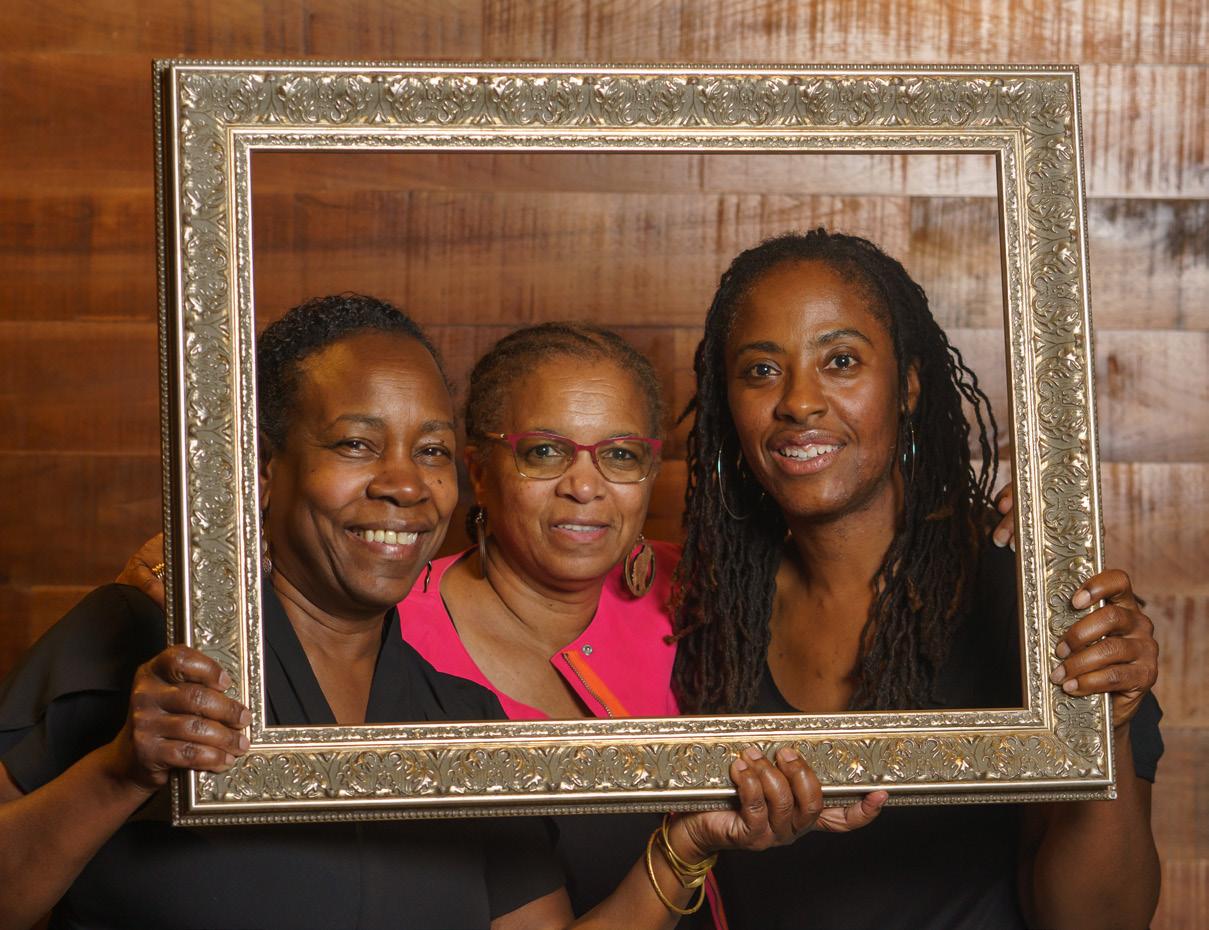
inferior. I wish I had owned the fact that I would be one of the only in the room earlier in my career. And instead I spent a couple of years feeling like my voice was stifled or not important, or just wrong. That it wasn’t enough. That confidence is hard to come by early in your career.”
Being the only one in the room was and still is the norm for many of these women.
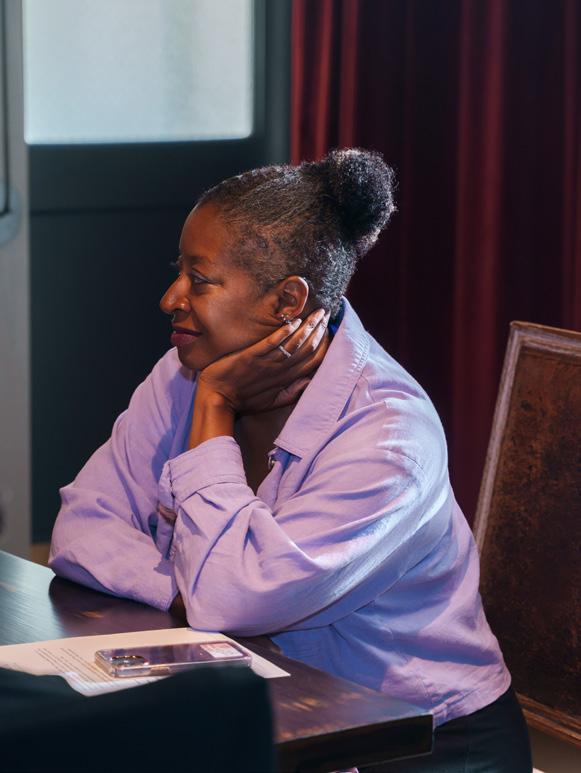
As Dickerson shared with the group, there was not a professional environment she was in from the start of her career until 30 years later where she was not the only person of color at the table.
“So that was my norm,” she said. “How you showed up, how you dressed [it mattered]. But it was because of my family—I was raised with a mother who was fierce so I had the courage and I always felt prepared
that I was going to fulfill my role, my duty at that table.”
“I hope and pray that there will continue to be young Black women who look to philanthropy as a major helm of empowerment,”
said Pennick. “And not just on staff, but on boards as well. Board leadership is an essential part of leadership in philanthropy.”
And for future generations of Black women in philanthropy, Pennick wants to make it
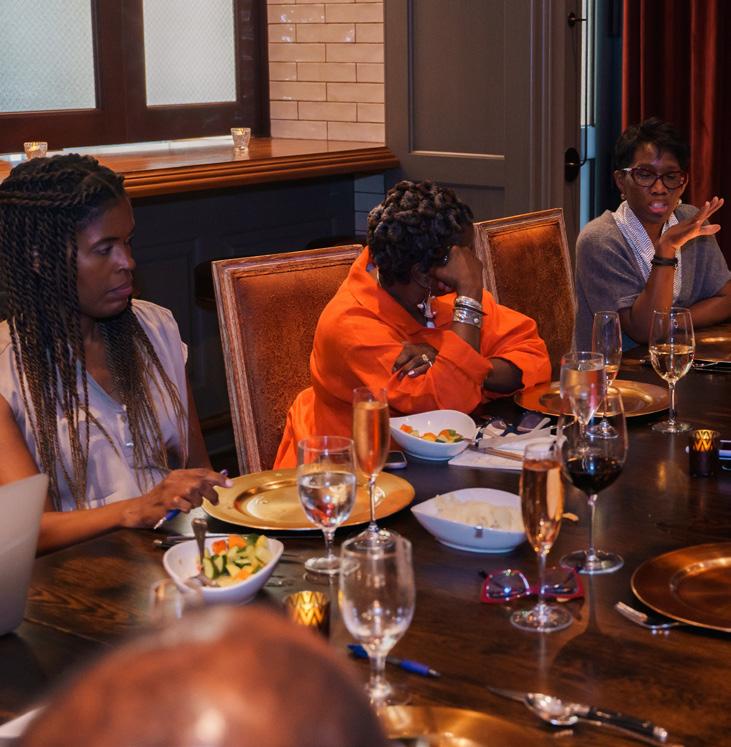
clear that they’re not just following in the footsteps of the women who came before them—there are women here today who have their back.
“It’s not just about standing on somebody’s shoulders, because you’re going to fall off those,” she said. “It’s about ensuring that people understand and have your back when you’re making that effort. Take the first step, because that first step can be the big step toward
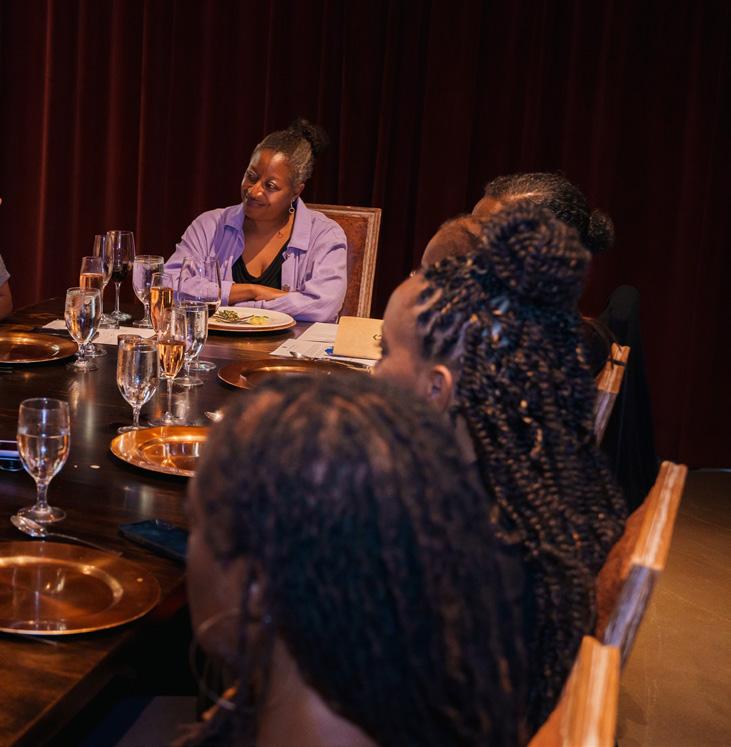
the next step.”
Pennick also encourages future generations to look back, learn from the past and also lean on the women who are still here and eager to help. “Some of us are still around,” she said, “and we have your back.”
Which brings us back to this table at a restaurant in Chicago’s West Loop neighborhood. A table full of Black women in philanthropy
giving back the best way they know how. Black women work tirelessly every day to make their corner of the world a better place. Black women who know first and foremost that their allegiance is to each other and this sisterhood is sacred. Black women who lift up and shine a light on other Black women. Black women who are bold, beautiful and brilliant.
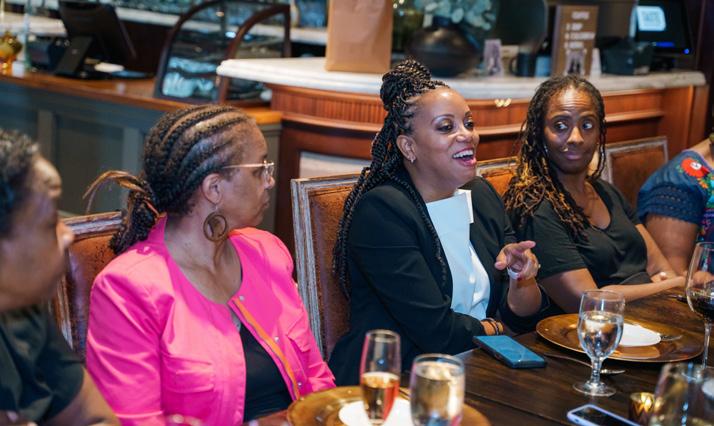
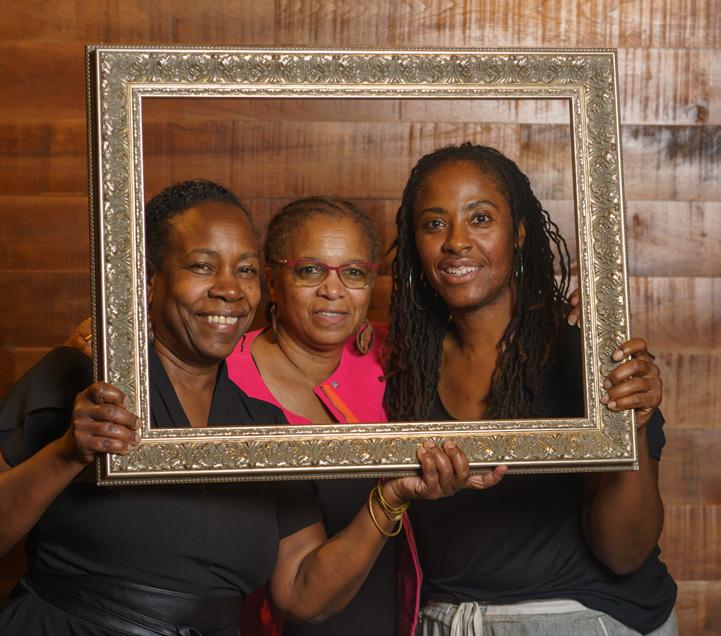
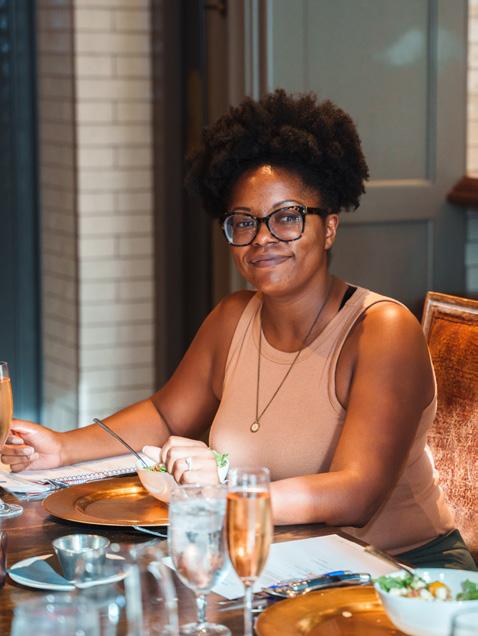
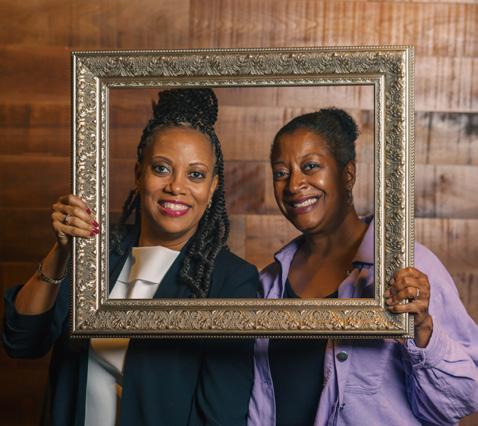
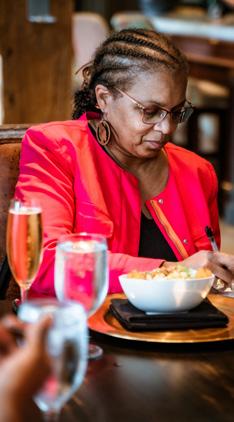
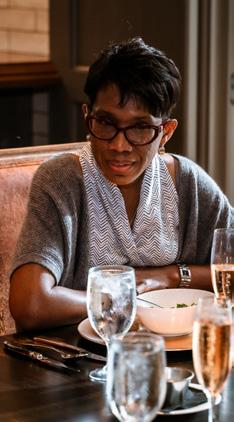
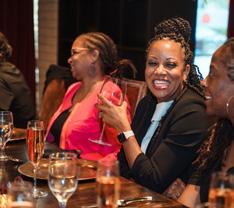
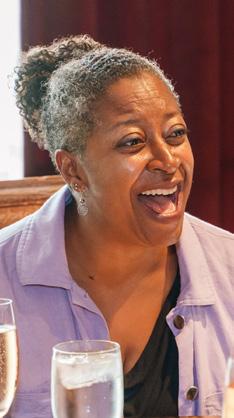
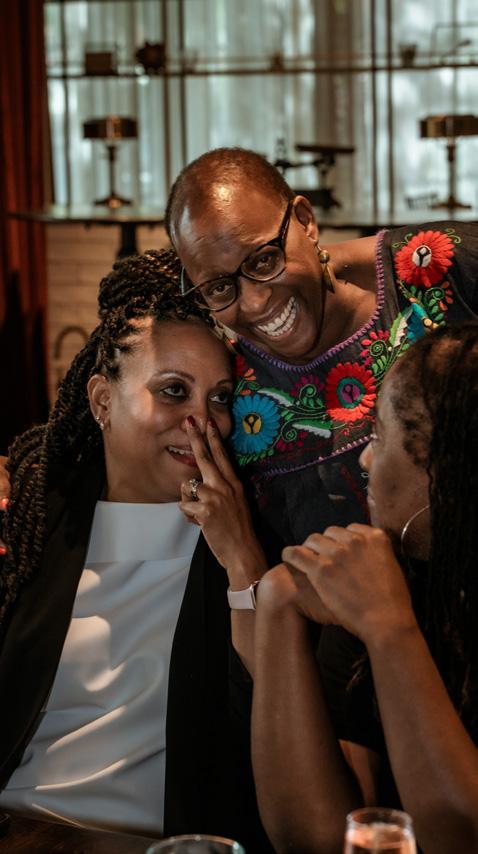


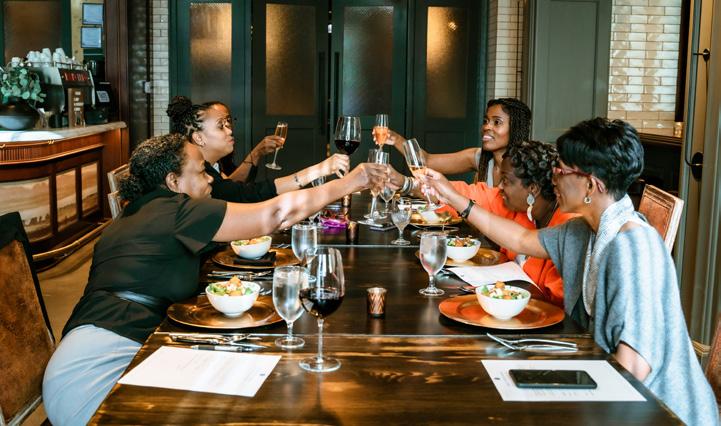
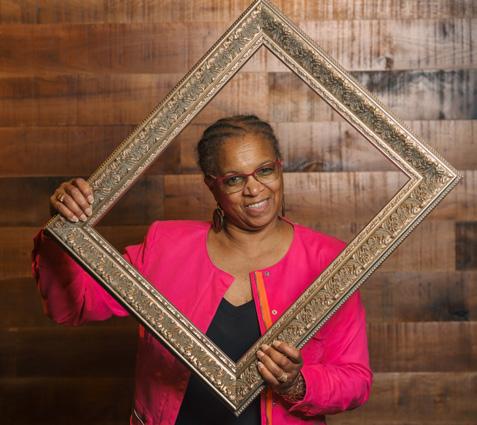
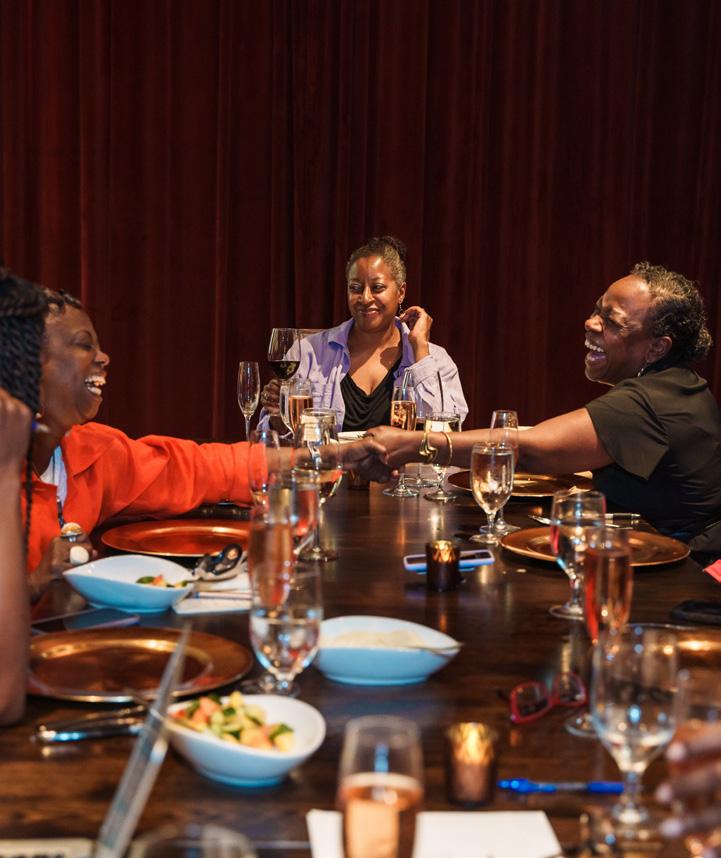

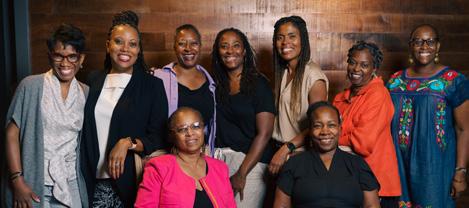
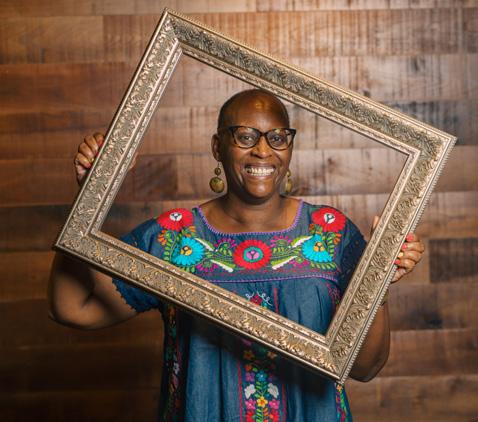
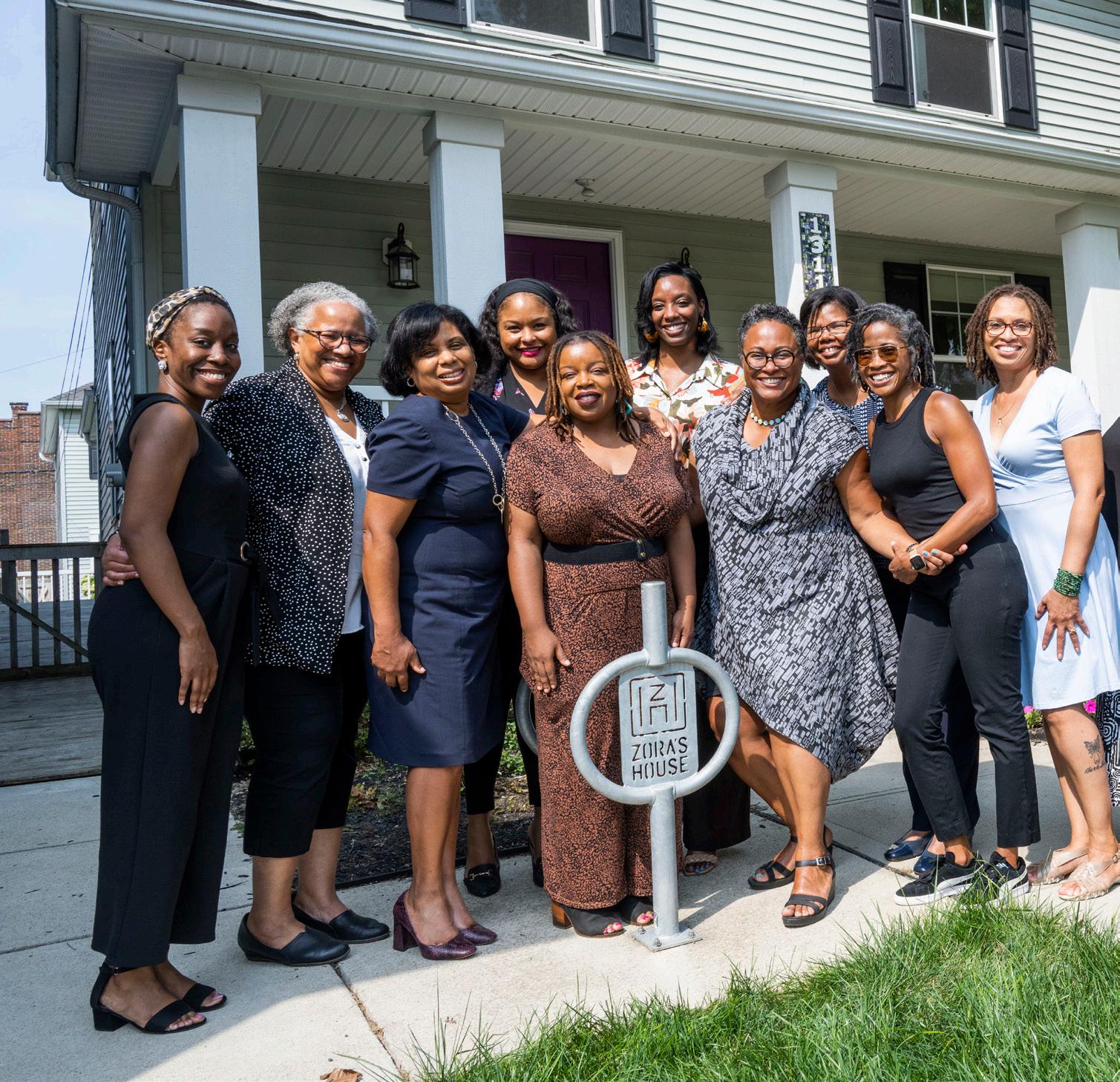
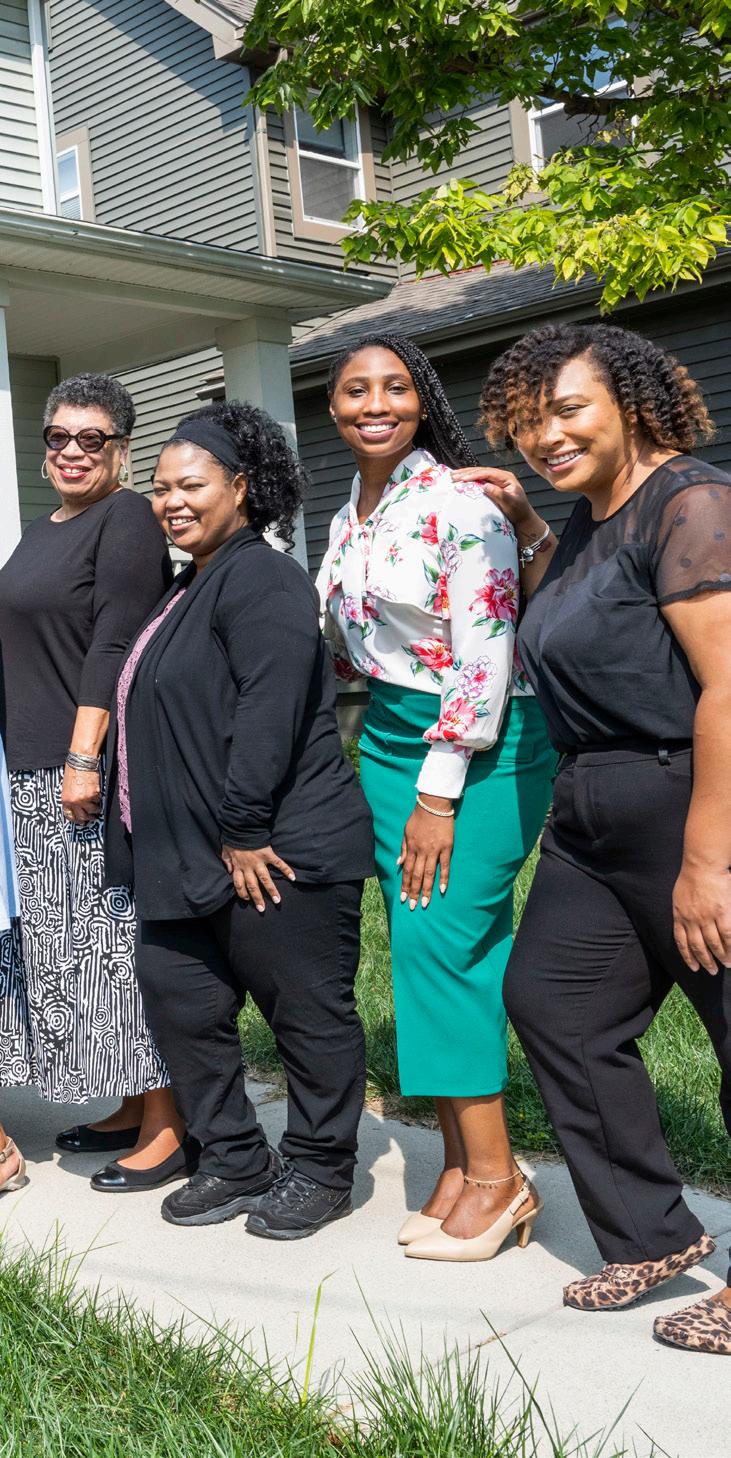
The Iroquois called “the great river” Ohi-yo, and for a brief period of time, enslaved people crossing that great river into the state named Ohio could breathe

easy and live free. At other points, the state included stops for the Underground Railroad. Though slavery has been outlawed more than 150 years, the consequences of that period of American history linger throughout the United States. Foundations across the country are developing equity initiatives and mandates to address these problems that continue to plague the United States.
Some of that best work is being done in Ohio and some of that by Black women who have a vested interest in the success of those initiatives.
African Americans are roughly 13% of Ohio’s population. There are an estimated 6,767 foundations and grantmaking organizations in Ohio.
Cause IQ.com
On September 16, 2022, Philanthropy Ohio’s CEO, Deborah Aubert Thomas invited Black women working in philanthropy in Ohio to gather for the Voice.
Vision. Value. book mixer at Zora’s House in Columbus
to discuss the joys and challenges of doing the work they do as Black women. Named for the legendary late writer Zora Neale Hurston, Zora’s House is a Black-woman-led incubator workspace for women and non-binary people of color. The beautiful space served as the setting for conversation, laughter, dreaming and real talk. That September meeting was the first time since the start of the Covid pandemic that many of the attendees had seen each other in person. One woman said the gathering “felt like a little reunion.” And for attendee, Tina Kimbrough of the Nord Family Foundation, it was her first time meeting Black women in philanthropy from Cincinnati. This essay captures some of the highs and lows of working in the philanthropy field as described by the Black
women who responded to Thomas’ invitation.
“It cost you something to do good.”
The gathering began with a collective appreciation for the Black women who were philanthropy pioneers in Ohio, some of whom were in attendance. Among the other names mentioned were those of Goldie Alvis, now retired from the Cleveland Foundation; Margot James Copeland, the recently retired former CEO of KeyBank Foundation who now currently serves on the Kent State University Board of Directors and Caprice Bragg, a former long-time development executive with Cleveland Foundation.
“It has taken time for culture to shift around accepting Black women in executive roles to change nationally and in Northeast Ohio.”
Lorna Wisham, Vice President, Corporate Affairs & Community Involvement President, FirstEnergy Foundation
The Three Big C’s: Columbus, Cleveland and Cincinnati Columbus, Cleveland and Cincinnati, are the biggest cities in Ohio, and each has its own cultural and political identity and strengths. Many
of the women interviewed agreed that the rest of the state’s philanthropy efforts are influenced by the work being done in the big three. Black women working outside of those areas say it is more challenging to remain visible as they work in philanthropy in smaller cities such as Toledo or Dayton.
That doesn’t mean, though, that there aren’t Black women in philanthropy making a big impact in communities outside those three major cities in Ohio.
Sharon Davies serves as an inspiring model of a Black woman who is making a significant impact in philanthropy. In April 2022,

Davies was named president and CEO of The Kettering Foundation, a Dayton-area nonprofit, making her the first woman to lead the organization in 40 years. Prior to her role at Kettering, Davies served as the Provost and Senior Vice President for Academic Affairs at Spelman College in Atlanta.
Jennifer Roller has led The Raymond John Wean Foundation in Warren, Ohio, since 2014 and has been credited with an ambitious
equitable community building mission in the underresourced communities of Warren and Youngstown.
In 2020, Lynette Forde, a trained research chemist, became the president of The Youngstown Foundation after years of holding various nonprofit positions. Forde said, “Most times in my career I was only encouraged to apply for VP jobs. It was my sorority sister and people outside of philanthropy that saw my potential and pushed me to apply for jobs I believed I would never get.”
Recent wins (and for sure there are too many to list in this essay) in the Ohio region include:
In March 2022, Connie Hill-Johnson was elected
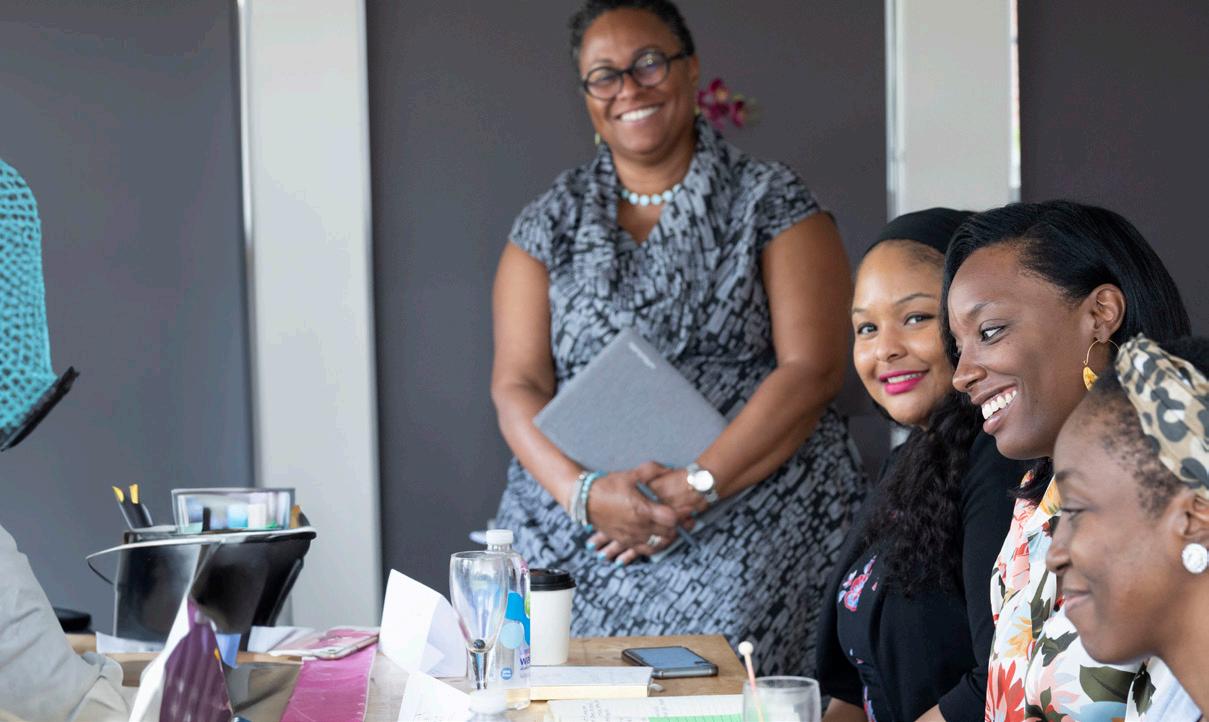
Chairperson of the Cleveland Foundation Board of Directors making her the first Black woman to hold that position.
Deborah Aubert Thomas, the evening’s host, was named CEO of Ohio Philanthropy in 2019. There she leads a statewide membership community for funders in the state. “In this role, I am not a grant maker, but I do get to influence philanthropy in Ohio and that is fulfilling,” Thomas said.
In 2019, Cleveland was one of a handful of cities that hosted the exhibit “The Soul of Philanthropy Reframed & Exhibited,” which was inspired by Valaida Fullwood’s book, GIVING BACK: A Tribute to Generations of African American Philanthropists, and the author’s mission to honor and highlight AfricanAmerican philanthropy. In response to the exhibit’s arrival in Cleveland, and out of the desire that the exhibit
lead to sustainable action, across sections of the city’s leaders formed the Cleveland Black Equity & Humanity Fund. The fund was created to cultivate interest in Black philanthropy and invest in the future of AfricanAmerican communities in Cleveland.
In Columbus, the legacy of the late Aminah Robinson, a Black woman artist who was born in Columbus and was the recipient of the McArthur “Genius Grant” will be preserved at the Columbus Museum of Art thanks to a $25,000 donation from Black philanthropists Donna and Larry James.
In March 2020, the Foundation for Appalachian Ohio created a new fund to support African-American communities in Appalachian
Ohio . This fund was spurred by African-American businessman Ernest E. Bynum (who died in January 2022) and his son, Earnest A. Bynum. The father and son had previously founded the Minority Business Resource Network of Southeast Ohio.
Theresa Carter has been a long-time pillar in the Ohio philanthropy community. She has served as president of the Synthomer Foundation in Beachwood, Ohio, since 2004 and oversees a nearly $30 million endowment. Prior to her foundation role, she served in several roles within the GenCorp Foundation and The General Tire and Rubber Company.
Proximity to money doesn’t mean access to it. Some of the more experienced Black women in philanthropy explained at the Zora’s House gathering and in subsequent interviews that earlier in their careers they couldn’t always be as vocal as the Black women in the field behind them. When they were starting out, there had to be a silent strategy to chip away at racism. They noted that many in today’s professional generation are less patient with injustice. Many of the women said social media has given people a platform to express their ideas and discontentment for better and sometimes for worse. The internet has put
information at everyone’s fingertips and has created a digital community of support that prior generations didn’t have.
Artisha Lawson, a program officer at the Greater Toledo Community Foundation, gives credit for her sense of community and voice to Central State University, an HBCU in Southern Ohio, which, she said, gave her a strong foundation for how to be a Black professional in a white world. Before Lawson entered philanthropy, she had spent years working in the nonprofit field, and she knew she wanted a seat on the other side of the table. But she quickly discovered that working in philanthropy was not, as she first imagined it. The work is not about holding big checks and saying congratulations to recipients. She admits she feels
pressure. The burden of being Black in philanthropy means navigating white supremacy, including low opinions of Black women and their capabilities. It has also meant managing the expectations from the Black community and resisting the bait to prove one’s blackness.
“I cannot be as forward and as authentic as I would like to be and that’s exhausting. From an early age we learn how to code switch and how to make people ready and comfortable to receive us, so
that they can hear us.”
The questions many Black Women working in philanthropy in Ohio ask themselves are: How do I remain myself and advocate for my community without giving the impression that I speak for the entire community? How do I distinguish between which battles to fight now and which ones to fight later?
Deanna Hillard is a Program Officer at Interact for Health. Hillard said there are stark cultural competency challenges in philanthropy when addressing disparities in BIPOC communities. Add to that the workforce shortage and health professionals’ fatigue and resentment. Patients who are not in the best of health are seen as a burden and are stigmatized.
One interviewee advised“Look out for yourself. There is no training and guidance for how to do philanthropy right when you first come into the sector. You get better with time, but most Black people don’t have the luxury of making mistakes on a job, so you have to really look out for yourself and find your tribe. Stay true to your values.”
Many Black women in Ohio in nonprofits and philanthropy have been pushing to reimagine health equity as health justice. Raising the expectations of equity in funding challenges power systems that have harmed poor communities. This is hard, emotional work for Black women especially because many have had their own health challenges and as patients have had to advocate for themselves to be treated with dignity. “All
my skinfolk ain’t kinfolk.”
Zora Neale Hurston
“A black man stepped to me and told me I was supposed to be giving ‘us’ the hook up. Told me I didn’t care about the community and called me out of my name.”
The women interviewed said they don’t appreciate cheap shots from critics questioning their Blackness or who publicly attack or embarrass them.
They want to help Black communities and see them benefit from philanthropic dollars but know they can’t achieve that goal by making improper decisions that will compromise the work or ruin their careers.
“I was accused of stealing from my people and giving it to a white man because my CEO is white. The person who did this to me was my inspiration for the fund we were developing. I was criticized publicly. This led to a decrease in respect and purpose of the fund (in response to George Floyd).
There have been a few people who have circled back to me three years later. My most vocal critics that have torn me down have been other Black people. I can’t explain how hurt I was to go through that especially through Covid. I’ve had to depend
heavily on my family as my support system.”
Many women report that the excitement from the Black community about having representation in a philanthropic organization can quickly transform into resentment, envy and even sabotage if those Black professionals aren’t perceived as doing enough.
“Black women want support but if we don’t get it, it doesn’t stop us. We are on a journey to do what we have been called to do. We need sister circles and
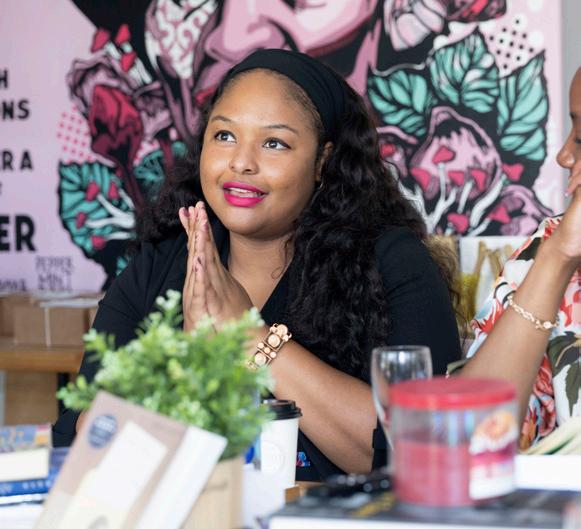
opportunities to let our hair down. We don’t have to be that strong Black woman stereotype. We still have a lot of historical trauma to be worked through, and we need safe spaces to do it. I still think we have colorism and notions of it can only be addressed one black person at a time.”
Fallon Peterson joined the Nord Family Foundation five months after Tina Kimbrough, the first Black woman the foundation hired.
In other words, they were the only two Black women on the staff. Kimbrough recalls how guarded and careful Peterson was when she began as a program officer. It was as if Peterson was preparing herself to not be liked by Kimbrough or, at a minimum, be seen as competition. Peterson was relieved to learn that Kimbrough
was kind and supportive. Kimbrough assured Peterson that she was happy to have Peterson, another young Black woman, working at the foundation. However, they acknowledged that sisterhood in philanthropy can be difficult to find and cultivate.
“Sometimes it feels like people often try to find something wrong with us to prove we are not worthy of occupying spaces in philanthropy.”
Fallon Peterson, Nord Family Foundation
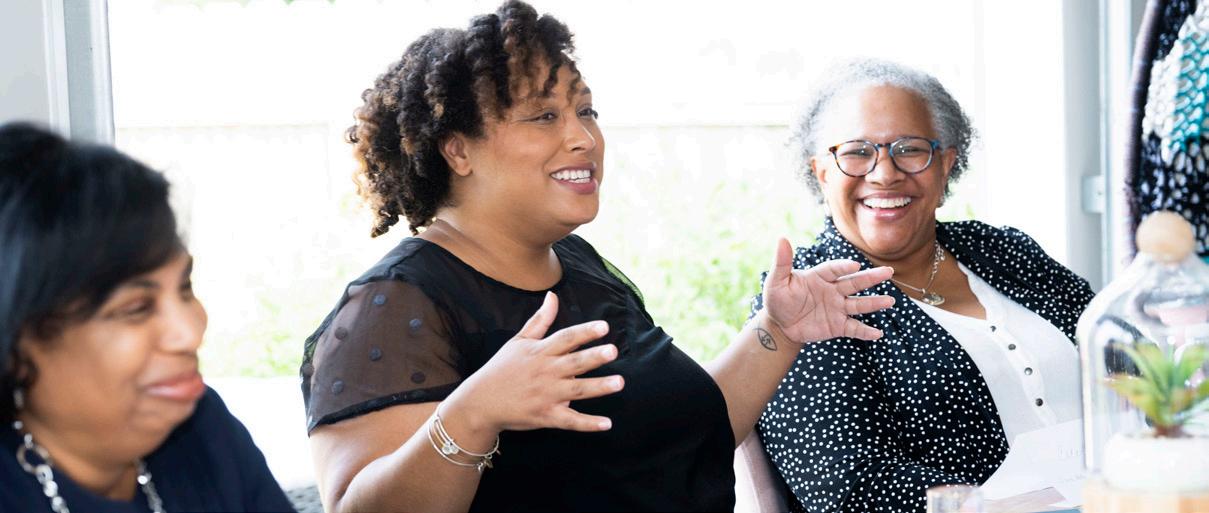
Another interviewee remarked that she always liked being in philanthropy, and it hurt me to leave after working in the field a few years, but that she had to value her wellness over a paycheck. When she returned to the field, she found the professional validation she deserved, but admited returning to philanthropy was still a difficult choice. Returning would be a great financial and career move, but she had to consider if it would be good for her mental health.
Another seasoned executive,
tells a story about serving on the board of an organization where a young Black woman’s passion for getting things done was being misconstrued as anger and bossiness. As a mentor for the young woman, the seasoned executive says she advised the young woman not to change who she was, especially not in the community, but told her that she would have to change her strategy in the boardroom. “It hurt me to tell her that,” she said. “It hurts me that we can’t be who we really are because of how they read and react to us.” Even so,
she said, the young woman’s different approach endeared her to the board which saw her with new eyes.
Black women in philanthropy and professional spaces often must navigate what W. E. B. Du Bois defines as “double consciousness” or the internal conflict between the inner/oppressed self and the public self that needs to survive in a white world. It means constantly thinking about how white colleagues will view them and the consequences.
“Sometimes the racism is not overt, it’s very subtle through questioning and tone. However, I think there was a relief that I was there as a Black woman on staff especially during George Floyd. I was a perfect cover for racism because I could be pointed to as proof that they
hired Black people.”
In some of the poorer white areas of Ohio that need philanthropy the most, Black women in philanthropy that serve those populations say they often meet resistance. Some people in rural areas have refused help or been extremely uncooperative, they say, because a Black woman or man was leading the philanthropy work.
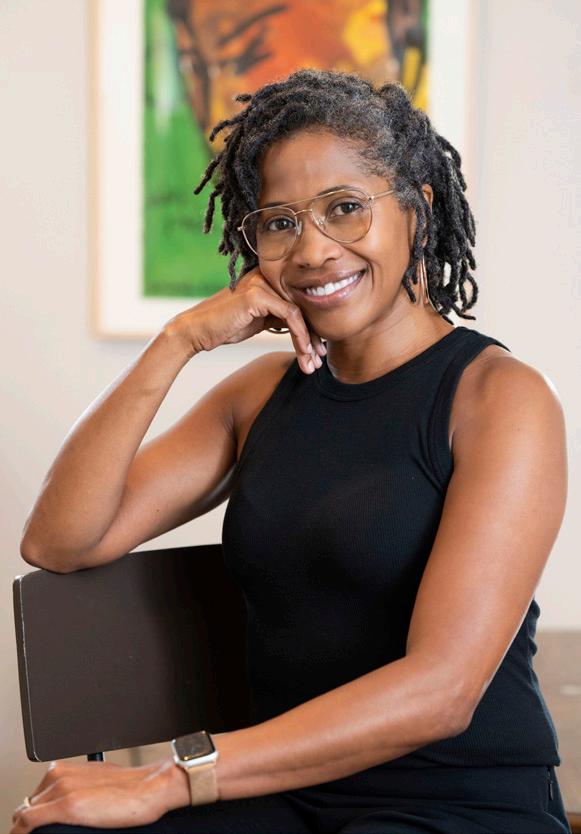
“I have had community members go to my board members and act as if they are telling on me when I direct them to apply for funding through the proper process. I’ve had to be firm and say the good ole boy network no longer works here.”
“When I get frustrated or reach my point, I have to go for a walk, put my headphones on and listen to my Christian music and remind myself I can do this. This is what I wanted. I deserve to be here. I have a right to be here, and I have made an impact.”
Foundations often say they value diversity and equity but don’t back up those claims with their actions. The history of Black women being overlooked has had a lingering effect in that it can
be hard for Black women to see philanthropy as a career when they’ve rarely seen themselves represented in the field. As for those Black women who have been hired, some report standing in a mirror (or with a friend) and practicing their responses to incidents that were harmful to them before they actually report them in an attempt to eliminate any emotions that will lead others to accuse them of being the angry Black woman. They do all that in the hopes that they will be heard.
“I get strength from my ancestors, community and doing the work. I always return to that when
I am feeling overwhelmed. I’m always the one bringing up why we don’t have DEI or why we don’t have no Black people in here, and it gets exhausting, but if I don’t it
won’t be on the agenda.”
“She has an inside and an outside now and suddenly she knew how not to mix them.”
—Zora Neale Hurston

Working in philanthropy can be stressful, and many Black women working in the profession have hinted at needing mental wellness support to perform at a high level while navigating workplace demands, racism and personal issues.
One woman admitted that she is still trying to figure out how to take better care of herself while working and being a wife and mother of a young child. “Sometimes people on the outside don’t understand what I do, and because it’s not physically demanding work people don’t understand the pressure.”
“One of the hardest lessons I’ve learned is recognizing that most institutions and philanthropy were never designed for people of color to thrive. It’s why supporting one another in philanthropy is so important. Our existence in this space is so necessary.”
Tina Kimbrough, serves as Co-Interim Director of Programs and is also serving in her original role as education program officer while the Nord Family Foundation seeks a new CEO. Its former director, Anthony Richardson left to become the first African American to be CEO of the George Gund Foundation. Kimbrough is intentional about maintaining her peace of mind as she manages two roles: “I keep myself grounded in family and friendships. When I’m having a bad day, I’ll Facetime my niece or binge watch a show. Sometimes I simply disconnect. I’ve given myself permission to be OK with taking a break. I also encourage my staff to take
wellness days or take a long weekend.”
Lynette Forde, president of The Youngstown Foundation, finds her inner strength through sister circles and music: “I believe in having a theme song, and of course, it could change. Every woman needs a theme song that affirms them before approaching a major work project or meeting.” She said the song, “I’m Here” from The Color Purple musical inspires her.
It’s a song of gratitude and a reminder that she can do
anything. The lyrics below became a mantra when she was selected as the first Black woman to lead her foundation:
I believe I have inside of me
Everything that I need to live a bountiful life
And all the love alive in me
I’ll stand as tall as the tallest tree
I’m beautiful
Yes, I’m beautiful
And I’m here.
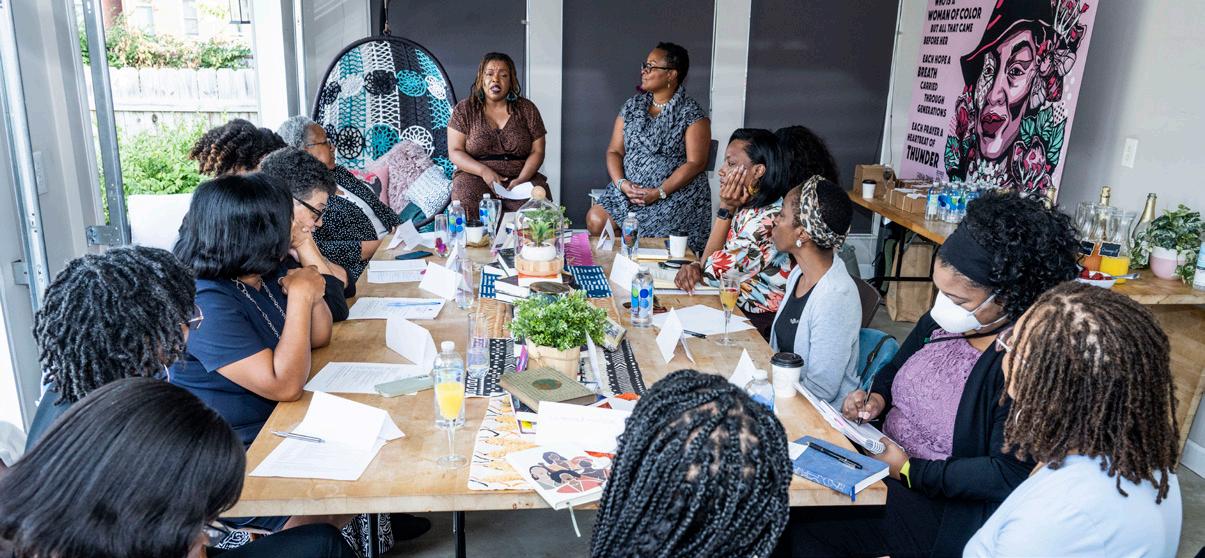
Fallon Petersen, a program officer at the Nord Family Foundation, has worked in philanthropy three years, and despite its many challenges, says she enjoys the work. “I desire to have a career in the sector,” she said. However, she’s clear that she’s experienced racism, microaggression, imposter syndrome and cutthroat Black women. “I entered philanthropy guarded,” Peterson said. However, she considers herself blessed to have several mentors guiding her journey: “Mentors don’t have to be generational or based on age. I consider some of my peers to be mentors. I’ve sought mentors on my own, and it’s (also) happened organically.”
Having Cecilia Render and other seasoned philanthropy professionals as mentors that have embraced her as a daughter has been invaluable
for Tina Kimbrough. “I was young when I entered the field, but I never felt alone,” she said. “There may not be a pipeline for African Americans in the sector in Ohio, but there is one-onone mentoring in the field.”
“I had to unlearn what I was taught about being professional because a lot of it was really about assimilation but I had to remind myself my education, skills, etc. got me here. I show up as myself and let the chips fall as they may.”
Artisha Lawson
ABFE, for many of these women, has served as a respite from the white world and pressure of philanthropy.
Participating in ABFE events and networks re-energizes them to go back to their organizations not only feeling confident but also feeling connected to a larger tribe of philanthropy professionals. In particular, the ABFE Women In Philanthropy Retreat was described by several of the women interviewed for this report as a must-do.
“The ABFE Women’s Retreat has forced me to realize that I don’t give myself enough permission to rest and seek self-care without feeling like I am not a hard worker.
I schedule regular massages now, and I am trying to get more walking in.” —Deborah Aubert Thomas
Many Black women in philanthropy in Ohio say it can be challenging to reach the highest levels in philanthropy in the state. There are opportunities, including the Gund Foundation Fellowship that provides entry opportunities into the field for emerging professionals, but most agree rising to an CEO/president level is difficult .
Therefore, if climbing the philanthropy ladder to the highest levels is a priority, then a Black woman in the field may have to seriously think about relocating out of Ohio. Some Black women in philanthropy who began their careers in Cleveland have their great advancements in philanthropy after they left the state.
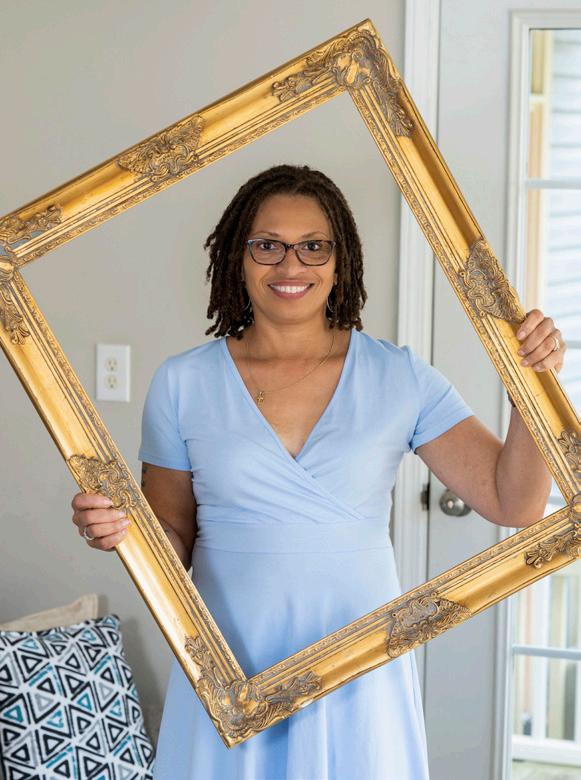
For example, Alesha Washington, who was program director for Vibrant Neighborhoods and Inclusive Economy at the George Gund Foundation, recently left for Washington to become CEO of the Seattle Foundation.
Courtenay Barton served as Program Director for Arts & Culture and Racial Equity Initiatives at the Cleveland Foundation for three years
before joining the Allstate Foundation as Senior Manager of Racial Equity and Workforce.
LaTida Smith, a Cleveland native, worked 12 years at the St. Luke’s Foundation as a program officer and vice president. It took her a while to admit to herself that she wanted to be a CEO, but when she finally admitted she wanted to take the step to the next level, she said she found that people in those positions rarely left their jobs or, in her opinion, those organizations weren’t interested in hiring a Black woman leader.
Smith, who is now the president of the Winston Salem Foundation in North Carolina, says she applied for the top position at St. Luke’s Foundation and was devastated when she didn’t
get it. If the foundation where she worked for so long didn’t want her as its leader, she wondered if she’d ever be selected for the kind of top-level position she longed to hold.
There was an image of what leadership looked like, Smith felt, and it didn’t look like her.
On top of that, in Cleveland, there were only about five leadership positions she wanted, and none of those positions were available.
“I bet on myself and it paid off.”
LaTida Smith
Stacey Easterling who started at the Cleveland Foundation in 2000 under the leadership of the esteemed Steve Minter, said “Cleveland absolutely
gave me a strong grounding in philanthropy,” Easterling said. At the time of her interview, Stacey was Vice President of Programs at the Virginia G. Piper Charitable Trust in Phoenix. She is now Executive Director of the National Institute for African American Health.
Easterling is grateful for the start Cleveland gave her in philanthropy.
“Sisterhood and mentorships gives us the confidence to apply for roles that we are afraid to be rejected.”
Stacey Easterling
The Greater Cleveland area has a robust philanthropic community that provided Easterling access to
philanthropy peers and support in and beyond her workplace, she said. “A lot of philanthropic organizations were coming into their own at the time when I was at the Cleveland Foundation. It was a great time for learning.” She credits Goldie Alvis as a role model for how a Black woman should operate in philanthropy and notes she also had support from white colleagues. After working in philanthropy in Cleveland, the East Coast and now the Southwest, she believes philanthropy has both a good and ugly side.
Easterling says: “We need to share power in order to make things happen.”
Organizations doing more explicit work on justice and equity and not just funding the status quo gives Easterling hope.
“I entered the field with this generosity mentality and (thought) that I could truly make things better. The shocker was everybody is not in the field for that. There are so many egos and hidden agendas. It was disappointing because I had to tame my excitement for doing good. I had to learn how to navigate politics and sometimes make noise to get meaningful things done.”
Easterling says there wasn’t a lot of bringing people along and creating Black pipelines in philanthropy when she began her career in Cleveland 20 years ago. She acknowledged that as the number of Black people in philanthropy grew so did the opportunity to find support from others in the field.
Easterling said she wouldn’t rule out a return to Cleveland
if the opportunity were right.
She knows what mistakes not to repeat and hopes she can make a difference in her community and in the careers of the next generation of Black women in philanthropy wherever she is.
Despite some Black women leaving the state in pursuit of other opportunities, there are Black women working in philanthropy who have decided to stay in Ohio and are thriving.
Teleange Thomas, who worked with Cleveland’s Sisters of Charity Foundation, is now COO
at JumpStart, Inc. Before JumpStart, she was Director of Partnerships at Candid—a merger of the Foundation Center and GuideStar.
Lorna Wisham is President of the FirstEnergy Foundation and oversees grantmaking and an investment portfolio.
Sonya Pryor Jones, who worked at Sisters of Charity Foundation, now works for the City of Cleveland.
Heather Terry, a former Saint Luke’s Foundation Fellow is now a philanthropy consultant at Dominion Energy Ohio. And there are many more Black women professionals in philanthropy, both emerging leaders and more seasoned ones who are shaping Ohio’s philanthropic landscape.
Despite many young, brilliant, Black women
having left the state, there remains a wealth of talent in Ohio. Some believe those who left departed primarily for better professional or personal opportunities, but others believe more liberal cities or states may provide a more welcoming cultural environment. But others argue that like most states, where you live in Ohio can determine your ability to thrive and advance for better or worse. Ohio has underappreciated natural and cultural resources.
No one disputes there is talent in Ohio, but acknowledges the state struggles to retain professionals due to low pay, few opportunities for advancement, the prevalence of racism and cold weather.
“When we told people we were moving to Ohio, the reaction was: why? But it was the right move for us.”
—Deborah Aubert Thomas, CEO Philanthropy Ohio.
How can Ohio create ladders for Black women to grow and
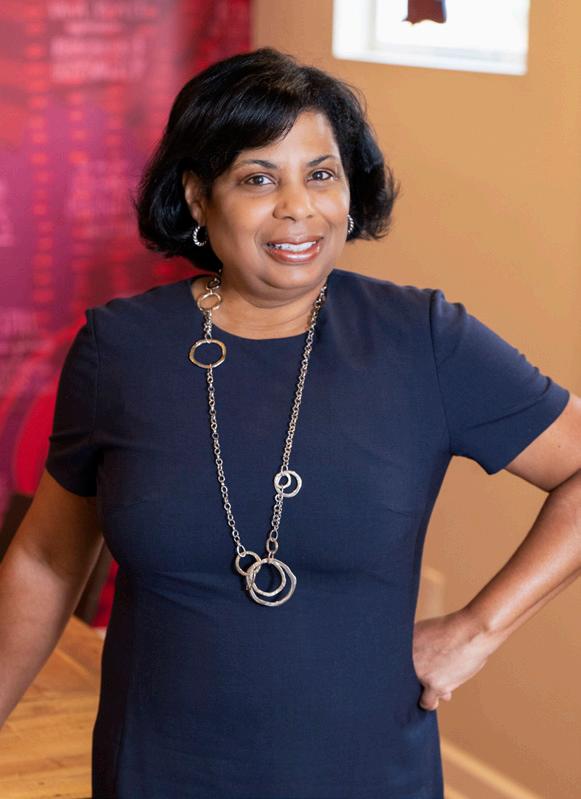
hang on so that the region can retain talent? Many point to Cleveland electing Justin Bibb, a young Black man who is an energetic civic leader as a step in the right direction not just for the city but also for the state.
There is a desire among Black women in philanthropy in Ohio and other sectors to return to honest conversations about race and to propel emerging and nontraditional leaders to the forefront. Many believe that during the George Floyd upheaval and at the beginning of the pandemic, philanthropic organizations were truly listening to the needs of communities and were willing to make the necessary adjustment to reflect life in real time beyond their ivory towers. But in the time that has transpired since Floyd’s
murder and the worst of the pandemic, some feel there has been a return to complacency.
A call for a state-wide pipeline for more BIPOC people to enter philanthropy in Ohio is echoed among many of the Black women who gathered at Zora’s House and interviewed for the Voice. Vision. Value. book. For many, Covid prompted them to make meaningful connections virtually. Others argue that there are more than a handful of Black people in philanthropy in Ohio, but there haven’t been enough efforts to make formal connections or a consortium in the state. Ohio is large and geography and politics in certain areas could play a role in how Black women choose to be visible.
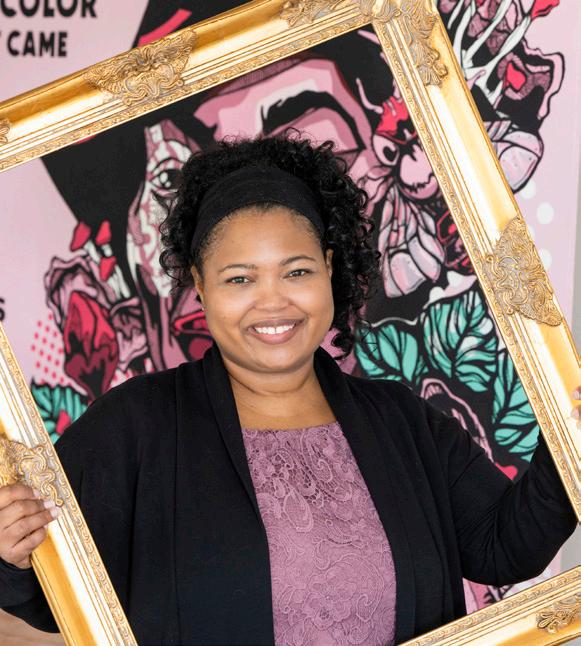
“It’s not hard to find peers in philanthropy in Ohio, it’s hard to find peers that look like you. We are involved but many like to stay hidden, put their head down and do their work and you have to respect that.”
The women who gathered at Zora’s House say the philanthropy sector in Ohio needs more than Black people in key positions.
Activating BIPOC communities and building coalitions will be key in the future. Tina Kimbrough
agrees and hopes that people working in philanthropy in Ohio will venture more out of their comfort zones: “People tend to stick to their regions and corners of philanthropy and miss great opportunities to connect with and learn from others in the field in the state. The urgent question is:
“How are we readying the next generation of philanthropy professionals for the work so that we don’t lose momentum in the gains we’ve made?”
“Philanthropy is hard, but we can do hard things. We have to do hard things. We

must do hard things. When I think about the amount of money that we have an opportunity to direct to our communities—we have to be in philanthropy to steward change. I want to see Black people thriving and living their best lives, and I get a chance to help make that happen through philanthropy.”
All those who showed up in response to the Voice.
Vision. Value. invitation agree and want outsiders to know Ohio is a beautiful place to live. Its lakes, landscapes and four seasons along with its relatively low-cost living, world-class hospitals and institutions make it a viable option for any professional.
If environmentalists’ theories prove true, as climate change worsens, weather becomes more extreme, coastal areas experience more flooding and the cost of living in those areas increase, there will be greater numbers of people migrating to the Midwest, maybe even crossing “the great river” into the state looking for security like people more than 150 years ago.
Black people know too well what it means to have to make decisions about where they can live and thrive.
Is Ohio ready? If Ohio does the necessary racial, economic and political work now, and listens to the Black women who are working in its philanthropic sector and beyond, then it could position itself to be a soughtafter home for many more people in the future.
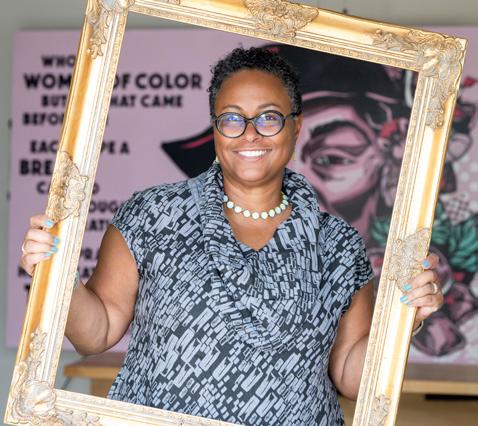
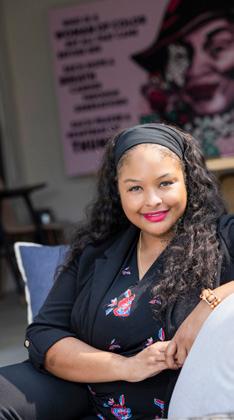

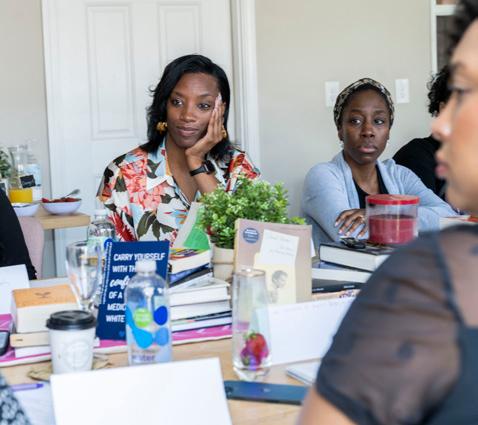
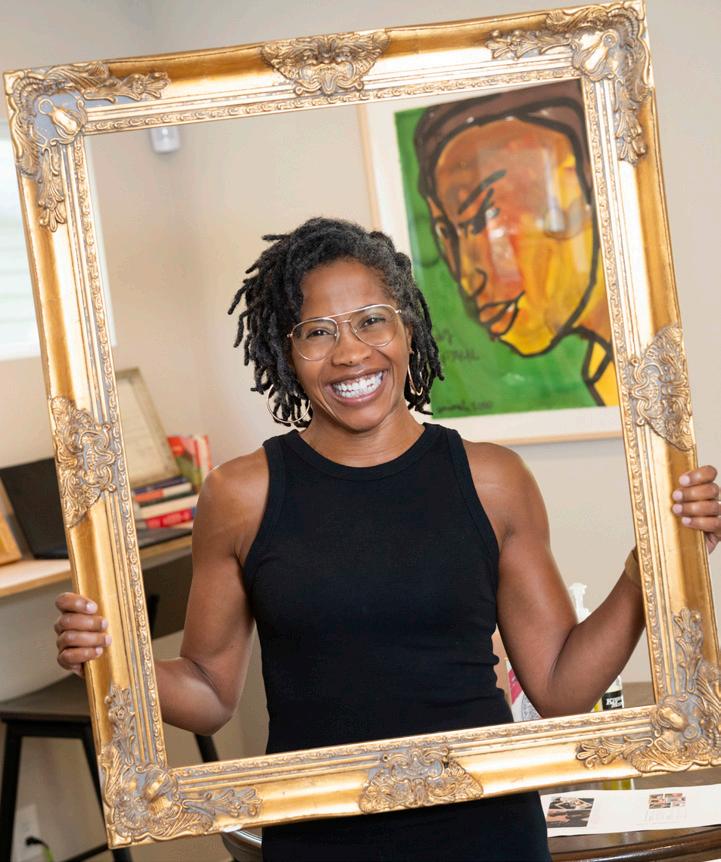
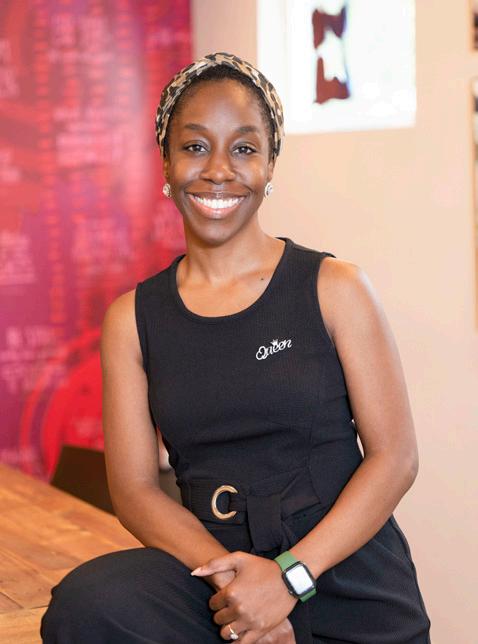
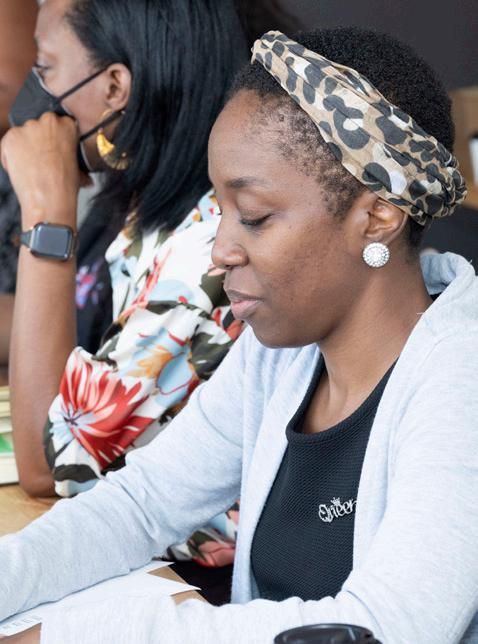

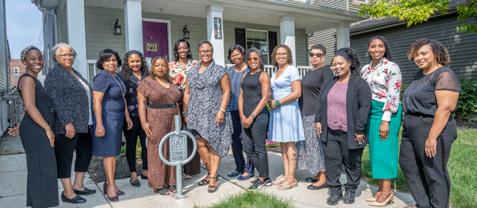


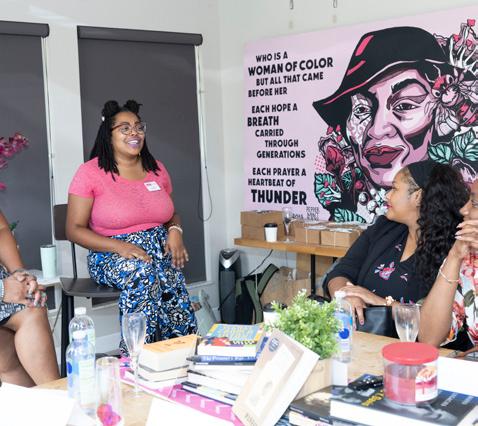
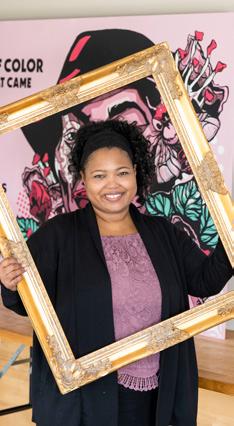
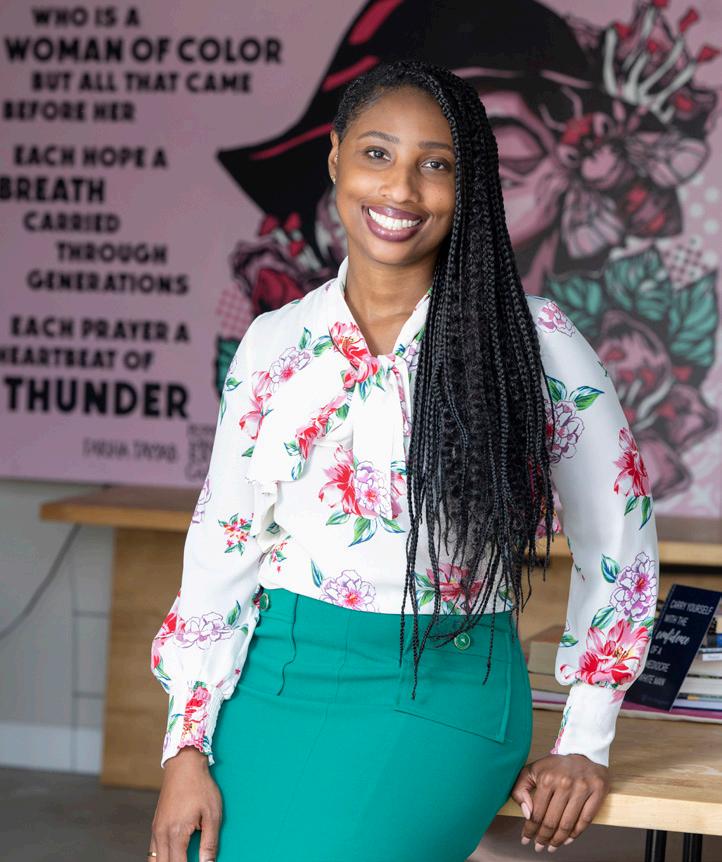


“Y’all didn’t tell me I was gonna be in church today.”
Shanell Watson described herself as “fortified” by the virtual, 90-minute Ubuntu Circle featuring more than 40 Black women leaders in philanthropy across the southeastern United States.
“Fortified” is a fitting way to talk about what happens when Black women come together. The word denotes strength, security, and protection, rendering you capable of taking on any challenge. It’s also a churchy word. And when Black women come together, it can feel like a spiritual experience.
According to the Voice. Vision. Value. Centering Ourselves report, which explores the leadership impact of Black women working in the philanthropic sector, Black women are “the largest BIPOC community across the talent pipeline of professionals in the philanthropic sector today.”
The key findings from the report—making structural changes, architects of innovation, and personal sustainability—were
reinforced in the stories that emerged from the southeast region and are woven throughout this chapter.
Philanthropy Southeast collaborated with Voice.
Vision. Value. to organize opportunities to curate the experiences of Black women across the southeast. The curation process began with a survey that participants completed online in the summer of 2022. The virtual Ubuntu Circle followed at the end of September, and the conversation continued four weeks later with a mixer and photoshoot and dinner in Atlanta, Georgia.
What follows in this chapter is a compilation of the stories and anecdotes that were collected during each part of the process from Black women working in philanthropy throughout the southeast.
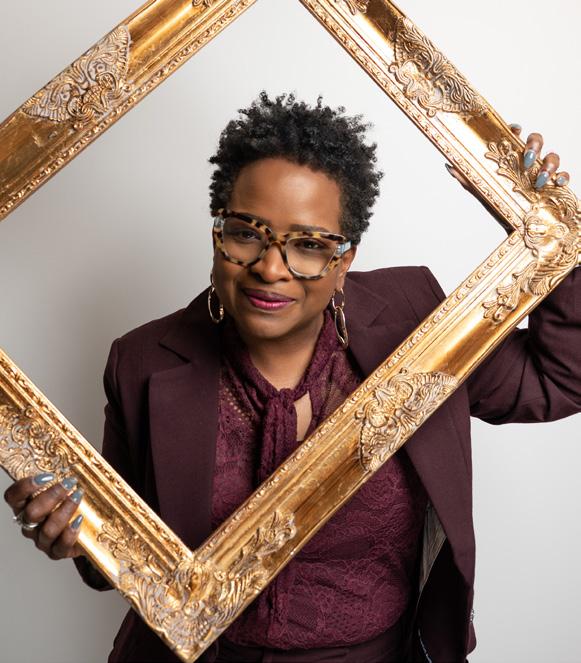
“We make our way by walking.”
Seasoned philanthropic executive and ABFE board member, Upendo Shabazz heard this phrase from a group of nuns she works alongside. She explained that when we make our way by walking, we walk into our community and into being our authentic selves. It also
means that we walk into accountability when we’ve made a mistake.
This walk can be a lonely one for Black women working in philanthropy across the southeast. With so few Black women in the philanthropic sector, it may be tempting to bite your tongue and convince yourself that you should “just be happy” you have a job. As one survey participant reminded Black women leaders, “you
are brilliant, you have done the work, and you are deserving of your role.”
She added that having high expectations of your colleagues and for the philanthropic organizations that have expressed a
commitment to diversity, equity and inclusion is only fair. “Using your voice” was a common theme that emerged out of the survey data and the virtual Ubuntu Circle.
Mamie Nicholson, president of The Self Family Foundation in Greenwood, South Carolina, said that using one’s voice starts with listening, observation and preparedness.
“You have to know the room, and you have to know your board—both as individuals and as a collective,” she said. “You don’t get that by talking so much. You learn to listen to the conversations that are happening, to the tone of the conversations, and you learn to observe the interactions.
Pay attention to who’s saying what and identify who everybody else is listening to.
Because all the voices in the room don’t carry the same weight. And you need to be prepared to respond when it’s your time to respond.”
Mamie added that by taking this approach, people recognize the value that Black women bring to the rooms they are in.
“When it’s our season, it’s our season. And people can’t stand in the way when that happens because we’ve been
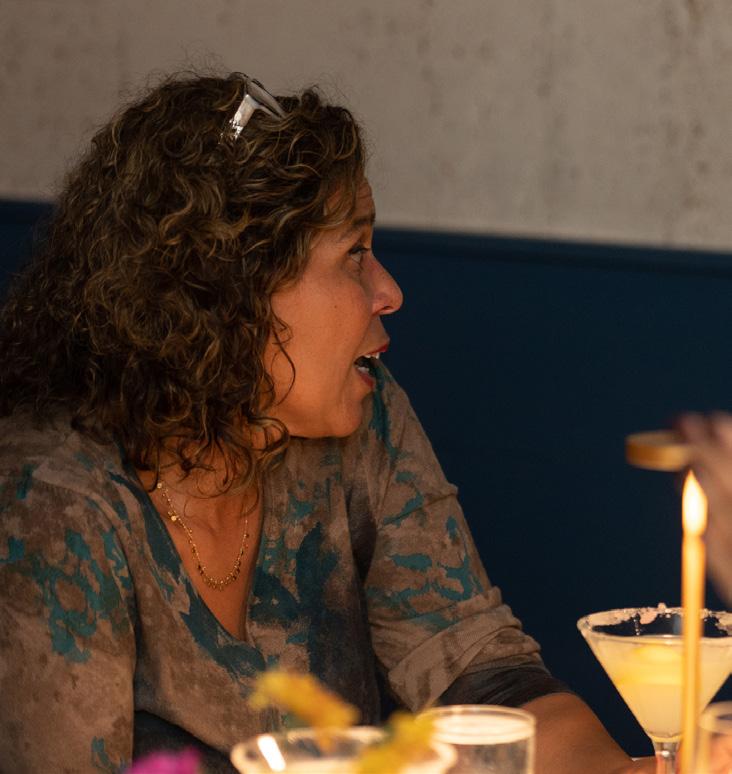
doing the work, and the ground has been prepared. We become more than the complexion of our skin. We bring value when we sit in the room, and it’s acknowledged and missed when we’re not in the room. We’ve made good use of our presence and didn’t just occupy space.”
Another survey respondent aptly stated that Black women leaders in philanthropy have to strike the delicate balance between
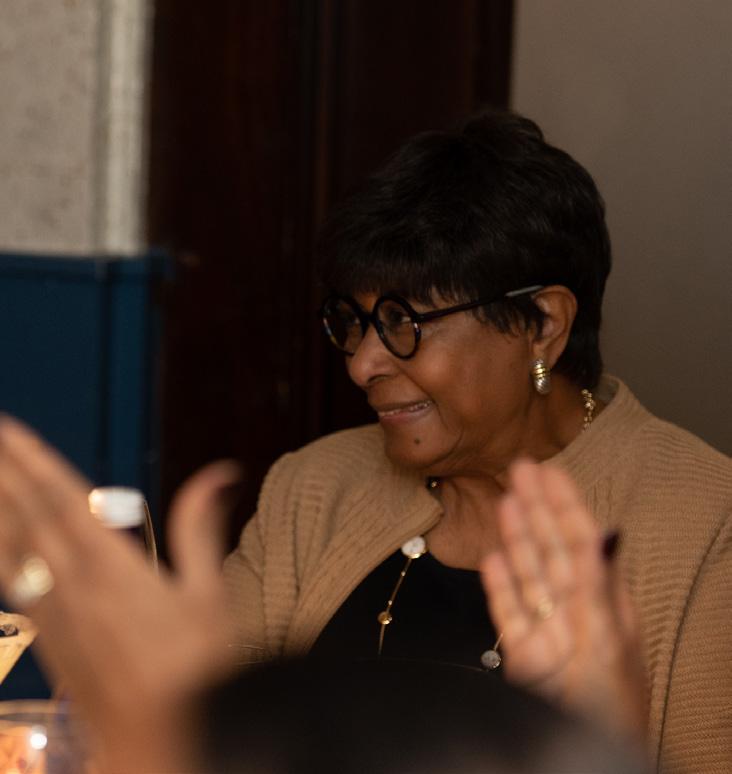
“protecting our peace, giving voice to those that we serve, and being able to reflect and absorb critical feedback.”
Discernment is a skill that takes practice, and we have to be brave enough to take risks and learn from them.
Philanthropy Southeast envisions “a courageous community of philanthropists, leading innovative work that results in an equitable South defined by justice, hope and opportunity for all.” Risk-taking is essential to courageous leadership. In order to take risks, however, you have to learn to trust yourself, otherwise, you’re
more likely to maintain the status quo.
Trusting oneself is a refrain the women emphasized throughout the virtual Ubuntu Circle. Elevating racial and social justice in philanthropic organizations takes more than simply having Black women in the room; Black women also must have a seat at the table and feel empowered to use their authentic voices to advance important and necessary conversations.
“I think in my early career I just didn’t trust myself enough,” said Adell Neal. “I didn’t trust my first instinct. So I would tell my younger self to trust yourself, trust your instincts and trust what you’ve been taught by your mentors.”
Trusting yourself doesn’t happen without some bumps
and bruises along the way, said Ereka Williams. Some lessons you may have to learn the hard way.
“Don’t force or push so much, but trust the wisdom and counter the narrative,” Ereka said. “Because the narrative against you can play games with you and have you second guessing the things that you showed up with.”
According to The Inclusion Solution, a blog by The Winter Group Inc., dominant narratives are “those stories we tell ourselves, learn, or share with others—
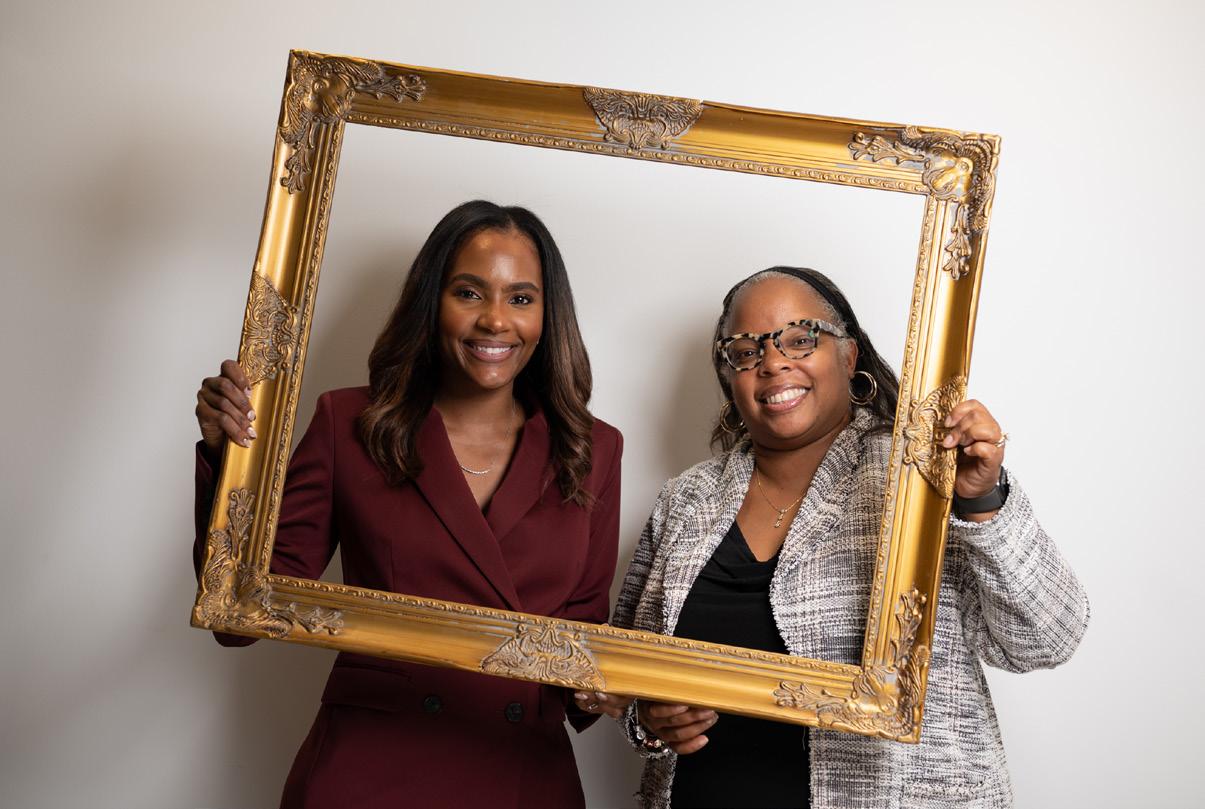
whether consciously or unconsciously—that also uphold existing power dynamics. They celebrate or absolve groups who already hold power, or demonize or blame those who are marginalized.” When left unchallenged, dominant narratives can benefit some groups and harm others.
Black women have to contend with dominant narratives about our
temperament, commonly described as “the angry Black woman.” This narrative is amplified in the South, where respectability and congeniality are woven into the fabric of the region’s culture along with the remnants of Jim Crow, and where the comfort of white people is paramount. Said one survey respondent, “In the South, there is always the barrier of history, the barrier
that Black women are not capable of leading, that we lack the ‘temperament’ to lead.”
Additionally, there is a dominant narrative in philanthropy that Black people are often the recipients of charity rather than the people who give. The Centering Ourselves report by Voice. Vision. Value. states that in their interviews, Black women consistently spoke of the need to move the field of philanthropy from a “charity mindset” to “compensation for oppressive harm.” The report went on to say that many of the women leveraged the skills and expertise they gained from their grassroots and/ or organizing backgrounds to “transform their organization’s approach to grantmaking and investing.”

Before beginning her role at a Baton Rouge-based family foundation in March 2022, Ebony Starks worked in affordable housing and later in development for a nonprofit that focused on financial capacity and financial education for underserved neighborhoods. Once she shifted her career to work for a grantmaking institution, she quickly realized that a lot of the language used to describe the conditions of the Black and low income people the foundation serves is rooted in deficit. She said
becoming aware of the language philanthropic professionals use is one way to shift dominant narratives and begin the slow work of advancing racial equity and social justice. “I’m the only employee of color at my foundation and am new to the funder side of philanthropy, so holding colleagues accountable for the language we use feels like my responsibility,” Ebony said. “I would hear the words ‘disadvantaged’ and ‘underserved,’ and I got to a point where I said, ‘I can’t hear ‘underserved’ anymore. Why don’t we just start serving?”
In the survey, a number of respondents agreed that philanthropy needs to be redefined. One person wrote, “The narrative is one built around the financial
contributions of white billionaires. There needs to be recognition of the roles Black women play in philanthropy—advocacy, strategic leadership, activism, mobilization, and more.”
Having diverse voices and experiences in philanthropy is vital to moving the sector forward and affecting change, but as one survey participant noted, many white-led foundations across the South tend to lean conservative and do not center the needs of Black communities. Additionally, the few Black staff members at the organization may face covert and overt racism “while trying to do work that is specific to the needs of our communities in a way that feels authentic.”
In 1998, Mary Thomas became the first African
American to work at The Spartanburg County Foundation, the oldest community foundation in South Carolina. Although the work environment was “buttoned up” and quite different from her last role, she often reminded herself that she belongs in any room she finds herself in.
“I have a deep, abiding faith that lets me know, first of all, who I am. So I walk with a certain level of confidence. Even if I’m shaking in my boots, I am confident that I’m not in that room by myself—God is always with me. And I’m there for a reason, and I’m proximate to the work. My lived experience may not be the experience of someone who actually grew up in public housing, but I have been close to the people whose lives we’re trying to change.
And our philanthropy needs that perspective in order to invest in these communities.” Mary was named CEO of CFLeads in January 2023.
Another participant echoed this sentiment, stating that Southern grantmakers tend to use “an invisible litmus test” to distribute funds. These decisions are often not equitable to the communities and leaders that need the investment the most. One outcome of hiring diverse philanthropic professionals is the diversification of grantee partners. A survey
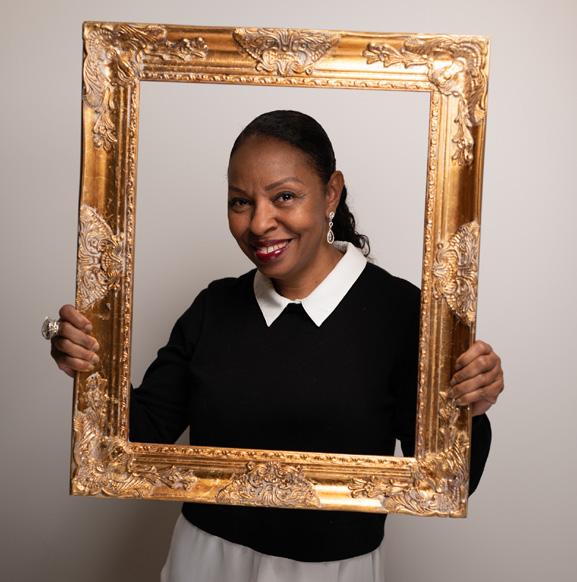
respondent who began her career in 1996 said “changing the color of the room” has resulted in Black-led organizations being more comfortable and more equipped to approach philanthropic organizations for funds. This, she said, was a direct result of the “true, authentic, relatable and honest” lived experiences that Black women and other people of color have brought to the table.
communal,” approaching networks “in a more familiar and transformational way.” The report went on to say that Black women approach their work in the same manner, seeing their vocation as “life work, as transformational work that is not separate from their personal life.”
“Black
girl …
you don’t always have to be the one to save the world.”
The Centering Ourselves report describes Black women as “collaborative and
Foundation trustee, Tjuan Dogan’s introduction to philanthropy came from watching her Big Mama take care of the community. Once she began her career in the philanthropic sector— which has included roles in the nonprofit, foundation, and corporate arenas—Tjuan found a mentor through Philanthropy Southeast president and CEO Janine Lee. She was able to express her gratitude to Janine during the virtual Ubuntu Circle.
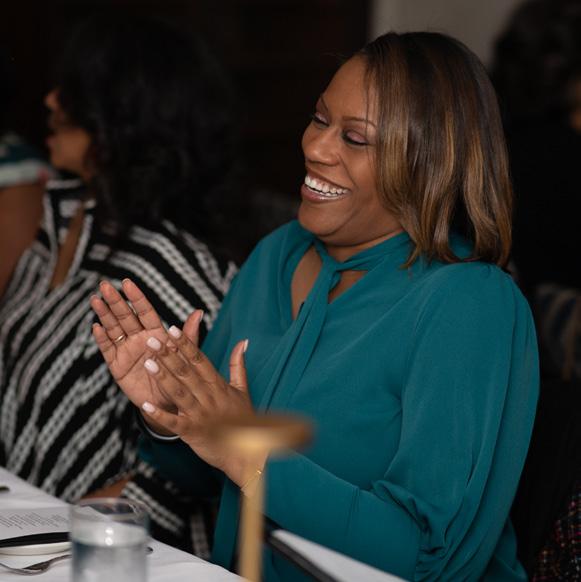
“Early in my career, [Janine] hired me at the Arthur Blank Family Foundation,” Tjuan recalled. “As I moved and navigated to different arenas—nonprofit, foundation and corporate entities but still in this field— she has been a solid and grounded sounding board, support, recommender and sister-friend. Janine, I really do thank you for that. I’m blessed by your mentorship, I’m blessed by your leadership, and I appreciate your sisterhood as well.”
Janine was lauded by multiple
women as a Black woman leader who “held the door open” for other women in philanthropy, “invited other Black women to the table,” and “challenged philanthropy in the South to lead courageously with a focus on advancing equity.” She and other Black women leaders in philanthropy—Susan Taylor Batten, Karen McNeil Miller, Gladys Krigger Washington, Toya Nash Randall and Sherece West-Scantlebury to name a few—were credited with “lifting as they climbed,” making space for other Black women to not only enter the philanthropic sector but to have successful careers.
Dr. Sherece WestScantlebury’s first introduction to philanthropy came after she landed an internship with the Ford Foundation. From there,
she began working for the Annie E. Casey Foundation in the 1990s under Sandra Jibrell, who she describes “as the best supervisor and boss ever in life.” Sherece said that Sandy along with other Black colleagues at the foundation—namely Garland Yates, KC Burton, and Ralph Smith—saw her leadership potential before she saw it in herself.
“They poured into me,”
Sherece recalled. “Because of their direction, I learned to navigate, I learned to write, I learned to do strategy. They saw I was capable and gave me more responsibility. I had a team of mentors without really knowing I had a team.”
Sherece credits her four aforementioned colleagues for encouraging her to join
“ABFE was where I was able to find community,” Sherece said. “At that time, there weren’t many people of color in philanthropy, period. And it was through my involvement with ABFE that got me to where I am today.”
Sherece is now CEO of the Winthrop Rockefeller Foundation in Arkansas. She recognizes the importance of mentorship—especially for Black women in philanthropy—and rarely
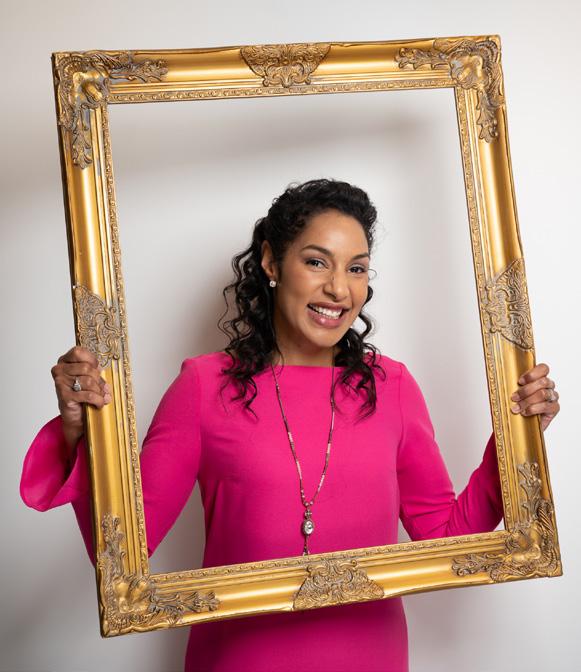
turns down a mentoring opportunity if asked.
“It was done for me, and I have to pay it forward. Those four people showed me what I need to do to support others.”
In the survey results, many respondents referenced the importance of having a formal network for Black women in the philanthropic sector to find a mentor, commiserate with one another about microaggressions they face, share ideas and experiences and solicit advice. At the virtual Ubuntu Circle and the in-person event in Atlanta, attendees consistently expressed gratitude for
having a safe space for Black women to connect with each other—a space they had longed for. Statements such as, “I knew I wasn’t crazy,” and “my heart is full” were popular sentiments echoed during both the virtual and in-person events.
Since 2014, ABFE’s has organized an annual Women in Philanthropy Retreat for Black women leaders. This retreat “promotes the overall health and well-being of attendees by offering strategic career consultation and planning, leadership development and coaching, and facilitated respite.” Additionally, Voice. Vision. Value. is committed to “curating experiences that strengthen opportunity pathways for professional advancement; provide holistic leadership development; prioritize personal health
and well-being; and facilitate strategic network building.”
Both efforts share a common goal of prioritizing wellness through these professional networks.
In the Centering Ourselves report, “wellness” consistently emerged as an imperative for Black women. Although wellness and self-care is seen largely as
an individual act, the Black women interviewed for the report and also for this book chapter emphasized the importance of community building among Black women as a form of self care.
“Black women need space as leaders,”
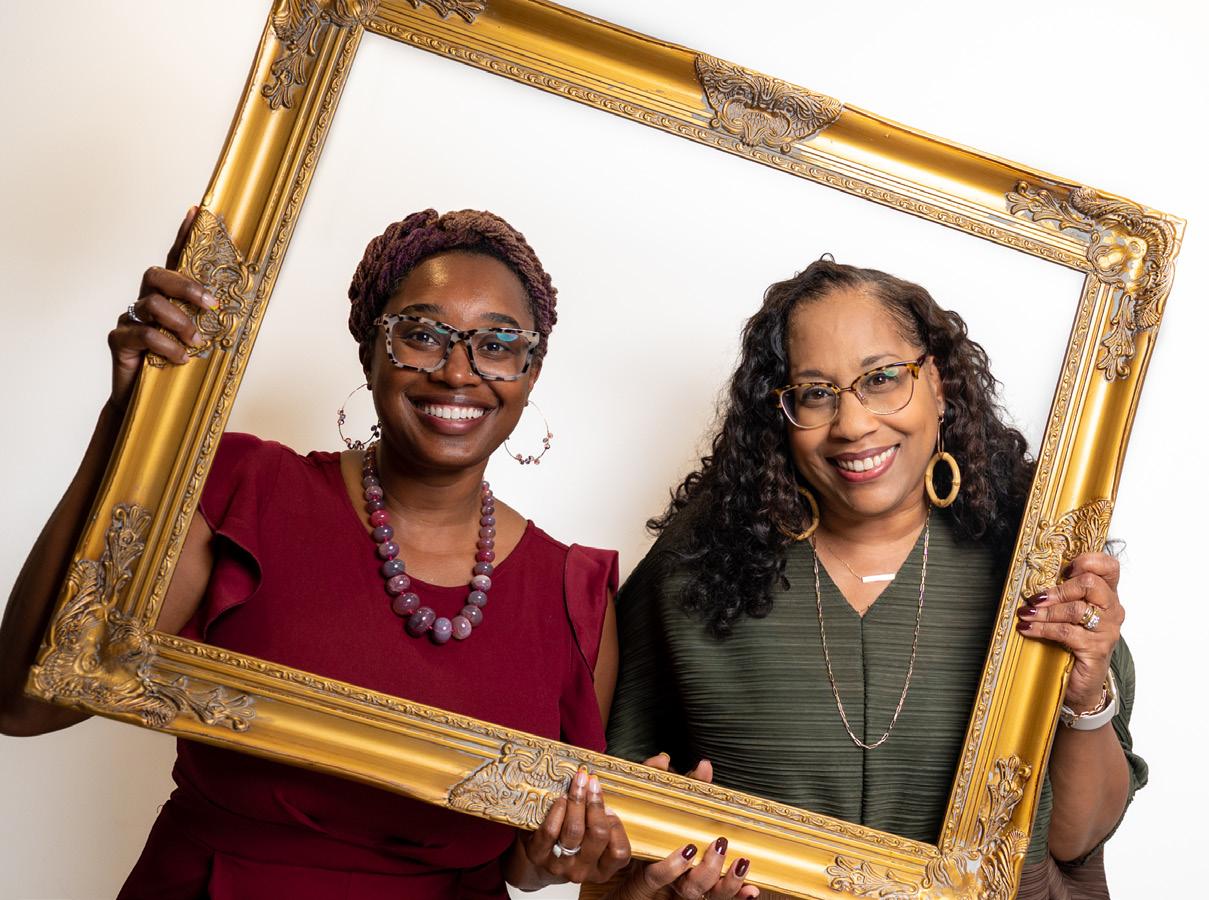
said a survey respondent. “Space to heal and care for ourselves; space to define our role and legacy; and space to dream, reimagine and redesign. Black women need space without the burden and expectations of white dominant culture.”
Despite the power Black women have to reshape philanthropy and use their authentic voices to impact communities across the southeast, we can’t do it alone. As one survey respondent beautifully stated, “My wildest dream is for Black women to be trusted and left alone to do whatever they need to do for themselves. It would mean that Black women are entrusted with their lives, well-being, communities, corporations, etc. and to have the tools and resources to manage those things
with ease. We would have abundance in every area of our lives, and rest and healing would be at the center of all of it.”
During the virtual Ubuntu Circle, Kendra Jones reminded the group that rest, recharging and self-care are as important as the work. As the adage goes, you cannot save others until you first save yourself. She quoted a line from singer-songwriter Tasha Viets VanLear’s Lullaby, a soothing and melodious song that reminds Black women that we have permission to rest:
Black girl, we’ll leave this fight to someone else for now
You can close your eyes, let your hair down
Breathe in, breathe out
Yes, there will be battles
you’ll sometimes lose
They’d never last for a day in your shoes
You still need to rest too
You still need to rest too
Black girl, I know how much it hurts
To always prove your worth
They won’t make it easy, but baby, believe me
Your life is precious, and you’ll be all right
Let’s lay down for a while; they’ll be just fine
It’s OK; you can keep your magic to yourself, keep it tucked away
They’ll have to find another wonder for today
You don’t always have to be the one to save the world
You’re always the one to save the world
And they never say, ‘Thank you, girl’
I love you Good night
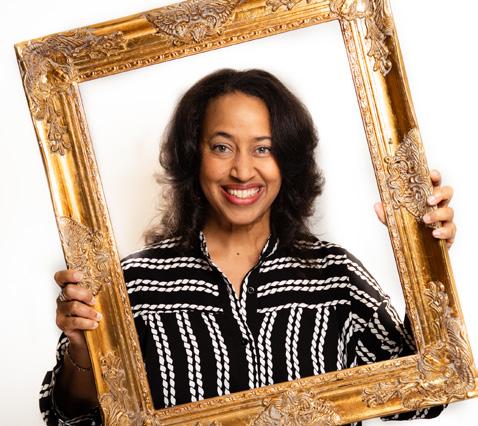
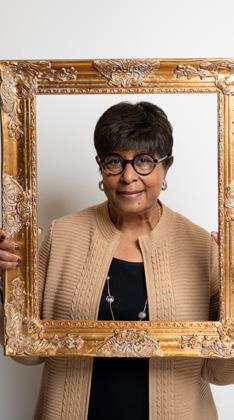

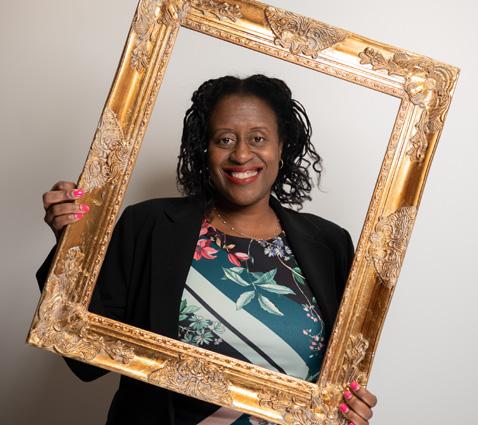


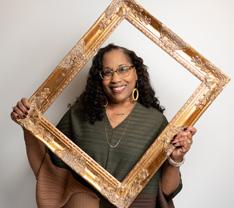

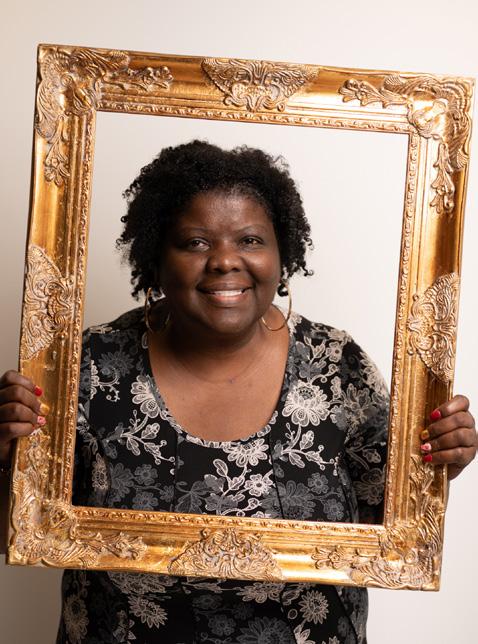
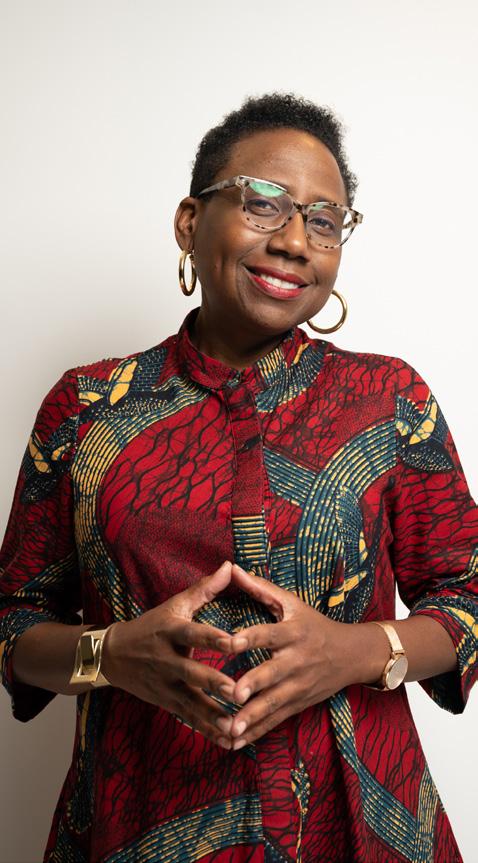
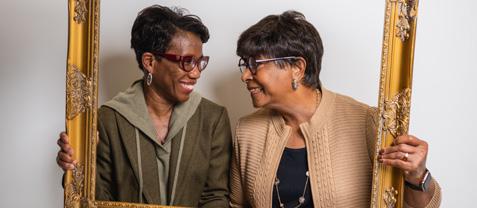
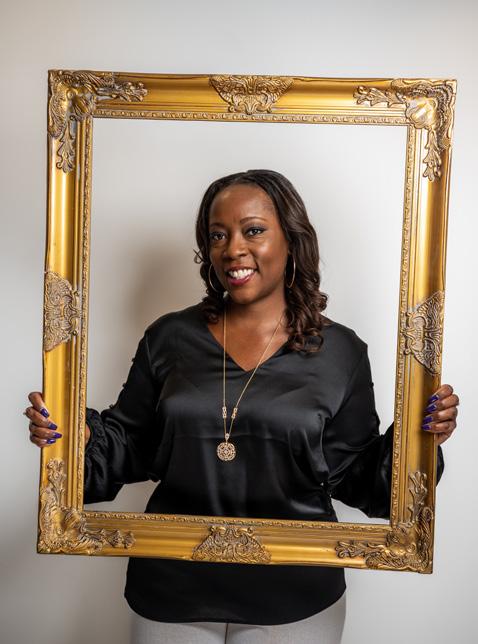
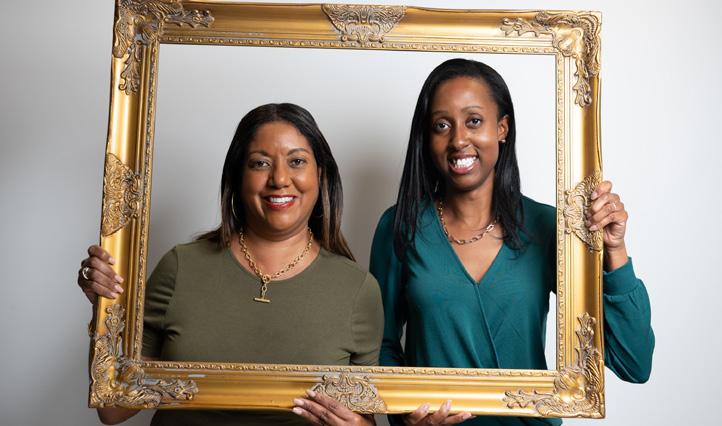
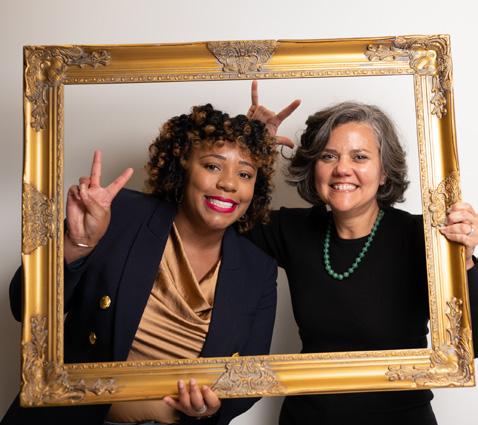
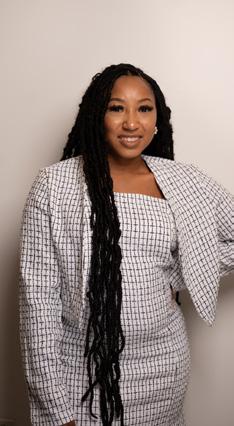
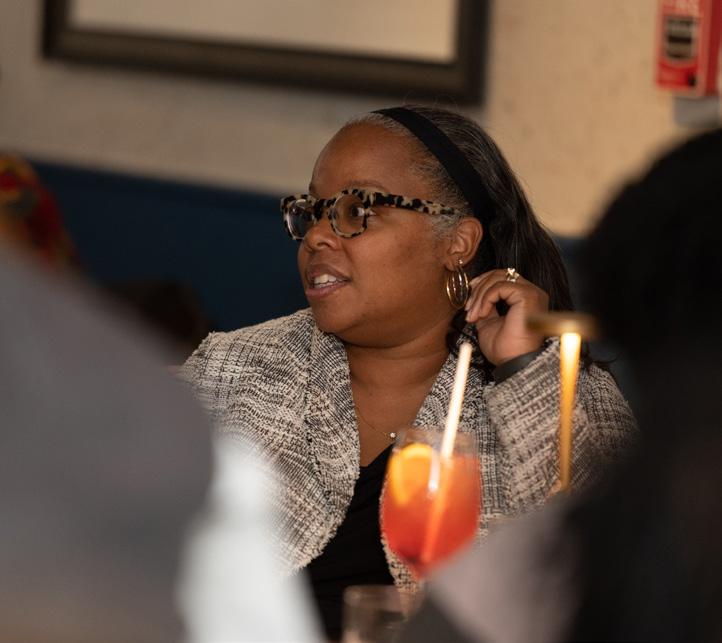

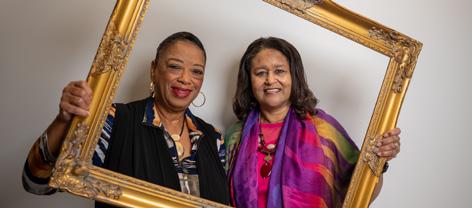
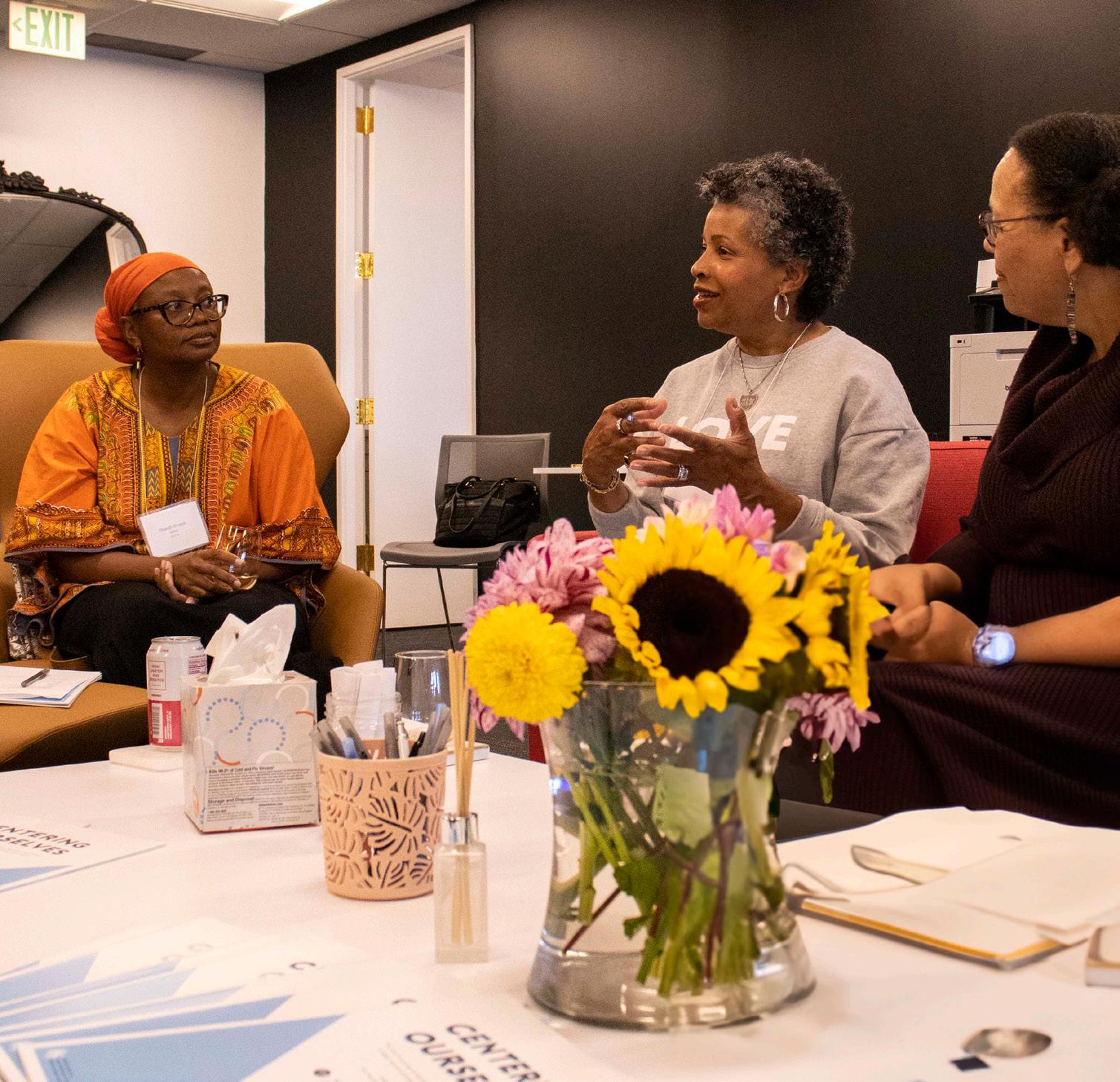

On an unseasonably warm Autumn day in Seattle, a group of Black women streamed into an office situated on Lake Washington’s waterfront for the Pacific Northwest Voice. Vision. Values. (VVV) book mixer.
In a region with less than 340,000 residents who self-identify as Black, representing 2.1 percent of the overall population, a gathering entirely made up of Black women is a rarity. And as Black women here, like the rest of the country, have always been engaged in mobilizing and organizing for the betterment of our communities, the gathering was a necessary one.
With Beyonce’s recently released Renaissance, Afrobeats and Nina Simone’s To Be Young, Gifted and Black, serving as the soundtrack of the event, the women, ranging in age, immediately settled into a comfortable fellowship, laughing about stand-up comedy, learning that they grew up in the same areas outside of Seattle, exchanging compliments about attire.
The event was hosted at Threshold Philanthropy, a dynamic philanthropic organization dedicated to centering their work in liberation, reparations, transparency, joy, generosity and bravery. After identifying each other as fellow disrupters, who’d grown weary of being limited by the rules of traditional philanthropy, the founders joined forces to advance
the ideals of philanthropy without advancing harm and white supremacy.
Out the gate, Threshold’s cocreator and co-CEO Lindsay Hill addressed the group making clear her passion for her new organization’s stated ideology, notably declaring their rejection of 401Ks, with an unequivocal rebuff of extractive capitalism. The only money that Threshold has in the stock market, she added, is in a particular Black. Queer-led portfolio focused on social justice and actively divesting from private prisons and the fossil fuel industry.
Threshold is establishing itself in a region that boasts philanthropic headquarters with recognizable names including the Seattle Foundation, Inatai Foundation, The Paul G. Allen Family Foundation,

Casey Family Programs, Alaska Airlines Foundation and, of course, the Bill & Melinda Gates Foundation (BMGF).
Founded in Seattle in 2000, after the merging of the William H. Gates Foundation and the Gates Learning Foundation, the Bill & Melinda Gates Foundation is the largest charitable foundation in the US with an endowment of over $53 billion. The primary stated
goals of the foundation are to enhance healthcare and reduce extreme poverty across the world. Some of its earliest actions included pledges to the Global Fund organization, which works to eradicate life-threatening diseases such as Malaria and Aids. The Gates Foundation was also a founding partner of GAVI, the Vaccine Alliance, created in 2000 to improve immunization access in poor countries.
The foundation itself, however, has noted that the philanthropic role has limitations. Dr. Thandi
Onami, a Gates Foundation program officer focused on the HIV vaccine, agreed with this notion. Onami advises newcomers stepping into the philanthropy arena to read the book The Revolution Will Not Be Funded to develop a realistic understanding
of philanthropy’s role in our collective liberation.
The book is a collection of essays by radical activists, educators, and nonprofit staff from around the globe who critically rethink the long-term consequences of what they call the “nonprofit industrial complex.”
Independent of the Gates Foundation, Melinda French Gates founded Pivotal Ventures, in 2015, to develop solutions to problems impacting women
and families in the US, through investments, partnerships, and advocacy. Catherine Brown attended the mixer with her daughter Ishea Brown from Pivotal Ventures. Catherine shared that it was her mother who molded her to dream beyond the sky, especially in regard to making a positive impact on the lives of her people. She didn’t understand the concept of philanthropy in a formal sense, Catherine said of her mother, she was called to service by an
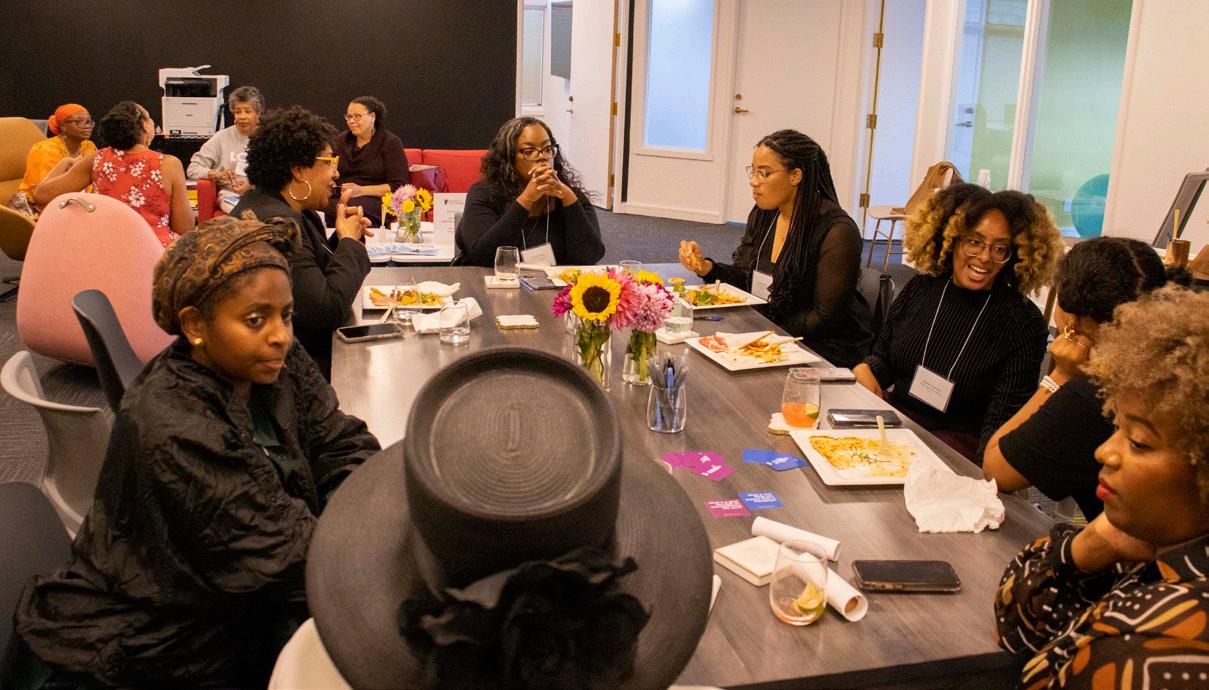
innate and nagging urge to make a contribution to her community.
Lindsay Hill’s grandmother was the first Black woman to retire with a full pension in the state of Oregon, where Black people make up less than 3 percent of the population. Lindsay noted how her grandmother balanced the sense of responsibility that came with the coveted and complex “first” role and being unapologetically herself. She kept her joy and that stuck with Lindsay.
Most of the participants identified their mothers or a maternal figure as the person who helped them become the women they are today. A mother who they’d be in and out of homeless shelters with.
A generous, resilient teen mom who pulled herself out
of poverty. A spirited great aunt who was committed to living life to the fullest.
“There’s no version of who I am, who any of us are really without our families,” said Gisele Shorter, President & CEO, Nellie Mae Education Foundation (former Director of National Education Strategy at Raikes Foundation), who also gave a nod to her grammar school, Manhattan Country School, which was “founded on the principles of the civil rights movement, well before the dream was fully codified.”
For Michelle PurnellHepburn, formally with the Seattle Foundation, it was her whole family, including her older sister and her parents, all of whom were active in the community. Her parents, James and Mardine Purnell were
among ten primarily Black community leaders to pool their resources to establish Liberty Bank, the first Blackowned bank in the Pacific Northwest.
“Lift as we climb was the family motto,” Michelle recounted. Her parents and their partners founded Liberty Bank as a community response to address redlining and disinvestment in Seattle’s Central District, the city’s historically Black neighborhood.
The Purnell-Hepburn family shares their “lifting as we climb” motto with the National Association of Colored Women (NACW, later the National Association of Colored Women’s Clubs), established in 1896. The NACW was headed by giants of Black women empowerment like
anti-lynching activist Ida B. Wells, Tuskegee University principal Margaret Murray Washington, and educator Mary Church Terrell. The women were insistent that their role was as an independent force on the front lines of the struggle for Black and women’s rights, rather than merely a supplemental unit for Black men or white women.
The NACW’s adoption of the term “lifting as we climb” reflected their desire to bring about progress and a better quality of life for their communities, paying special attention to the least enfranchised among them. Like the women in attendance at the Northwest Voice. Vision. Value. gathering, funding programs that specifically protect vulnerable women, improve education for Black
children, and support the professional paths that would lead to solvency for Black women were priorities of the association. While the NACW was the most prominent organization formed during the Black Women’s Club Movement, it was not a single group but rather a collective of tens of thousands Black women in over 1,000 clubs. Similarly, although they don’t belong to the same organizations, the
women at the VVV gathering expressed the essentiality of building community with other Black women in the field.
For Dionne Foster, the Executive Director of Progress Alliance of Washington, the sisterhood that she developed in the field among Black women meant trust and understanding. It meant, for her, a safe space where she knew she could show up as her authentic self and receive support and honesty in return.
“Having other Black women saves you from isolation.”
For Thandi Onami, belonging to a sisterhood of women who understood the Jennifer Roller Sewheat Asfaha

isolation she faced, without it having to be explained, was especially restorative during the seclusion and transition of the Covid-19 pandemic. A sisterhood with people who’ve had similar experiences in similar professional settings means developing teacher/student relationships. This teaching, said Michelle, is a special gift of our culture whether it’s cooking, braiding, or navigating white maledominated spaces. For Sybil Chidiac, the advocacy for one another and pooling of resources that comes with the social cohesion of Black women is a superpower.
In the context of her long career in philanthropy, Liahann Bannerman believes sisterhood among Black women is relatively new. She reflected on a time when the most you could hope for was cross-race support, not necessarily in philanthropy specifically, but in minority rights activism and advocacy. She referenced Seattle’s “Gang of Four,” which were Bernie Whitebear, Bob Santos, Roberto Maestas, and Larry Gossett, who founded Seattle’s Minority Executive Directors Coalition. Casey Family Programs’ Antoinette Malveaux also recalled the activist spaces in the ’60s, ’70s, and ’80s: “It really was a coalition of Black people and other people of color because there just were not enough Black people to put pressure on the system by themselves. That’s the challenge in places like Seattle, because we’re such a small percentage of the demographic. And the disproportionality of the outcomes wouldn’t suggest
that the city is as enlightened of a community as it thinks it is.”
As far as sisterhood in Seattle, where Antoinette’s lived for nearly 20 years, she questioned its existence: “It’s about the cohesion or lack thereof in the African American community.
So how do you pull together collectively as a community, whether it’s a sisterhood or brotherhood, if it’s fragmented.”
She added that, often in the
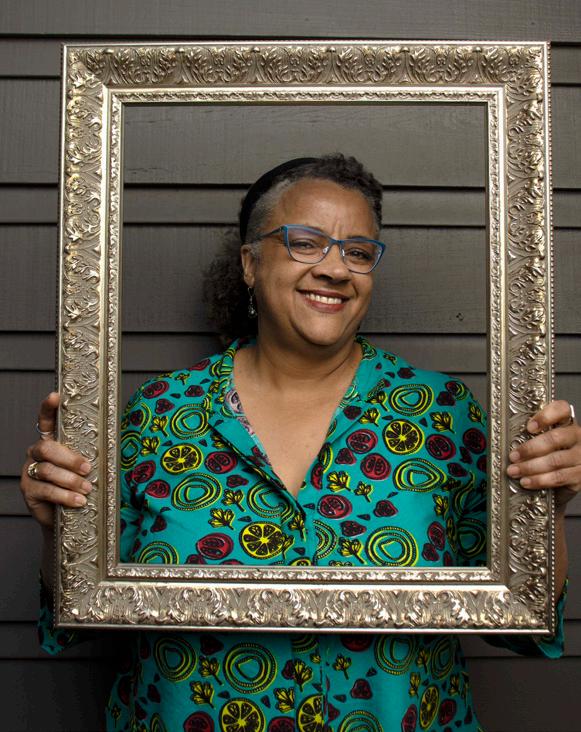
spaces she works, it seems to be harder for Black women to be heard and for their skills to either show up or be respected. For that reason, Black women supporting one another is a necessity.
At Grantmakers of Oregon & SW Washington, Dashiell Elliott learned that her and her intern’s families were from the same small town in Alabama. Coming from a state with one of the largest percentages of Black folks in
the US, intentionally building community with Black women was both a challenge and a necessity.
“To have someone be able to check up on you, to rejoice and cocreate, it’s a different level of love. I hope more Black women are able to have it. This meeting feels like sisterhood,” she said, gesturing around the room. “I’ve never seen this many Black women together in Seattle.”
The event, that day, was a balanced blend of Washington/Oregon
natives and women outside the region. In the Pacific Northwest, the Black population is small and concentrated, with over 71 percent of Black Northwesterners calling Western Washington home— all but one of the top 30 Blackest spots in the Pacific Northwest are located around the Puget Sound. Still, data shows that although Seattle boasts the largest population of Black residents, by far, other areas have larger shares of Black residents and they’re routinely overlooked. In response to this lack of attention, Shona Carter’s work with The Black Future Co-Op includes going on listening tours to find organizations and efforts to invest in, in areas where Black people don’t have advocacy such as
Clark County, Washington. The Black Future Co-op Fund, launched in June 2020 at the height of the demonstrations following the police murders of George Floyd and Breonna Taylor, is Washington’s first cooperative philanthropic organization created entirely by and for Black people. Headed by Senator T’wina Nobles and three other founders, the fund gives unrestricted grants to Blackled projects and projects that serve the Black community. Entering philanthropy in the Bay Area two decades ago, Shona Carter witnessed the “redlining of giving,” which refers to Black communities receiving only 1% of philanthropic giving.
Acknowledging that she entered the field intimated by wealth and the white male presence, she soon learned to lean into her power.
“You have things that no one else has. You know things no one else knows. That knowledge, that experience is currency,”
Shona said. “Once I began pulling wealthy people toward the communities I felt they needed to invest in, I wished I’d started earlier.”
To simplify getting money into the hands of the under-resourced and timestrapped communities they’re looking to serve, many of the women took aim at reporting requirements.
Azuredee Webb, formally with Marguerite Casey Foundation, noted they mostly fund organizations
that support communities of color and they don’t require reporting. Doing away with reporting is a move more progressive funders are embracing, asking people to fill out dozens of pages of paperwork to justify their existence is increasingly viewed as burdensome and unproductive.
“Would we have asked Harriet Tubman to fill out a progress report on her work running the Underground Railroad?” C’Ardiss “CC” Gardner Gleser asked laughingly. Before departing Satterberg Foundation in 2021, CC successfully compelled the foundation to commit $50 million over 10 years to support Black and Indigenous-led work. She was also unequivocal about her goal to push Satterberg to fund the healing of Black people, whether resting,
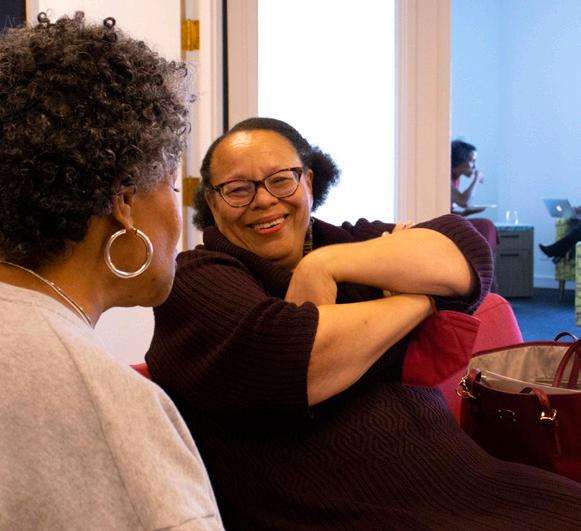
traveling, or having financial freedom to focus on passion projects. Succeeding at this endeavor is the professional accomplishment she’s most proud of. She currently serves as Board Trustee for Andrus Family Fund.
Like Lindsay Hill, who views essentially all of her work through the lens of reparations for Black and native women, most of the women shared a primary motivation for their work: getting more money in Black women’s hands quickly with few strings attached. Ishea Brown who’s on
the communications side of the process at Pivotal Ventures agrees, furthers that mission through ethical and humanizing storytelling.
Telling the stories of the grantees and the impact the support has on their lives, helps to shift the work from data-centered to human-centered. While Ishea had her mother as a model, and Catherine had hers, Catherine stressed the importance of enduring through the struggles of advocating for our communities in the name of those who came before us who had no blueprint. She wants the next generation of women doing the work to adopt that sense of duty and responsibility.
As the women bonded over both the unique and the similar details of their experiences as Black women
in PNW philanthropy, they reflected on the lessons they learned and the wisdom they wished they’d possessed earlier. For Michelle PurnellHepburn, being herself in her professional life was one of the hardest skills she ever had to master. Not embracing her full authenticity required her to shrink herself, code switch and conceal certain facts about her life like her being the lead singer in a rock and roll cover band.
Dionne Foster noted that doing political work is a completely different kind of change work—a space that is particularly toxic and one that demands an elevated level of dynamism. Unlike other types of change work, donors regularly don’t want visibility because of the stigma of and responsibility attached to various political efforts. She expressed a
hopefulness that monied figures would learn to be more brave in their advocacy and more comfortable with their vulnerability. For her part, she reminds herself that “the work” can’t be everything and that it’s not only okay but imperative to be intentional about rest.
Before Azuredee Webb landed at the Marguerite Casey Foundation, she was the only person of color in most places. Although that isolation can be discouraging, she would have advised her younger self to be patient— she wished she’d known earlier that her career in philanthropy would be a marathon with a slower than expected trajectory.
“You have to be creative and innovative, be
who you are, be true to yourself no matter what. You have different perspectives and a unique voice. Your voice is bringing value and contributing a new perspective,”
said BMGF’s Sybil Chidiac whose most valuable piece of advice to young women would be to plan but be flexible and unafraid to pivot in order to seize opportunities as they come.
For Gisele Shorter, the trick to navigating the world of philanthropy is maintaining a broad, diverse network of friends and co-conspirators, that you support and learn
from.
“There is so much to be learned— outside of research, practice, and policy— through aligned efforts across various areas of focus. Climate justice, racial and social justice, economic justice,” said Gisele, emphasizing the power of volunteerism, community-based work and organizing, that’s separate from our day jobs. “You know, when Fannie Lou Hamer was standing in service of voter rights, she had already been organizing around food
insecurity. There’s no version of what it means to be Black in America, where we are divorced from these other issues.”
C’Ardiss “CC” Gardner Gleser wishes she’d known that she was loved and had more community and support than she realized. She theorized that perhaps if she’d been more aware of her support system sooner, she would’ve been bolder. Once she learned this, she felt free. This was also the understanding that empowered her to eventually leave when she felt like the time was right. After years of working at her organization, she’d hit a wall and was burnt out. It wasn’t so much the thought of leaving her employer that held her captive but rather the thought of not being in the position to help her
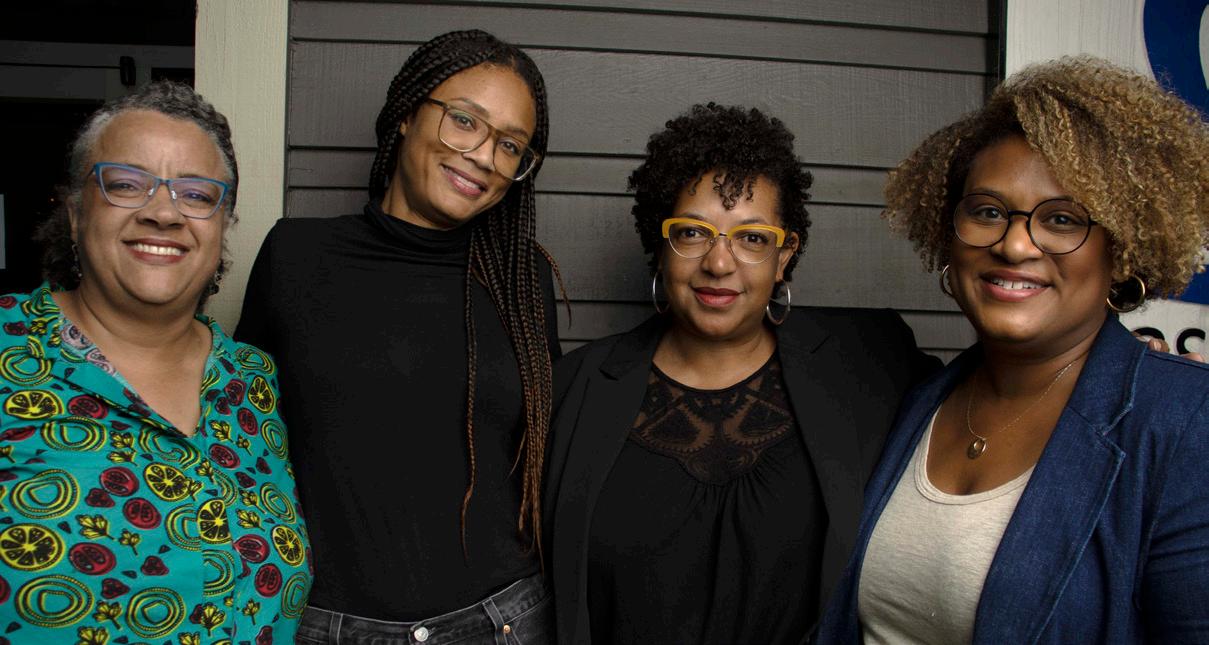
community.
“I worked AT my organization but I work FOR my community. I was worried about leaving and not being an advocate for the community.”
For many of the women, feeling a personal responsibility to advocate for their communities is what drives them to or keeps them in this work. As Black women, they understand clearly that part of their specific role is to be the
conduit for the voices of many other working-class Black women whose ideas and voices are historically overlooked in philanthropy.
Sometimes the other women they’re advocating for are actually different versions of themselves. Dashiell Elliot spoke about the value of walking into these spaces with our past selves so they, too, can experience those moments. Some people have the money that will help solve certain problems and some have wisdom
and relevant, unique life experience which is just as valuable and essential. It is a profound yet evident notion that utilizing the everyday, underappreciated knowledge of Black women will move us closer to the solutions our community’s face.
The women expressed wanting those coming up after them to be empowered to ask for help, to build resilience strategies, identify their resources, and lean into
optimism. They want future generations of Black women in philanthropy to remember why they’re doing the work, remain clear on the fact that they’re making decisions for younger generations, and develop clarity on the futures they want to leave.
Jennifer Roller Ishea Brown

“We’re Black women. Even if our work doesn’t work today, it will ripple,” said
Liahann Bannerman, who revealed she didn’t know what philanthropy was when she entered the profession. If she could go back to the beginning she would have been more deliberate about her path and spent more time doing versus strategizing. Even if that required starting over again and again.
“Our
offices are not where community happens. Community isn’t site visits. Community happens outside, in the places where those most impacted are centered.”
“Not everyone will have the same values as you,” added C’Ardiss “CC” Gardner Glesser. “Too many of our people who make it in philanthropy try to get our communities to conform to the flawed system versus trying to change the system from within.”
“I think there is a need for more structure and a more formalized network,” said Antoinette Malveaux who advised the next generation to take it upon themselves to organize, come together and support one another. “I feel like everyone’s out in their own world doing their own thing. They’re supportive of one another as they come across each other, but they’re not necessarily pulling together in the same direction around causes.”
This, Antoinette said, is why what Toya is doing with VVV and ABFE is phenomenal: “I think what she’s done fills a void. Women return from the ABFE retreats rejuvenated in spirit and connected with their network of other women in the field. I think more of those kinds of things are important and necessary.”

There was a general consensus among the group about the most valuable piece of wisdom that they could bestow upon those making their way in philanthropy: find your tribe and hold onto them. Although she remained physically in Harlem, Gisele Shorter’s fortuitous meeting with Lindsey Hill of Threshold, initially as a Raikes Foundation grantee,
changed her relationship with and understanding of philanthropy.
Gisele recalled Lindsey opening her eyes to what philanthropy could be—a trusted space where she could be in partnership with those that were not only moving capital, but were able to “stand on the balcony and look across a field to understand what was working and for whom. What were
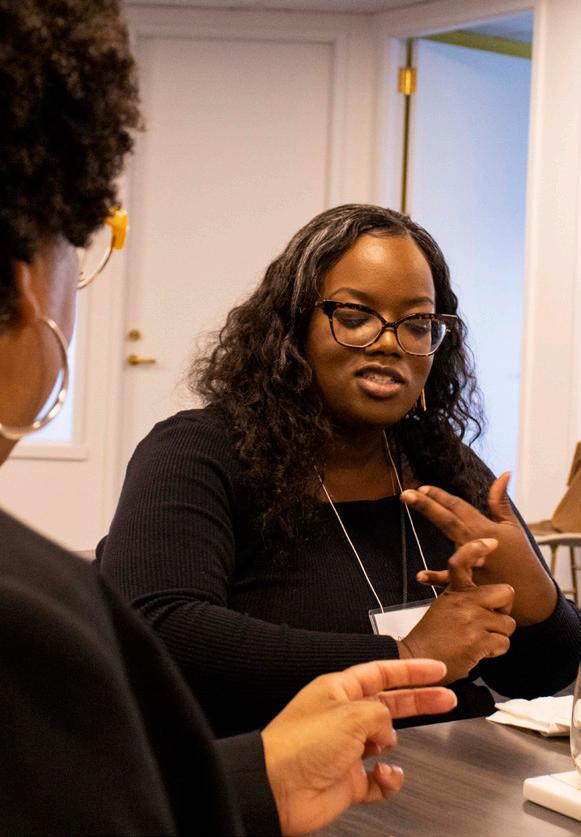
the paths and resources that are proving successful? Like, for example, the Kingmakers of Oakland back when they were Oakland Unified Office of African American Male Achievement.”
“The ability to ask those kinds of questions and be, not just in thought
partnership, but acting as coconspirators to put me in touch with people who were moving the needle, to understand what was producing results,”
said Gisele. “That was a very different level of engagement with philanthropy. It was a conspiracy of care that those women invited me into.”
As for Lindsey, the event’s gracious host, the radicalism of her vision is rousing: “The world is on fire and philanthropy has become about putting out tweets, and I couldn’t be a part of it anymore. I was asking
myself, why was I still having to justify my humanity with a smile on my face? Why doesn’t philanthropy fund individuals directly? Why does philanthropy cause harm with 95 percent of its money in the stock markets then pretend to clean it up with the remaining 5 percent?”
There seemed to be a belief coursing through the room that the work they were collectively involved in had the power to change the world and heal communities most in need of care, despite the current limits of philanthropy. And that the women in that room represented the people with the power to radically shift the practices to make that change possible. As reflected in our roles in our families, the way we’ve traditionally functioned in
our communities, and even in our voting patterns, it’s clear that Black women possess a heavy inclination toward equity and progress. This inclination, I believe, is motivated by the same understanding, suggested by Paula J Giddings in her academic testimonial “When and Where I Enter,” that motivated the NACW club work of our foremothers, which is that Black women are and have always been acutely aware that our fate is bound to that of the masses.

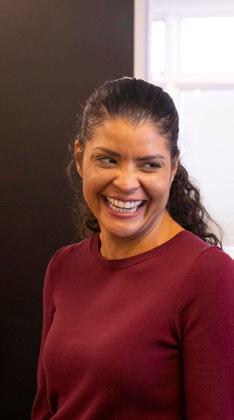

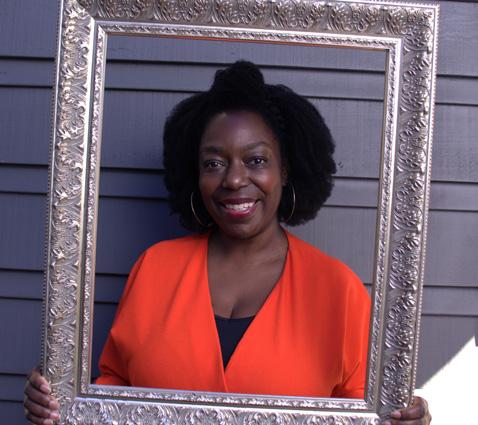
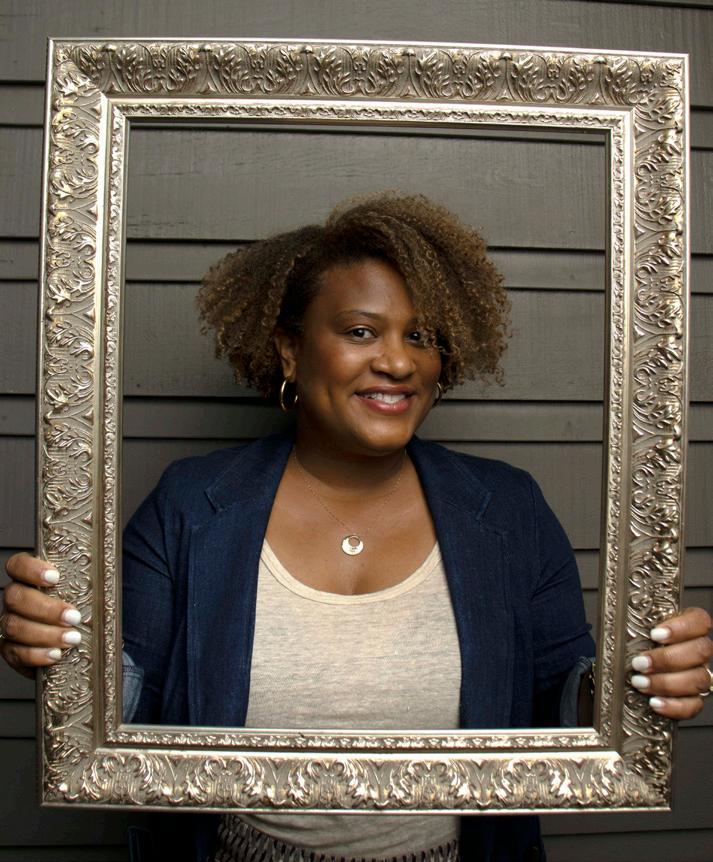
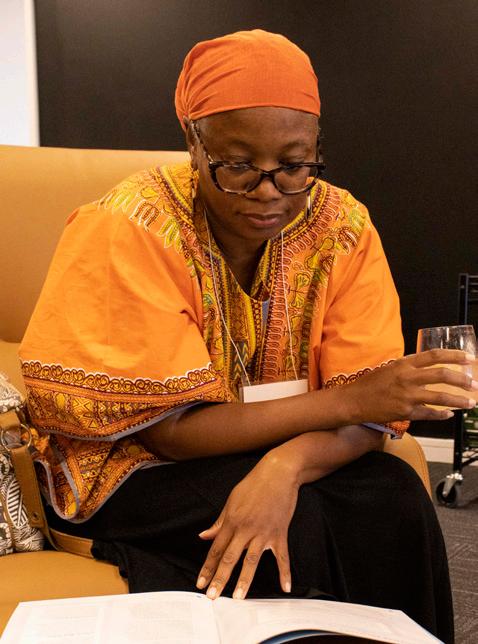
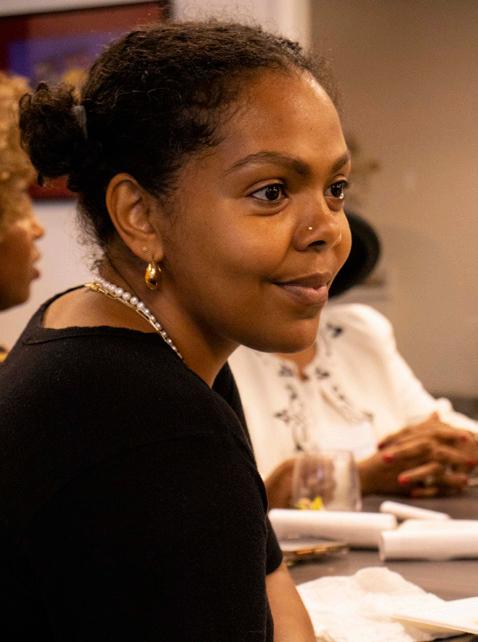
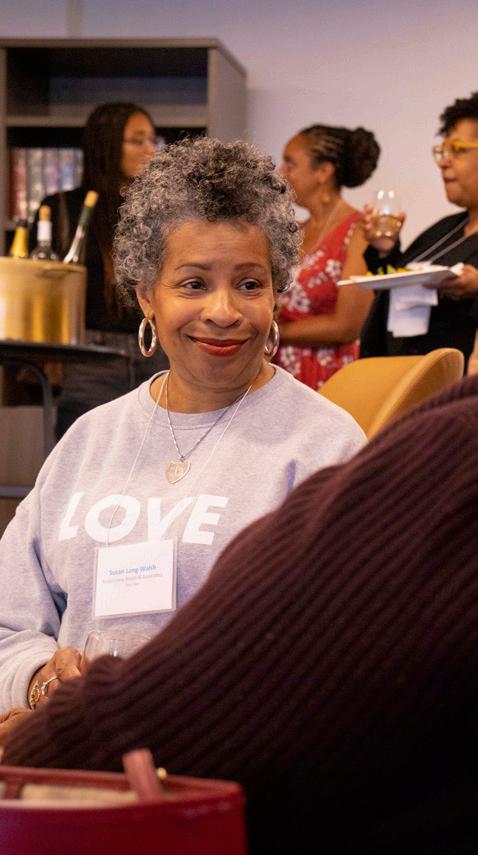
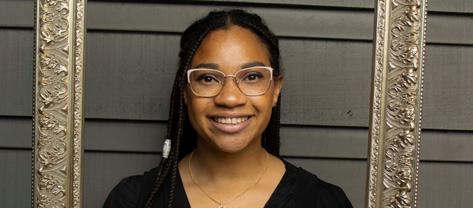
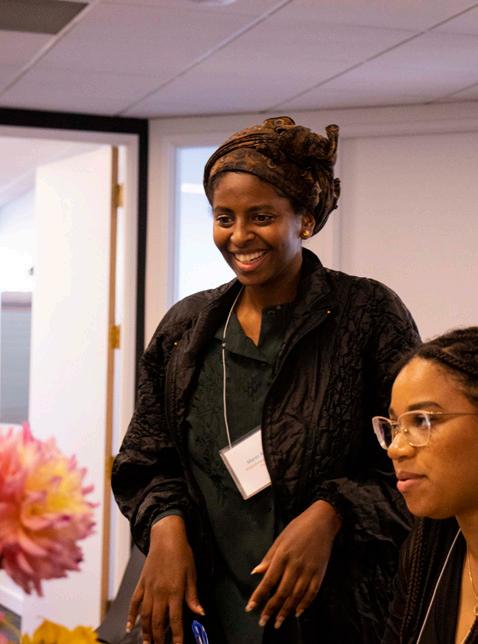
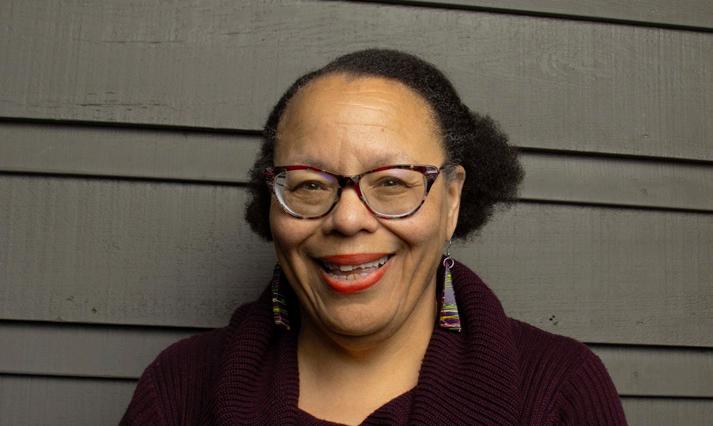
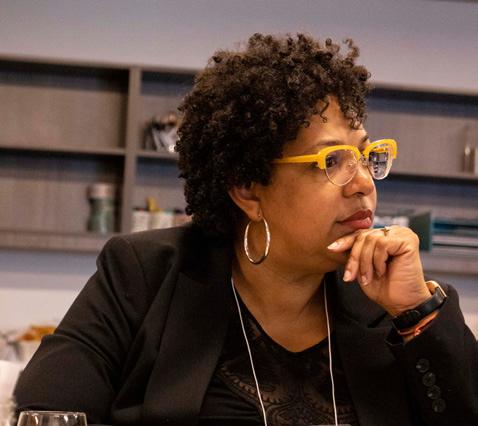

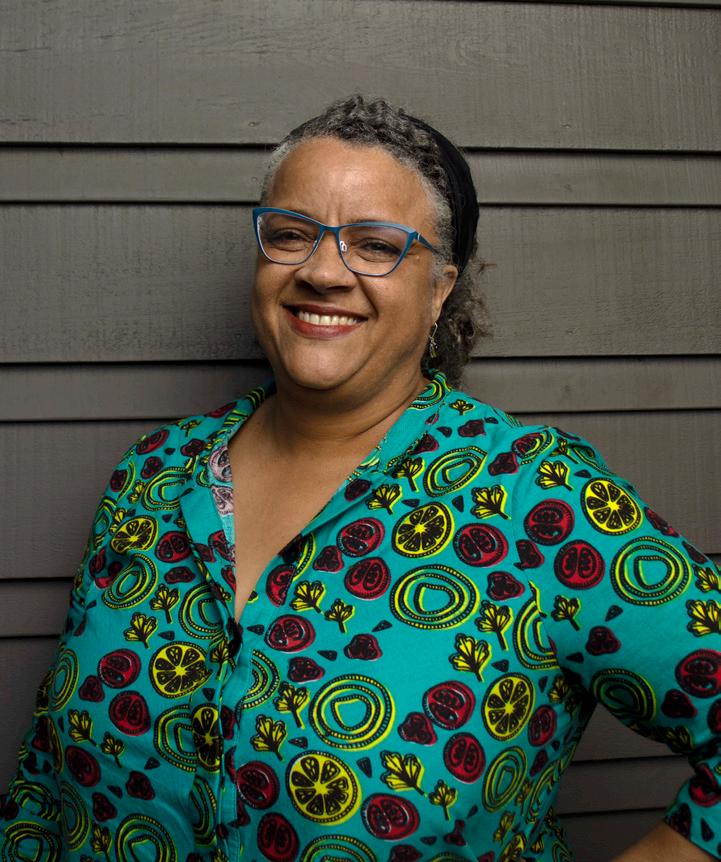
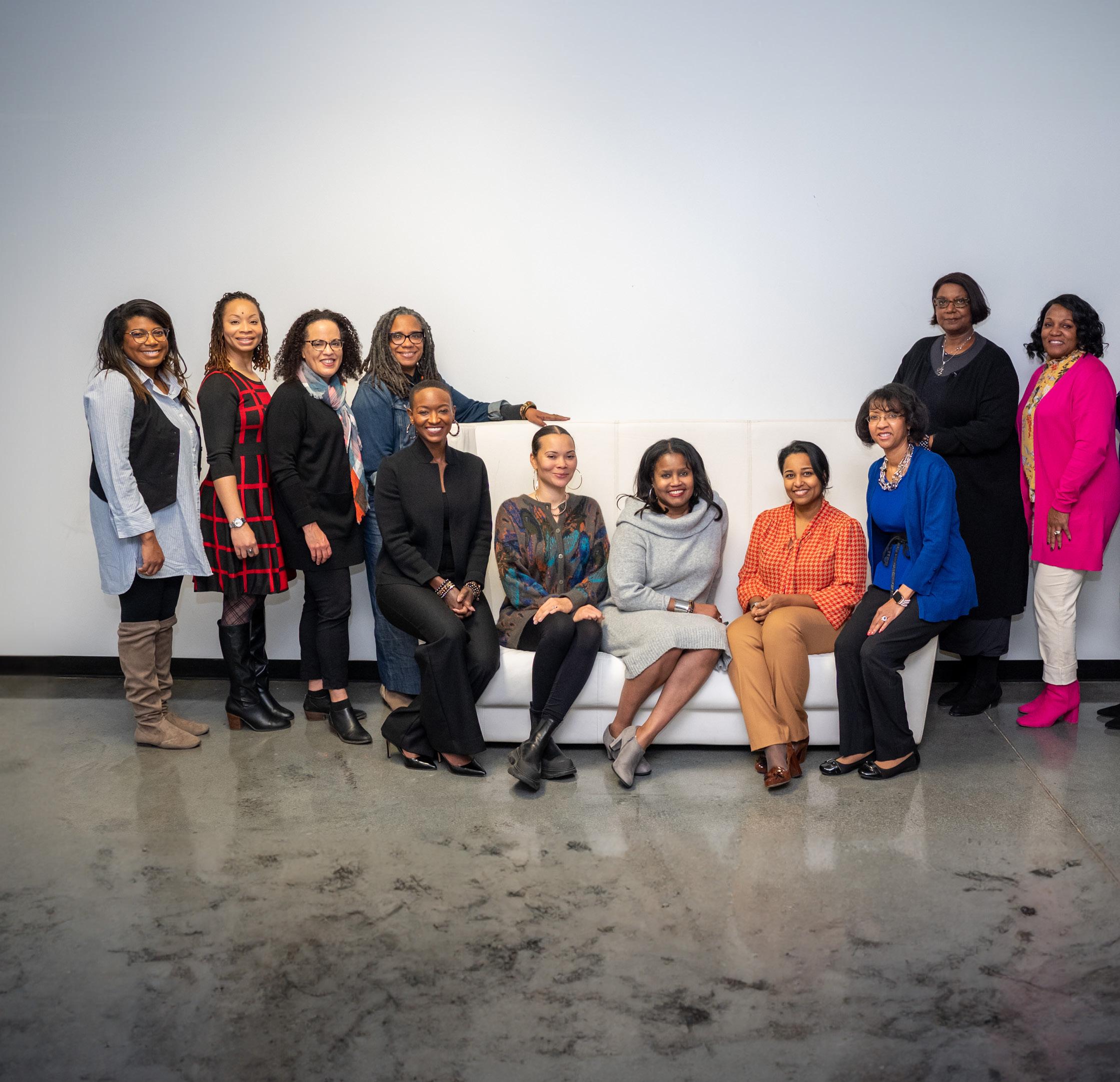

Traci O’Neal Ellis, Writer
Ruth Ramsey, Recorder
Danielle Miles, Photographer
On a cold and rainy December evening in Kansas City, Missouri, Black women gathered for something much more impactful than
they ever imagined. Despite the unpleasant weather outside, the temperature inside was warm, welcoming and cozy. As several of the foundation leaders in the region, they came together to participate in the Voice. Vision. Value. sponsored discussion about the “occupational hazards” of being Black women taking up space as leaders in philanthropy; to celebrate the joy of sharing a few hours of uninhibited and unfiltered conversation outside “The Gaze” that so often shuts us down, denies our experiences, marginalizes our leadership and unthreads the last fibers of our humanity it can find to unravel; and perhaps most importantly, to validate each other through shared lived experiences, by pouring out wisdom, and letting each other know “I see you” and “I got you.”
As is often the case in a room full of Black women, strangers quickly become sisters over good food and good conversation so it didn’t take long to kickstart a dynamic conversation.
“Whenever there is a Black woman in a space, she is often leading in many ways from behind, out front, within, internally. We are in and we know what we have to do.”
Qiana Thomason, CEO, Health Forward Foundation
Yet, every single woman in the room acknowledged that many times, they have felt unseen and unheard
professionally, despite trying to speak up. These women essentially described being “disappeared” in plain view by gatekeepers, “The Gaze”, and other machinations operating in foundations that were unsurprisingly similar among the women. But rather than dampen the conversation, as the women shared how they find the courage, the power, or the intestinal fortitude to stand in their respective spaces, the conversation was incredibly compelling and passionate. The women paid tribute to other strong women in their lives, they affirmed their own power, they acknowledged those who mentored and poured into them, the Black women who went before them professionally, their ancestors and their Godgiven power. There was no ego in the room. Rather, with gratitude and humility, they
acknowledged the shoulders of others on which they stand. In other words, Black women affirmed other Black women.
Chan Brown from the Kansas
Health Foundation really summed up this part of the conversation well when she said,
“I can stand in the space because I know I’m not standing alone.”
Hand claps. Finger snaps. Head nods. Everyone cosigned this.
We are not standing alone. Working in philanthropy often feels lonely, especially when we are the “only one” or “one of few” or we (for the nth time) try to advocate for or explain racial equity.
But the women recognized that there is power and camaraderie and sisterhood in standing together, in intentionally making the time and effort to reach out to each other, within the same foundations, and across foundations. There’s rarely healthy affirmation for Black women in the hard work of trying to redirect philanthropic resources in racially equitable ways to save our communities. We are deemed divisive, noncollaborative, and so many other things; everything but right. Imposter Syndrome might be a personal beast some of us carry, but it is well-fed and well-groomed inside philanthropy. Sometimes the only way to know you’re not crazy is to talk to another Black woman. We will either gather each other together and re-direct and correct us in love OR
more often than not, we will commiserate with each other about all the bs one of us is specifically enduring, while pulling from the overflowing files of similar experiences to provide wisdom and advice, affirm our brilliance, put the crown back on our head, hand out a tissue, and fresh makeup, and send us back into the fray armed with the certainty that “what they not gon’ do’’ is, in fact, the quiet part that must be said out loud and we’ll help each other nail how to deliver that message “with all due respect.”
Part of the additional beauty and power of this gathering was the collective retrospection shared. Hindsight is casually said to be 20/20, but in reality, it can often be pretty blurry without someone prompting us to be more thoughtful

about lessons learned and wisdom earned. In fact, someone once said that “wisdom” is actually only “knowledge” until it’s applied. So, these women took time to talk to their younger selves in really deep and meaningful ways, which ultimately resulted in sharing their hard-earned wisdom with one another.
For example, several women in the room related to Denise St. Omer, former Vice President, Grantmaking and Inclusion Initiative, Greater Kansas City Community Foundation who shared that she would tell her younger self not to center her decisions around the
expectations of others:
“Just have the courage and passion to create a space where I truly know myself and know what’s best for me.”
Denise was appointed founding Executive Director of KC People’s Fund in July 2023.
Additionally, Miles Sandler, Director of Policy and
Engagement, Ewing Marion Kauffman Foundation brought tears to some eyes when she shared that she would tell her younger self “to not invest in any type of shame, that it’s a useless pursuit. Celebrate mistakes because they help you grow and stretch.”
My takeaway was to give myself more grace. Black women are often so hard on themselves. We magnify the size, scope and impact of the smallest mistake, while often minimizing the very same in our greatest accomplishments. We have to say “duly noted” to our mistakes and address what might need repair, but Miles imparted wisdom in advising us that investing in shame is a useless pursuit. It clearly hit home for some women. Release the shame ladies. It
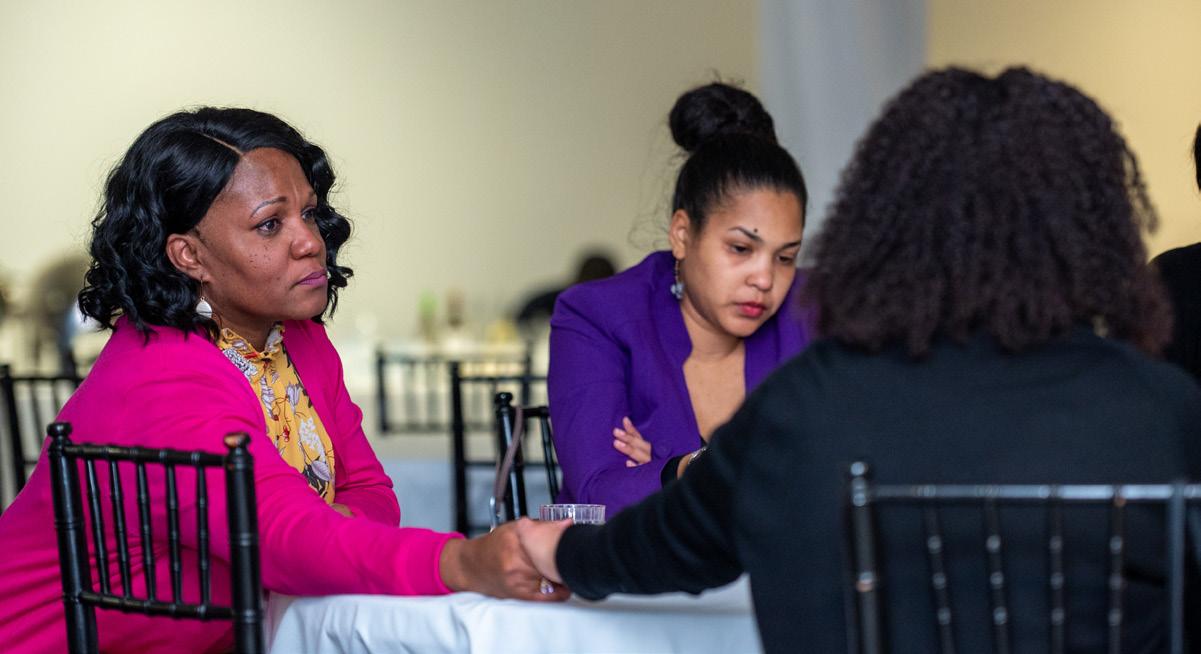
holds no value.
Trust Black Women. We say this often to white people (especially white men) as we demand to be seen, heard and respected. But, Donna Bushur, Impact Strategist, People, at Health Forward Foundation made an excellent point about trusting ourselves. Her advice? “Trust yourself. Trust your gut. Trust your heart.” It’s profound in its simplicity. Black women— we must trust ourselves (and dare I say…each other?) with as much, if not more, conviction as we demand that others trust us.
This point segued perfectly to a discussion about why “Black Sisterhood” matters in the Midwest. Hayat Abdullah, Director of Community Impact, Health Forward Foundation, poignantly spoke to this:
“I was just talking to my colleague…about how we carry our Blackness for each other. I mean the color of our skin, when we go somewhere we represent our community. It reminded me of my thoughts when something bad happens in the community, you listen to learn the name, the race. I find myself saying, “I hope it’s not one of us.” We’re so afraid of failing because there are not that many of us. So, being in a decisionmaking position is a huge responsibility, but it’s also a responsibility of all of us to be supportive. We have to take care of each other.”
Everyone agreed with one woman who said for those who work in primarily white spaces:
“…being able to connect with the collective genius of
Black women in philanthropy allows us to take off the masks. Over the last couple of years, I’ve seen the physical, mental, emotional, and spiritual toll on us. Sadly, we don’t even realize it until we’re at a point of exhaustion or breaking. This type of gathering is precious—we get to be real, vulnerable, authentic, and honest.”
So what happens when exhausted Black women get together, bring our collective Black genius, take off the masks, and are real, vulnerable, authentic and honest?
First, tears. Not sad tears, but a “letting down” or “release” if you will, of all the weight of being a Black woman in hostile spaces that we carry around with us all day long. Eventually, it becomes a part of us that

we sometimes fail to notice we’re still carrying because we’ve been heaving it around so long, we don’t recognize it as a foreign object.
And then? The collective strength that builds each other back up. Straightening our backs. The fixing of our proverbial crowns. Removing that toxic, burdensome “Superwoman Cape.” The reminder of who we are, where we come from, what
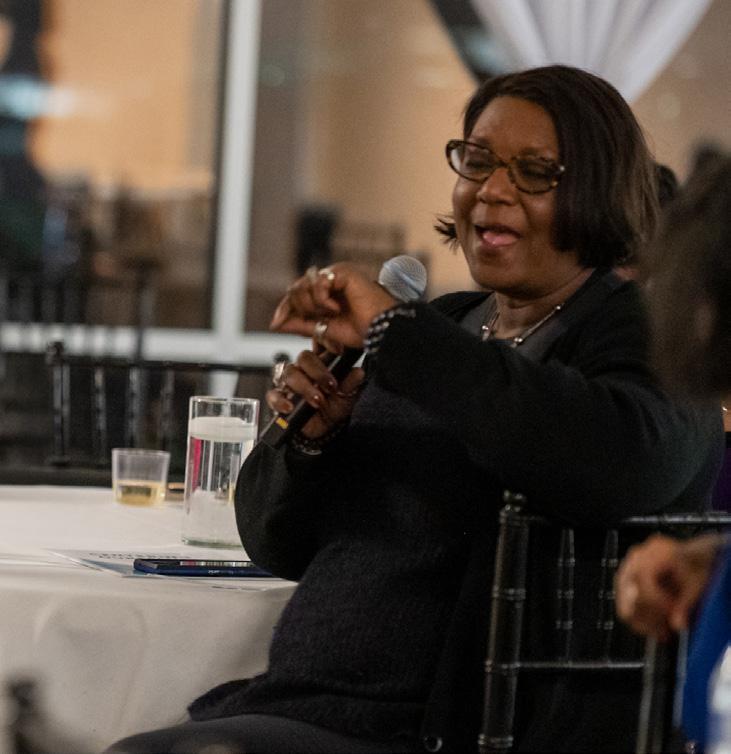
we’ve been through and will yet still get through. Together. All of this happened both figuratively and literally, in multiple ways in that space that night. And just when you thought it couldn’t get any better, it absolutely did. In the most powerful, completely unscripted, and definitely unplanned moment of the night, the women in the room who work for
Qiana Thomason, CEO of Health Forward Foundation (and some who don’t), specifically called her out as the epitome of the reason Black sisterhood matters and why they are thriving in philanthropy. They openly lavished Qiana with love and affirmation for her leadership that empowered them, made them feel seen and heard in ways that they’d never experienced before and named her as a critical part of their success. Some of them said it better than I can describe it:
“This is the first time outside of my adolescence that I have felt free, or dang near free! I mean not only in this space, but in my work environment at Health
Forward specifically. I’m grateful for that environment and the culture that’s been created that allows us to
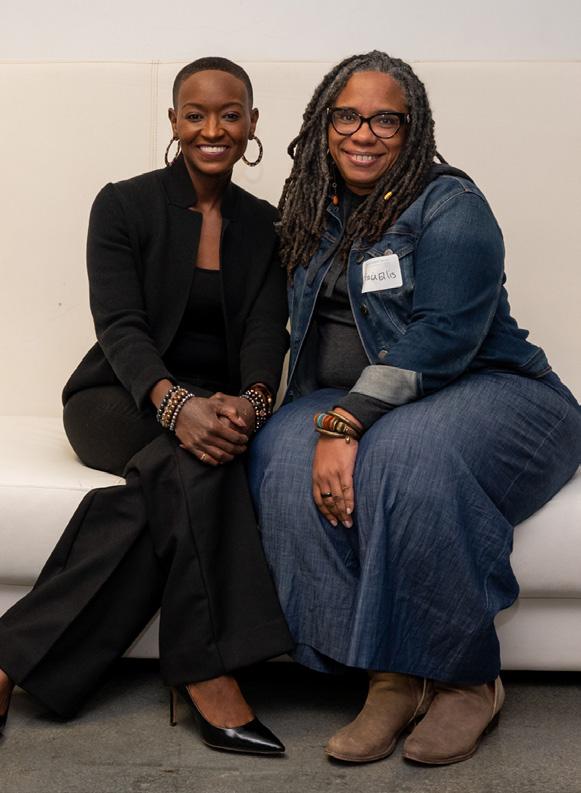
just be us. A lot of effort is made to identify strengths and let people exist and thrive in those strengths. It’s a euphoric kind of work experience that I didn’t even think was possible. The beauty that comes from that is you’re able to create and co-create with like-minded people in our space. It is so reassuring, it’s beautiful. I wake up in the morning, and I’m excited, and I get to work and I’m excited. I’m excited
every moment and just grateful that I get to do this work.”
***
“I’m used to working in all-white environments or where there’s only one or two of us. What I appreciate about where we are now, particularly at Health Forward, and what I noticed today looking around the room, is regardless of whether we agree or are always on the same page, what I have never had to do is to justify my Black experience. And I’ve never felt the need to ask that of anyone. That’s a new place to be where when you come to work—you don’t have to explain where you are. You’re around people who just understand what that is. And I appreciate that.”
“I will tell you, sometimes the mass of Black women doesn’t really equal to unity… Being among a lot of folks of color has not always equated to unity because sometimes we are intentionally pitted against each other. The culture has reaped a lot of horrible things. So, I just celebrate the intentionality that Health Forward is moving in and the honoring of each other’s crown, your power, your beauty, your strength, your intelligence, all of it, because it is about intentional leadership. Qiana, you have honestly set that tone, so please take those flowers. It does not exist every day.”
Overwhelmed by this impromptu tribute to her, Qiana responded: “At Health Forward, I know that my sisters have each other. Even when we don’t always agree,
we always have each other. I’ve cried, I’ve prayed, and I’ve cussed with several of them. There are days where I am discouraged, where I can look in one of their faces and I’m okay, because they’re there.”
These ladies also paid tribute to themselves by acknowledging the many ways in which they have advanced racial equity. They shared about naming the harm that has been done to Black communities in the name of philanthropy, about intentional leadership that leaves no stone unturned to find talent and give them voice and influence to advance racial equity; being unapologetically Black. One notable quote on this topic:
“So, we have advanced racial equity, by having the courage to stand there and
make people have those conversations. We drive racial equity because we feel unity and the connectedness to our community. We’re in positions where no matter what position you’re in, you have some level of ability and responsibility to take care of each other. That’s how we advance racial equity.”
And finally, what about the women coming up in philanthropy as the next generation of leaders? The women in the KC region imparted wisdom for them as well. They want these young women to know that they may sometimes feel like they have to fall back, but that this work is a constant dance and to keep pushing. They want them to know that it is ok to sit at the same table in the cafeteria, to gather together, to openly celebrate each other and to be the
“philanthropic mafia for each other.”
A former high school track runner stated; “You have the baton, run your race. You are more, way more than you know. Hold one another up and take good care of yourself so that you can finish the race.”
Notably, the next generation of Black women in philanthropy were cautioned: “Never allow yourself to internalize any kind of white supremacy mindset that causes us to compete with each other or see ourselves as
competitors…move through this space in a spirit of love and support, always asking what can I do? How can I help?”
So often, much is said about all that is wrong with Black women. We are over-critiqued and always found lacking. We need more experience, or more polishing, or more patience, and less passion. But whatever the number of negative narratives placed on Black women by others, it was clear this night that when
the conditions are right, we rip off masks and we bring the brilliance. We bring love. We bring strength. We bring courage and power. We don’t compete with each other because we demand that all of us win. One of the women said it best about this night:
Jennifer Roller Denise St. Omer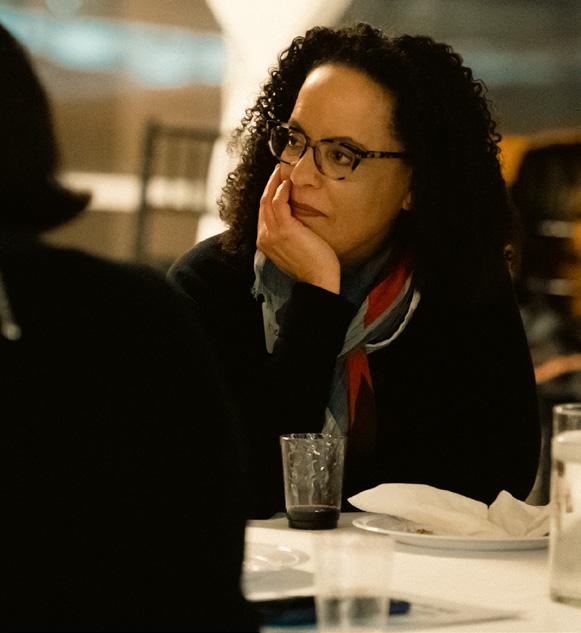
“I have never seen Black women stand in their power and nurture, and give so much, while filling their own cups.”
By the time the evening was over, every woman there understood the assignment at their respective Foundations: Take up space sis. Black Sisterhood Matters. The Kansas City region is ready.
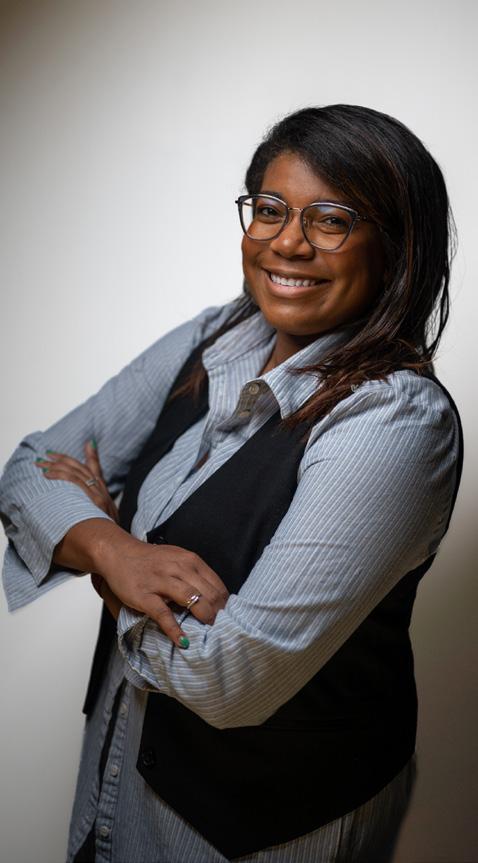
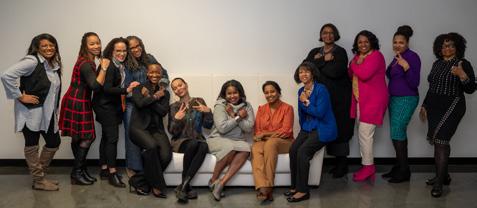
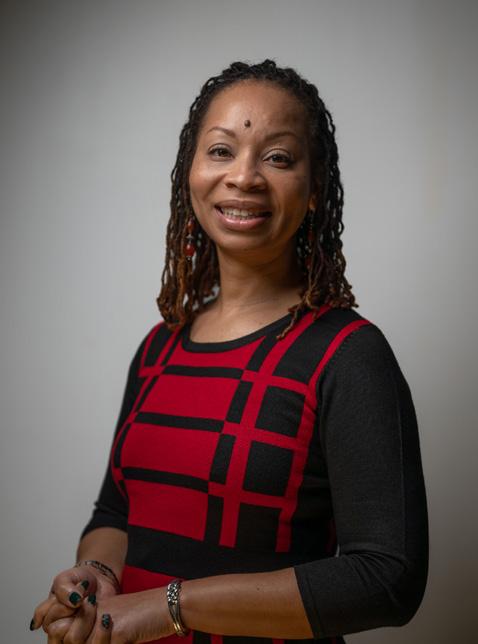

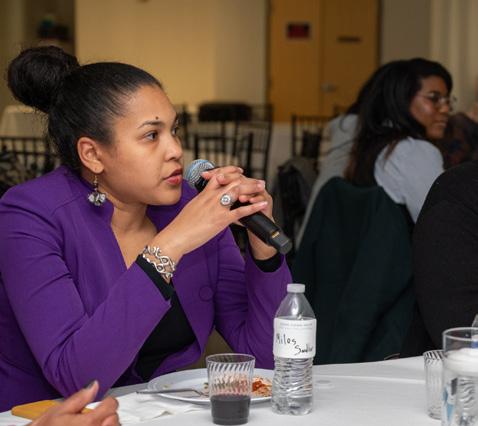
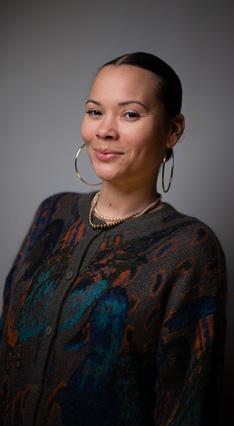
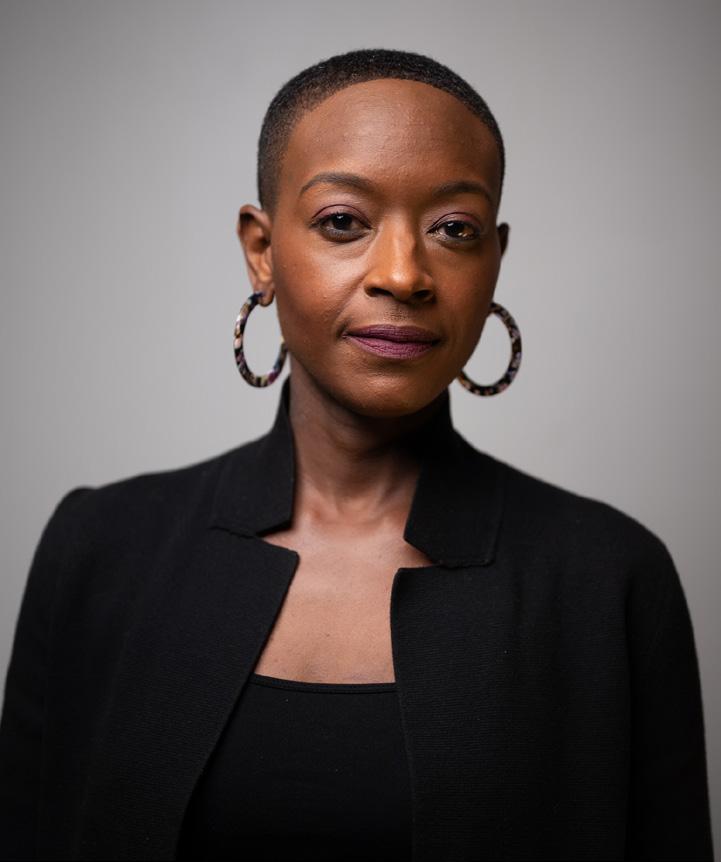
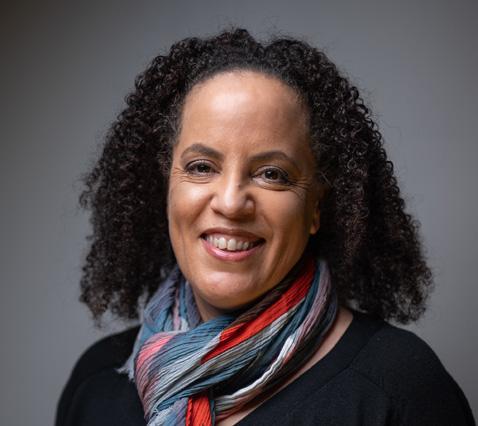
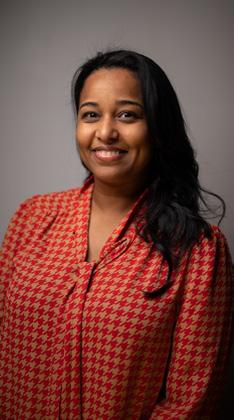
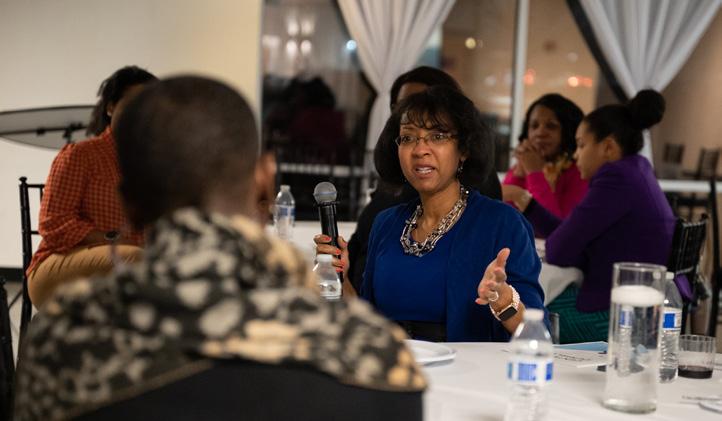
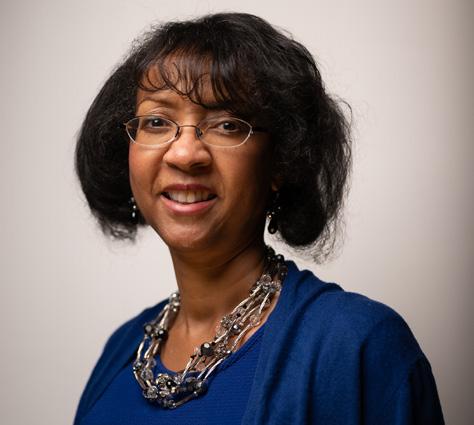
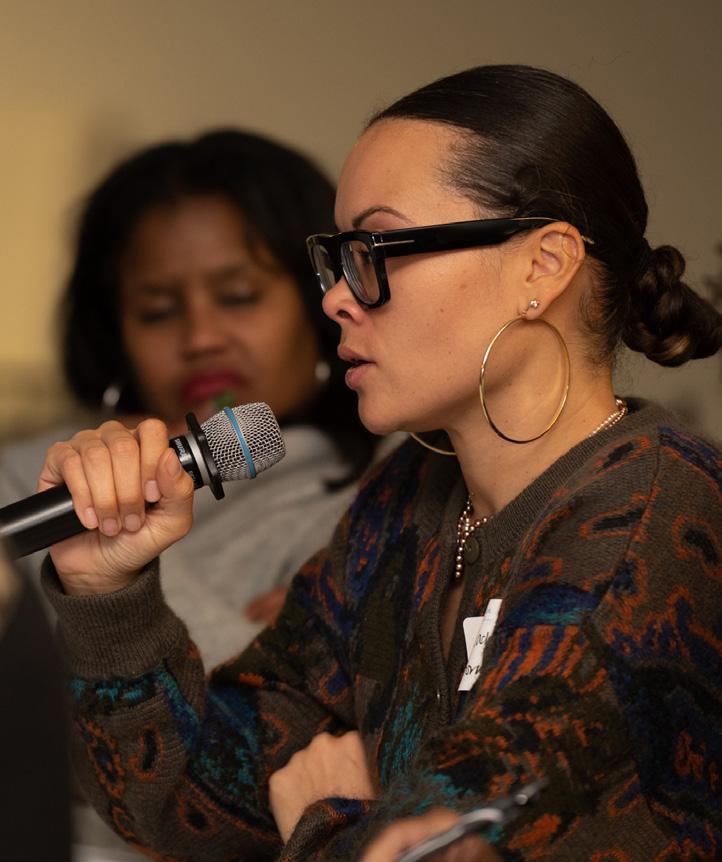
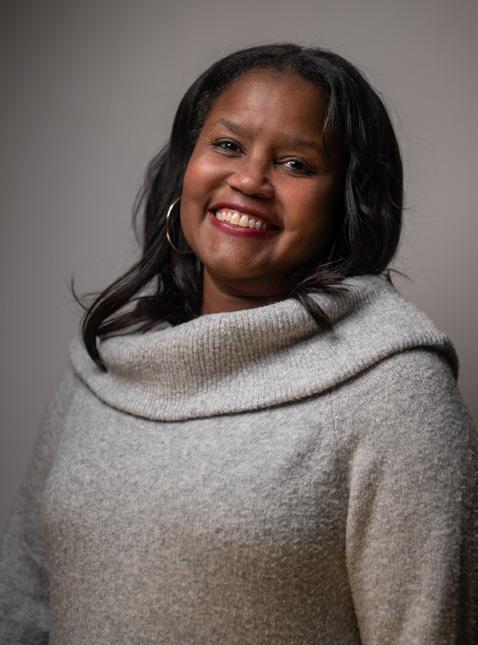

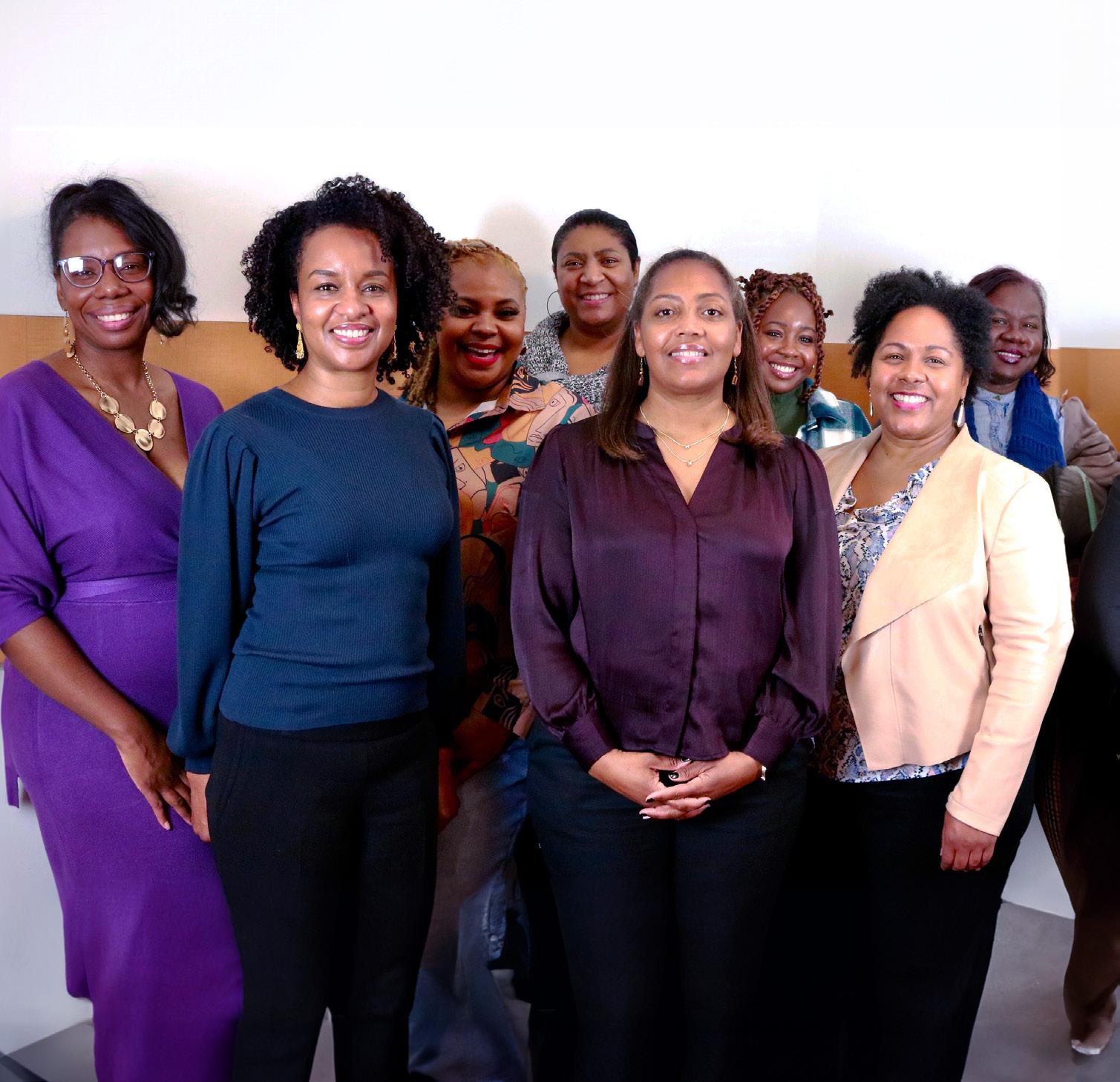
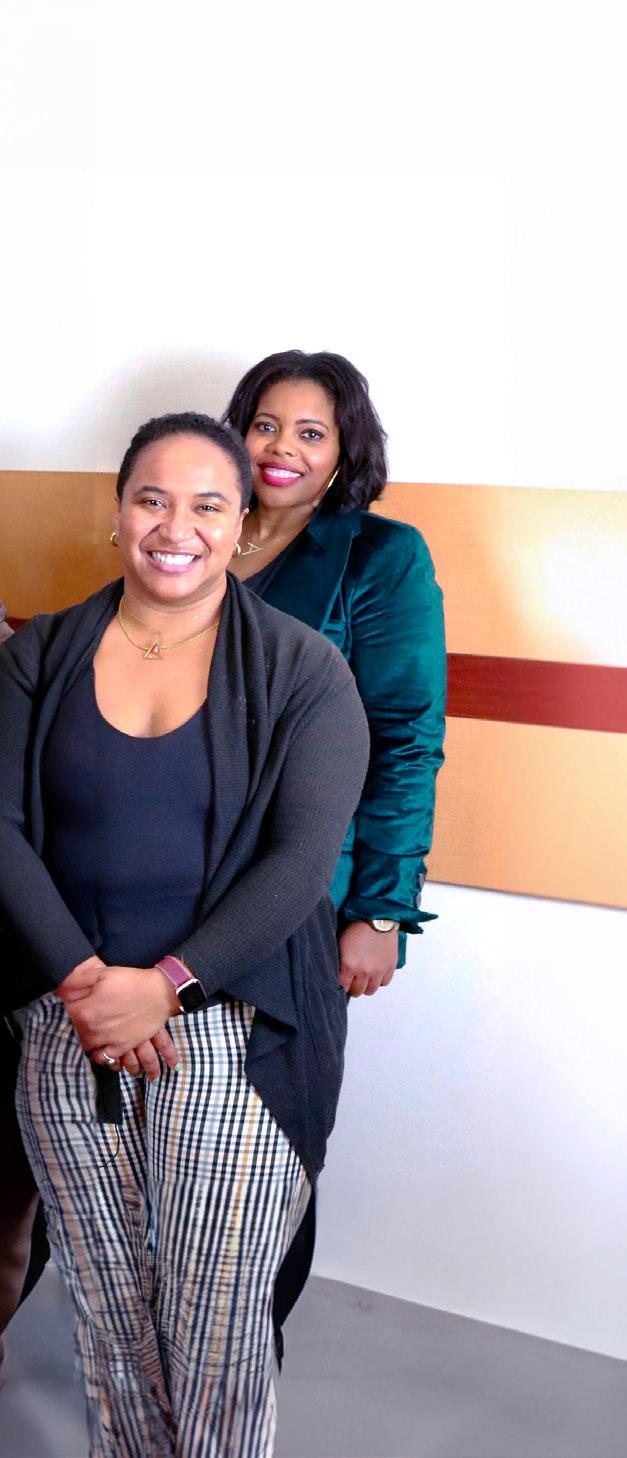
“Toya had this vision: how do we hone in on and codify the experience of Black women in philanthropy? Our impact, our experiences. She’s taking this book project across the nation to other regions, capturing the voice of Black women,” President and CEO East Bay Community Foundation Brandi Howard, explained, addressing the Voice.
Vision. Value. Oakland mixer crowd.
Giving the women background on how they came to be in that space that evening, Brandi spoke about ABFE: “We’re coming up on year 10 of the Black women in philanthropy retreats. In 2014, Susan Taylor Batten, Toya Nash Randall, Gladys Krigger Washington, Sherece West, Karen McNeil Miller, these beautiful women created this beautiful event. It was the most helpful space I’ve ever been in. One of the most powerful spaces and opportunities to experience Black women in their full power in a way that I’ve never experienced in any other sector.”
“It’s a place where we can pull all the complexities, the multiple truths and still come out in a way that we are
hailed and uplifted. And so I’m a true ABFE fan.”
When she got the call to host the Oakland mixer she immediately thought “if you’re gonna come to the Bay Area and talk to Black women in philanthropy, you have to talk to Summer.”
In meditating on the proverb Ubuntu, and considering who helped shape the woman she is today, Summer Jackson of the Black Funders Network (BFN), named her great aunt Lily: “She gave me humility and camaraderie. She was the person whose home people went to when they migrated from the south. She branched out and she made connections with compassion and no judgment. And that’s what I’ve tried to do through BFN and in my life.”
San Francisco Foundation’s Brianna Rogers believes it
was more of a community collective who helped mold her, than a specific person: “I was raised by my dad until I joined the foster care system. Then community tapped in. I feel like that’s what motivated who I am in various phases of my life—reaching out to community and trying to find Black women in the spaces that I was in, to help mentor me and give some guidance.”
Highlighting their mothers and both grandmothers
Ola Jimoh with Blue Shield of California and Michelle
Myles-Chambers from the San Francisco Foundation, both noted the boldness that they were handed down from them. Ola, noting in particular their connection to Nigeria, said she learned from them resiliency and having a limitless mindset. Michelle said that because her ancestors’ blood is in her, she was taught how to use her voice, use her power, and to speak up and speak out bearing in mind that she
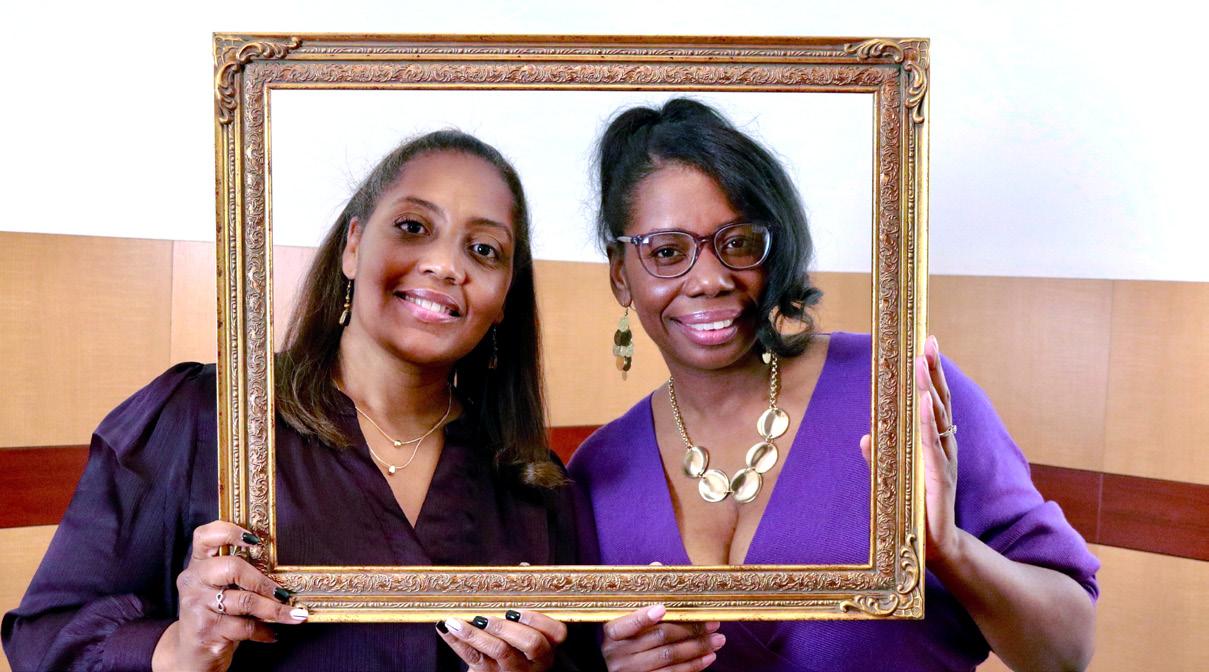
would always be her brother and her sister’s keeper.
“Hands down, it certainly starts with my family and being raised with values of integrity, community faith and the importance of being a good steward of things that are given to you and the importance of taking care of others,” said Lenita Wheeler, with Tipping Point Community, who grew up witnessing her volunteering mother connecting with and feeding people in need.
Metta Fund CEO Janet Y Spears credited her mother and two sisters with shaping the woman she is today: “My mother and my older sister are both educators. Watching them give tirelessly to the growth of people led me to think that there was something more to do than the work I’d done in
corporate America.”
Tiffany Wood of the Pacific Foundation also noted her educator mother’s influence—a strong, single mom who carried loads even when she didn’t need to.
Her loving, thoughtful and accommodating paternal grandmother made an indelible impression on her: “She’s definitely my North Star in terms of wanting that type of peaceful existence with myself, the world and those who are directly connected to my life.”
The foundational influence of paternal grandmothers was apparent among the women. “I think of my grandmother, on my father’s side, who was a fearless, unselfconscious woman who led with the spirit of Ubuntu,” said the San Francisco Foundation’s Raquiba LaBrie. “She took
in a lot of foster kids, always held us accountable to realize our promise, and believed in us even when we were going astray. When I think of my leadership, I think of her. She led from her position in the church and volunteered with NAACP. She went from being very religious to being moved by the Black Power movement, to become much more political. She’s my role model for how I want to live in the world, leading with her values and what called her, personally and spiritually.”
“I would say my grandmother on my dad’s side who instilled in me a sense of adventure and commitment to community, and taught me to never shrink my dreams,” Elizabeth Posey from the James Irvine Foundation answered, along with Jill Jones and Senator Betty Davis, two women
who she says influenced the model of leadership that she practices and the real deep commitment to Black communities. Also naming non-familial figures, Charity Whyte also with San Francisco Foundation put forward Ella Baker, Harriet Tubman, Black women in the Black Panther Party and Black women who moved transnational solidarity work for generations:
“I think, if Harriet Tubman were in the room with me right now, what would it look like for me to make her proud?”
Venturing into a discussion of the importance of sisterhood
among Black women in philanthropy, Oakland native Brandi Howard painted the picture of a rapidly changing area.
“I’m from the Bay Area, three generations back. I’ve seen the kind of ways in which Black folks have been further pulled apart and are geographically unable to connect,” Brandi explained. From 1990 to now, San Francisco’s Black population has been slashed in half, dropping from 10.9% to 5.7%. The Black population is the only racial group in the city that has consistently declined in every census count since 1970. Similarly, even while Oakland saw an overall influx of residents in the 2010s, the Black population declined. They now make up just 20% of Oakland’s population, down
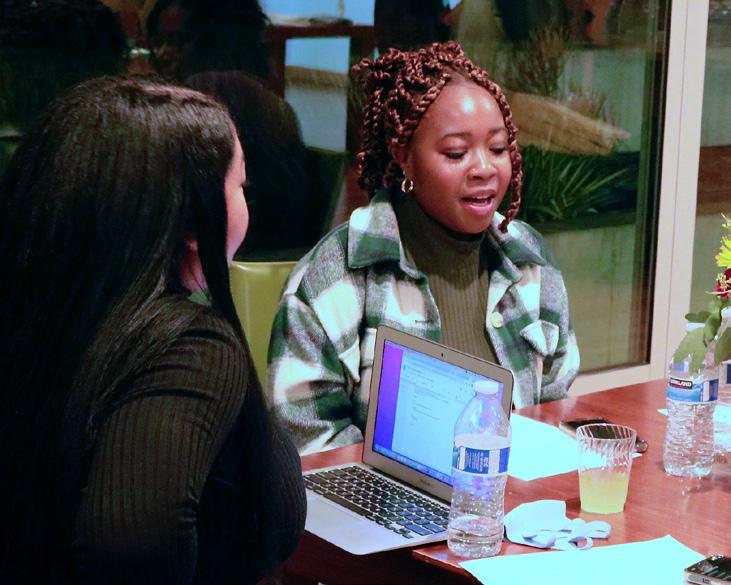
from 47% in 1980. Like many major cities across the country, the Bay Area’s shrinking Black population is fueled by unsustainable housing costs, discriminatory housing practices, and gentrification.
For Charity Whyte, she puts the responsibility of developing a sisterhood with Black women on her own shoulders: “I’m almost five years into my job at the San Francisco Foundation and every time a Black woman joins, I’m gonna call them. I’m like ‘I don’t care what

your role is. I don’t care how long you’ve been in the Bay. You’re gonna feel welcomed by someone here.’”
“Sisterhood among Black women in philanthropy is what kept me in the field and sustained my career. It’s what’s propelling
me forward, to continue to dream big about what’s possible, leveraging these platforms to really bring my unique purpose to the world. And although I’m new to the Bay Area, I’m always welcomed, and adopted among Black women,”
Elizabeth Posey
Although she’s still in the earlier stages of her philanthropic career, the sisterhood Ola Jimoh has been able to experience has
exposed her to blueprints in the field: “Seeing Black women be bold, their authentic selves, and the voice that their communities need has allowed me to be able to see that it’s possible within myself. It’s helped me identify the way that I want to show up, who I want to serve and how I want to do it. There’s always space and time so that I can always come back to it.”
Janet Y Spears called sisterhood a shortcut to getting stuff done and building relationships. For her, it also means that you can depend on being told the truth: “I feel like Black women have been in various roles for years in philanthropy, holding things together and lifting up the voices of those who aren’t heard. As we have moved into positions of leadership,
I feel like I can always have a shortcut to honest conversation.”
“We have to be able to seek out and have those relationships in this sector, where we’re required to navigate an immense amount of wealth and privilege and power, and still stay very grounded and rooted in our purpose,”
Brandi continued on the subject of sisterhood. “It’s kind of hard being in the Bay Area, because we’re not as
connected as I remember the Black community and Black women being in my time growing up here. Sisterhood helps me because when I see myself reflected in those spaces, I have to be real with myself and my focus. Particularly in philanthropy, I feel like sometimes I have to fragment myself because sitting with wealth, it’s not our history. It’s not a practice. It’s not a norm. I’m playing in a space that’s not recognized.”
Despite feeling a heightened challenge to make those
connections as the city’s demographics change, it’s clear how Brandi’s presence makes connecting easier for those coming up after her. Brianna Rogers reflected on how coming into philanthropy knowing that there are Black women presidents, VPs and CEOs who navigated the same level of poverty that she has, quelled her sense of shame and feelings of not belonging.
“Brandi, I’ve tapped on your shoulder and was like, can you be my unofficial mentor? There’s a sense of familiarity with Black women in philanthropy. I see that more than I see their title. I know I’m untraditional but there’s so much talent that these women see in me, it lights a fire in the pit of my belly to continue to just be.”
Brandi’s ability to have that Jennifer Roller Ola Jimoh

sort of impact may be a natural gift to an extent but it’s also something that’s been intentionally cultivated, in part, through the influence of women who she’d consider mentors. She shared that Susan Batten Taylor’s urges to lead with love, even in moments of conflict, helped shape her approach to the work:
“Love liberates, love corrects, love is vulnerable. It’s all the things that we need to do this work, both introspectively within ourselves and in our community.”
Michelle Myles-Chambers
and Summer Jackson both emphatically declared that sisterhood simply means everything to them.
Beginning her work in the field nearly three decades ago, Michelle said with certainty that she wouldn’t have lasted without those relationships and networks. For her, it steadied her course and empowered her to bring the voices of the people who couldn’t speak for themselves into the spaces she was working in. She specifically noted the network formerly known as Bay Area Blacks In Philanthropy (BABIP) which is now the Black Funders Network (BFN).
For BFN’s Summer Jackson, the sisterhood she found changed her life both professionally and personally: “I moved to the Bay Area
and I was a person with no children and no family here, just trying to figure it out.
But I was able to put down roots here, with my family, my career and my reputation. And that’s because of the people, especially the women around me who have encouraged me to strengthen and show my gifts.”
Now 12 years into Bay Area philanthropy, Summer says she would have advised her younger career self to speak truth to power and be assured that her voice matters—that it’s the very reason she needs to be in the spaces she’s in: “I’m bringing the voices and experiences from all of the people I’ve encountered. I don’t want to be in an ivory tower. I need to share those stories.”
For Brianna Rogers, one of the stories she feels the
greatest responsibility to tell is her own: “Don’t erase your story as you climb the ladder and get to the top just because those stories aren’t necessarily that conventional. That’s
your opening, that’s your power.”
Brianna worked to advance racial equity, in part, through leading a small grants program, giving money to impacted communities. This position demanded that she be creative and think outside of the box to get money directly to folks on

the ground who needed it the most: “I’ve been a participant in a lot of these systems that we’re aiming to change. I always keep that in my mind when I’m doing my work—that personal lived experience that I share with the folks that we’re trying to help and get resources to.”
“The term ‘racial equity’ can feel like a new buzzword and there’s more focus on it now,” Ola Jimoh asserted. “But Black women have been and continue to be the ones saying we need to say ‘BLACK communities,’ we
need to say ‘BLACK youth.’ We need to not shy away from race and acknowledge the fact that there are quality of life and service disparities. Black women in the Bay Area have always been upfront and explicit about this and some other groups are just now catching on.”
Even as Black women have pioneered the advancement of racial equity in philanthropy, there’s still a pervasive sense of personal responsibility that there’s more to be done and a belief that these critical changes
can happen. For Brandi Howard, a guiding mentality that stuck with her was a simple question posed by Sherece West: why not?
“When I was looking for excuses, questioning if I should be leading and can philanthropy really make a difference: why not? Why not push it? Anything is possible, if we approach it as if we have endless possibilities. And so it goes back to that disruption, to being uncomfortable, to saying the unconventional thing,” said Brandi.
Raquiba agreed with this sentiment, saying that she believes one of the main roles of Black women in philanthropy is to stay on a constant learning journey of reckoning with how philanthropy is an extension of racial capitalism. And
determining what they’re going to do about it. She added, “we’re
rethinking practices in philanthropy, and trying to subvert those that are reinforcing white supremacy, to think about who receives the bulk of our dollars and to really center the needs of Blackled organizations and BIPOC led organizations.”
“And that comes back to
Brandi’s point about ‘why not’? Constantly asking ourselves, why can’t things be done differently? Why can’t different people be calling the shots about who gets money and how the money is distributed?” Raquiba asked, with Charity Whyte snapping in agreement.
A primary critique of philanthropy is that it doesn’t do enough to directly solve social issues and leaves social justice underfunded. Still, with right-minded people at the helm focused on changing systems and being proactive rather than reactive, the ability to effect widespread change exists in philanthropy.
“Working in philanthropy is great if you want to have an impact in communities that matter to you and still work a 9 to 5. There might be an
underdog organization that’s led by folks of color, that primarily serves communities of color, that I can advocate for on the inside in ways that I can’t on the outside,” said Tiffany Wood. “Black women transcending sectors to create new spaces in philanthropy and keeping deep conversations about racial equity at the forefront is super important. We know as Black women, as people of color, once we go away it’s easier for people to not

talk about the issues that are relevant to us and our communities.
“During the racial justice uprisings, folks worked really hard in order to push things forward, but usually at their own expense and at the expense of Black women in leadership who were burnt out,” said Elizabeth Posey, avowing the duty she feels to always follow the lead and be of service to those doing the work on the ground.
“We must move heaven, hell and high water to have their backs.”
Advancing racial equity is also imperative in areas that aren’t always immediately obvious. Janet Y Spears’ work at Metta Fund focuses on older adults and lifting up
what we’ll all need as we age, with a racial equity lens.
“How will we show up for our elders? We are going to be that next generation that is setting the course for the generation after us. As we age, how do we care for one another?”
Janet asked, also noting that California is both an especially diverse and aging state.
Lenita Wheeler hailed the work being done at the Silicon Valley Community Foundation and California Black Freedom Fund: “Black
women show up in these spaces, be themselves and racial equity advances. Many of them, like Brandi Howard and Nicole Taylor, have committed to showing up in these spaces, being themselves and advancing racial equity at their organizations and in the world.”
President and CEO of the Silicon Valley Community Foundation Nicole Taylor’s mother was a domestic for a wealthy Chinese Jamaican family, whose will, strength, care and tenacity to provide a better life for everyone she touched. It was this nurturing influence that helped shape Nicole into someone who would later dedicate her life to serving her community. However, it was a colleague in Atlanta, a Black woman CEO of the Community Foundation, who showed her
early on that it was possible to be a woman of color, a single mother and be a leader in philanthropy. Nicole, who also ended up being a single mother for 17 years, later became a model and mentor for so many Black women and women of color in the field.
“I became a CEO of a foundation, in 2007, one of the youngest CEOs. I was still an anomaly,” Nicole remembered. “So, to have this growing group of Black women CEOs of foundations in the Bay Area—what a blessing! It’s not lonely anymore. It is a safe space. We gather. We support each other in person, in texts, in emails. When one of us gets an award, we all pile on to support and lift each other up. It is an experience like no other because we also can be real about the challenges.
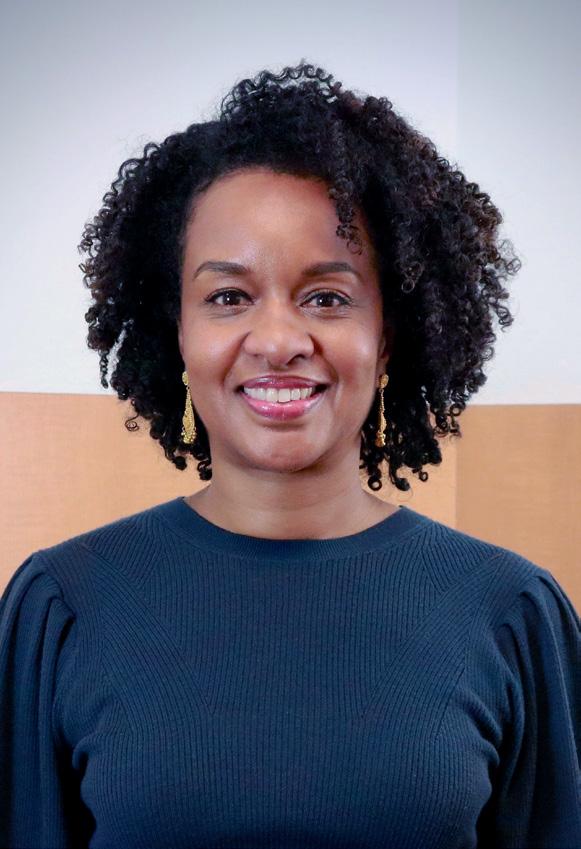
We advocate for each other. We advocate for the communities we care about. We have real conversations about racial equity and social justice and power building and the movement building work that we’re all supporting.”
The impact of prominent Black women in leadership in philanthropy, being themselves and fearlessly
advocating for their communities, is clear. In the Bay Area, Lateefah Simon’s name also frequently pops in these conversations. When Charity Whyte was just starting out in philanthropy, she joined Emerging Practitioners in Philanthropy Bay Area Chapter: “The first event I got to host as a steering committee member was with Lateefah who said something I’ll never forget: be bold and don’t be afraid to get fired.”
“She wanted me to push the needle. That’s what we need from Black leaders. My mom was a single mom. That was my first job after being an organizer. It felt like security—food on the table, getting paid on time,” Charity recalled. But Lateefah’s words encouraged her to take off her worker hat and think, first and foremost,
about who her community needed her to show up as.
“I have a calling. I came here with all my ancestors. Ready to fight and ready to have peace when we can have peace. And ready to push the needle to where we’re actually doing justice to the legacies of those who came before us.”
She remembered Brandi bestowing upon her the lessons she’d learned from Susan Taylor Batten about
leading with love. She recalled Retha Robinson teaching her about the three Ts of philanthropic generosity: time, talent and treasure.
Retha Robinson, who Michelle Myles-Chambers called “the first diva in philanthropy,” plainly impressed upon Michelle the importance of doing the work, being responsive to her community, and never letting her role go to her head.
“Sister Judy Belk,” Michelle reflected, speaking about the retiring President of the California Wellness Foundation, “I can remember having conversations with her in the early ’90s before she was CEO of one of the largest healthcare foundations in California.
Nicole Taylor with Silicon Valley, I remember her
work in the early ’90s in youth development. My sister Brandi at the East Bay Community Foundation. The trickle-down effect does not work. We have to be in the spaces to ensure that the needs of our communities are being addressed.”
“Don’t play it safe.”
That was the advice that Judy Belk gave Brianna Rogers when she was still getting her feet wet in philanthropy.
“She said, ‘you think I’ve gotten to where I’ve gotten playing it safe?’” Briana remembered her fellow Delta sorority sister asking. “She was like, ‘I have walked into rooms many times and made folks uncomfortable. Sometimes you’re gonna have to stand up alone, I’ve stood alone many times.’
She said that the top leaders shake it up, they shake the table. In a good way.”
Despite being hired into philanthropy by a Black woman, San Francisco Foundation Koshland Program Director, Retha Robinson can remember a time when there were few colleagues, let alone mentors, who were Black women in the field: “Black men were more my mentors and supporters—there weren’t many Black women early on. Then we created the Bay Area Blacks in Philanthropy (BABIP). And now with ABFE and the women’s retreat, that network grew larger than it had ever been before.”
Despite naturally gravitating toward men, having five brothers, Retha felt strongly influenced by her mother,
sister and some of the older girls at her all-girl Catholic high school in San Francisco.
“There were 600 girls and 30 were Black girls. The Black women who were the upperclassmen were influential on me. We all got our naturals. We started the first Black student union. We were really trying to harness our power as Black women, even back then in the ’70s.”
While she wants young women coming into the field now to know that there’s more to life than these positions and that you have to make time to enjoy life and take care of yourself, she also wants them to keep soaring in philanthropy.
“There are so many Black women CEOs, especially here on the West Coast. It’s amazing. I remember back in the day when the East Bay
Community Foundation was looking for a director, they weren’t even thinking about having a Black person in the running. We’ve definitely evolved since the early ’90s because now you see all the Black leadership. If that’s what you want to do, build relationships and get your advocates behind you.”
For Nicole Taylor, cultivating those relationships was absolutely critical to her success in philanthropy: “As I look around at who’s in the community of Black women leaders now, most of us came up in this field around the same time, we’re around the same age. We’re peers and we’ve been peers and friends for decades. We had children around the same time. We were in and out of marriages around the same time. That just speaks to the network that we had even coming into
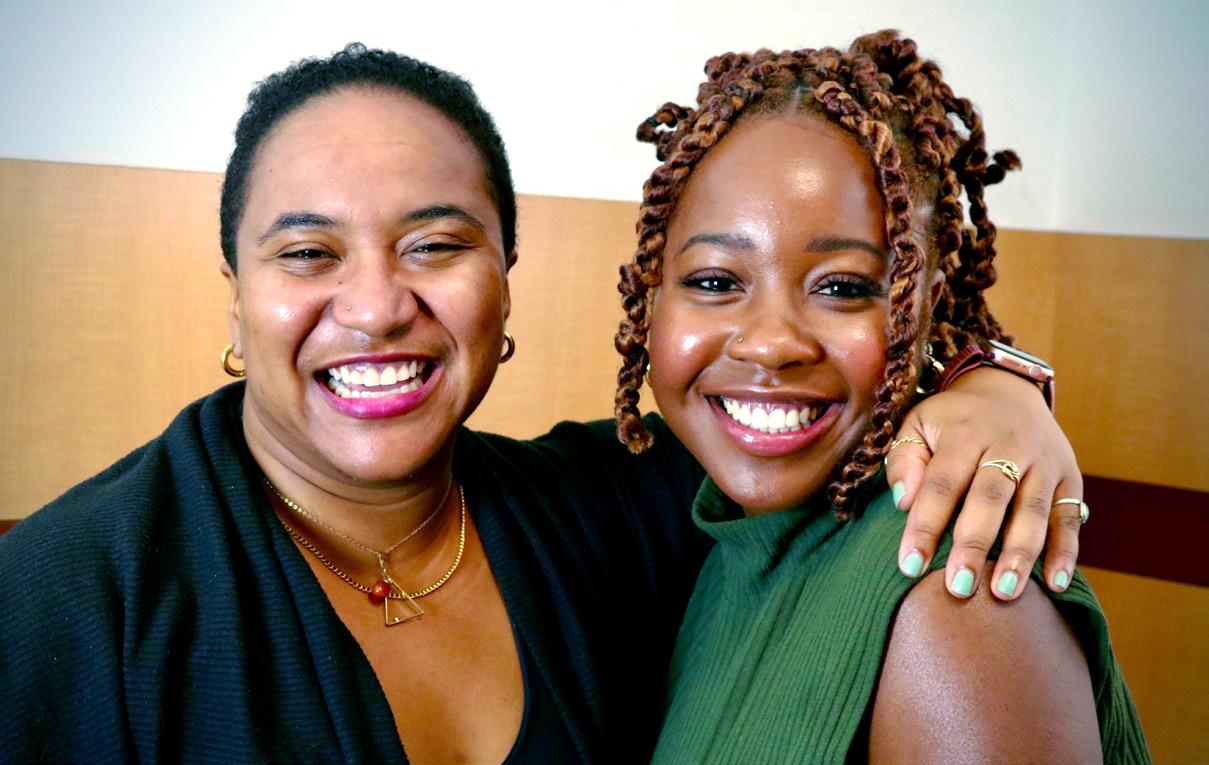
the field early in our careers.”
She advises the next generation to stand on the shoulders of the Black men and women who’ve paved the way for them and to always use their position to advocate for equity and justice in their communities. The Bay Area’s history is characterized by Black radicalism and the power of community. Despite changes to the landscape, its legacy
of speaking truth to power, fighting to change systems, and being outspoken about centering the needs of their people seems poised to live on, in part, through the area’s Black women in philanthropy.
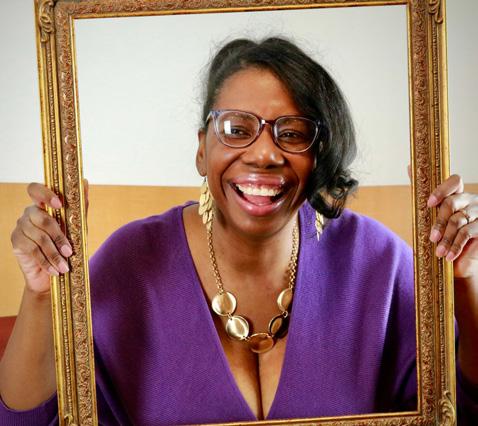
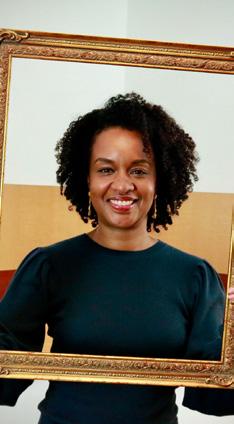
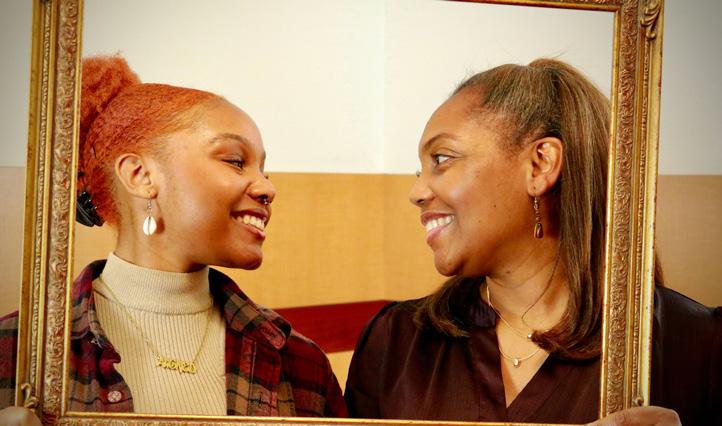
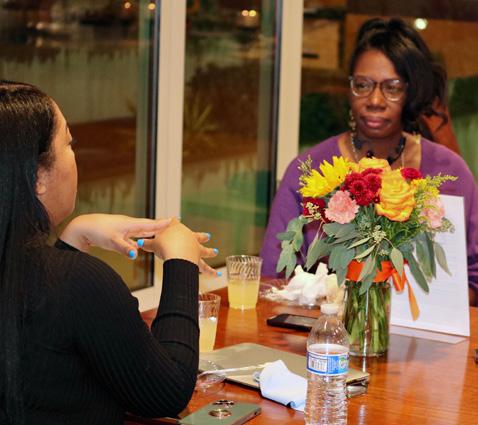
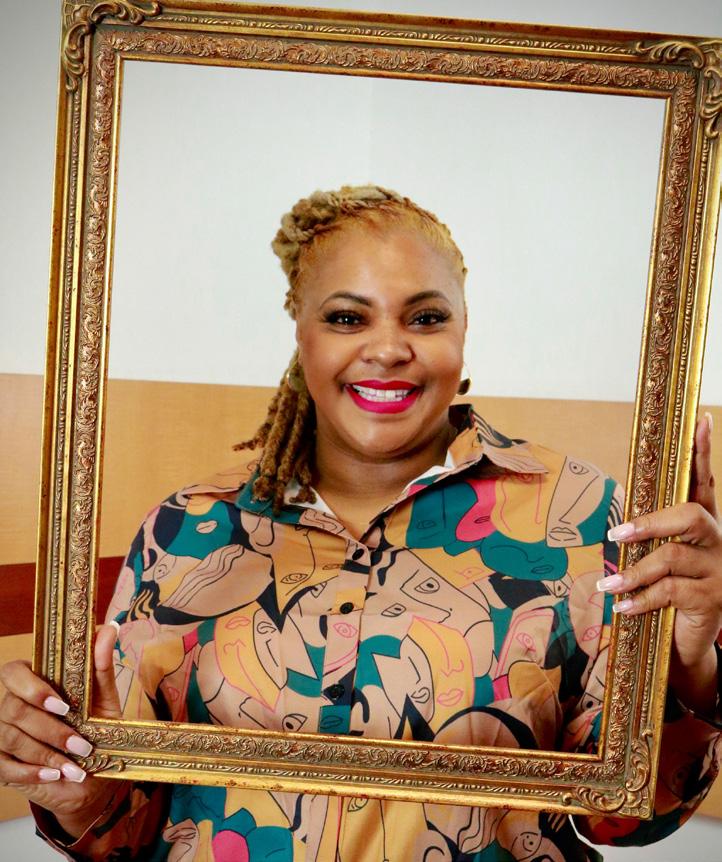
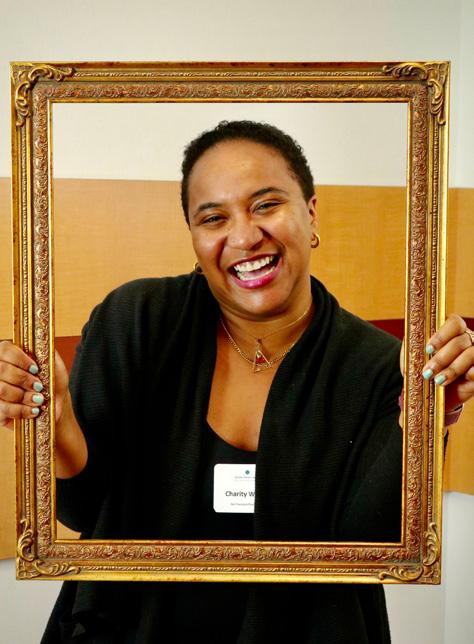
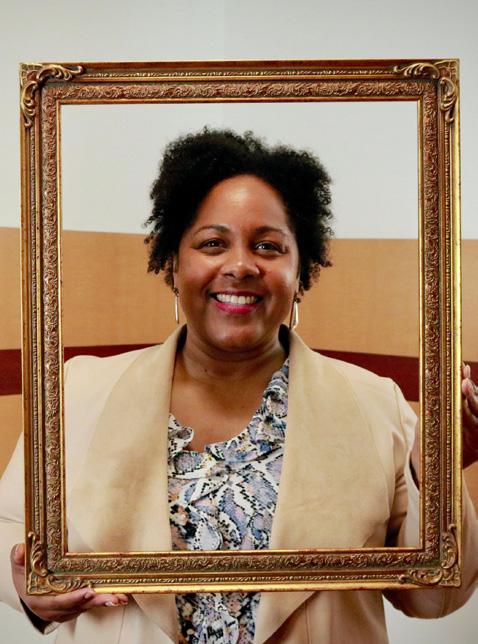
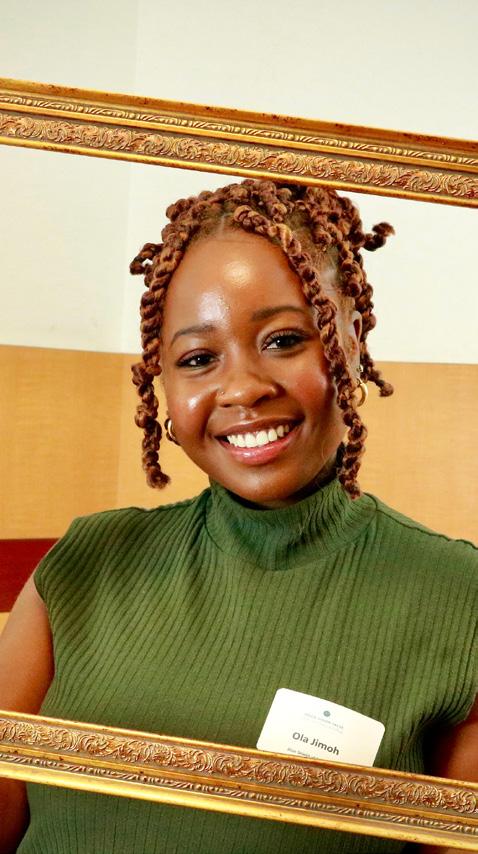
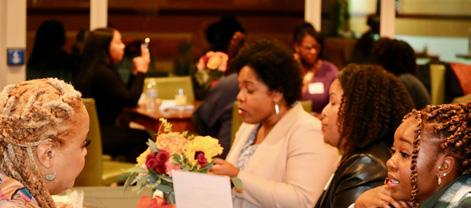



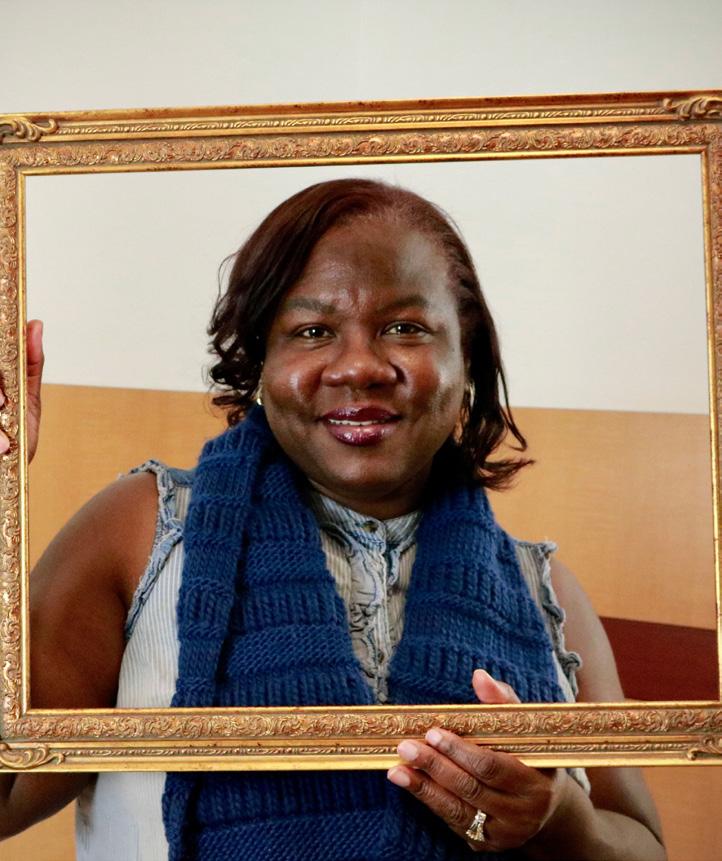
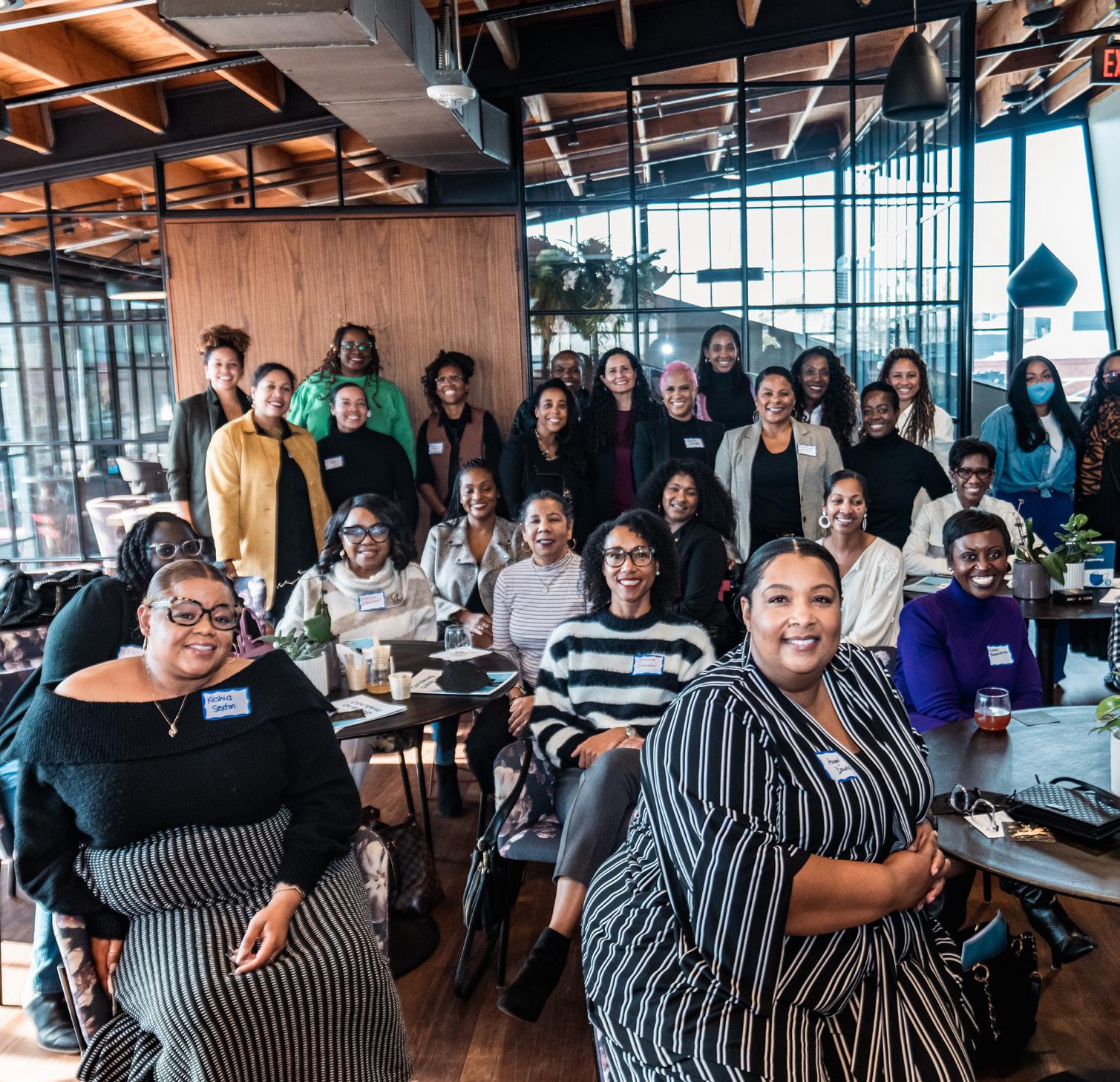 Los Angeles, CA
Los Angeles, CA
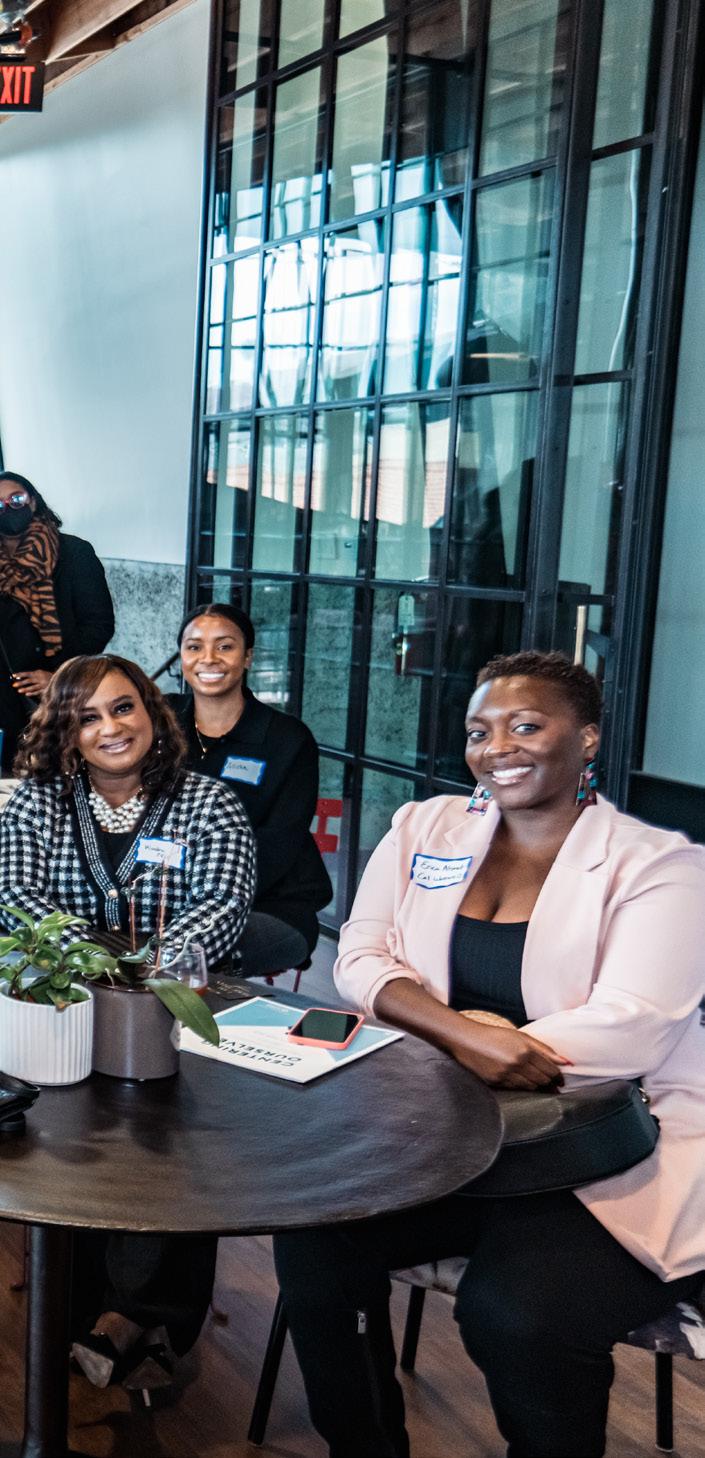
In Los Angeles, our host, Southern California
Grantmakers VP Kameron Green, welcomed her peers
with tender words dispelling angry Black woman tropes and uplifting the vital need for their voices in philanthropic spaces. Over 30 Black women had gathered in Blackbird, a perfectly appointed, Blackowned coworking space with stylish industrial glass and metal partitions, warmed up by textured magentas and teals and Black art. That day, the sun streamed into every inch of the space and, in true LA fashion, a Netflix movie was being filmed just outside. With this backdrop, the mixer felt somewhat like a wellness retreat. To further nurture the sense of inviting fellowship, everyone was asked to pick a card with words of affirmation from a deck by The Mindful Collective, and read it to the group, introducing themselves.
“My card says, ‘it is safe for me to rest,’” Brittany Daniel from California Community Foundation read to the group. Brittany came to philanthropy after working with housing and homelessness, a field that can quickly cause burnout. “A book that I just read, by the Nap Ministry, is called Rest Is Resistance. It’s really teaching me about boundary setting and how to rest, for self-preservation for the long term.”
Brittany expressed her gratitude for the gathering of women and to Kameron, who’d embraced her as a newcomer to the work: “I was like, ‘girl, can we talk? Can we meet?’ You were just so welcoming. Spaces like this are really essential, I think, to keeping us in this work.”
Sequoia Thompson ofSouthern California Grantmakers (SCG) reiterated Brittany’s sense of gratitude for Kameron, as well. She’d been trying to get on Kameron’s team for over two years, she recalled, and that day, it’d finally become official. Sequoia, who’d just become SCG’s Coordinator of Equity, Organizational Culture and Dialogue, emphasized the importance of communicating clearly and not placating white comfort, which we’ve historically been socialized to do.
“I remember Queen K one time you told me, ‘no is a complete sentence.’ And I said ma’am, yes ma’am, it is.
I never forgot that,” Sequoia said, addressing Kameron.
Jennifer Roller Alexis Marion
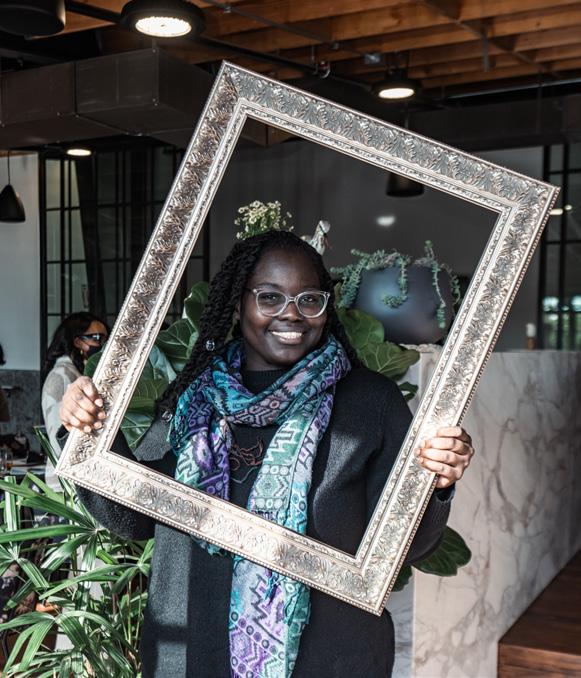
“We do not have to apologize for our decisions. We can stand in our powerful ‘no’ without trying to navigate someone else’s feelings.
That was really impactful for me being new to philanthropy and being dedicated to racial equity in philanthropy.”
Also new to philanthropy, Arabella Advisors director
Dawn Frances Reese’s card read: I envision my highest self and start showing up as her. “I chose this card because I feel that as Black women we are sometimes asked to shrink to make other people feel good. And I’m choosing not to do that with all of you, today.”
As Los Angeles is widely considered the entertainment capital of the world, there was an aptly strong representation of women from sports and entertainment organizations. “Early in my career, no one focused on self-care. No one used the words mental health. No one told me to take care of myself. It was a rat race. Push for excellence, strive to be your best,” Nichol Whiteman of the Los
Angeles Dodgers Foundation remembered aloud.
“You just go. And that’s how you prove your worth. Everyone I mentor today, I tell them that hard work is the secret sauce but taking care of your mental health, that layer of self-care, is so important.”
In concurrence, Noelle Bailey-Mills from Sony Music picked the card: I find strength in the silence. “I picked this because I’m constantly going, constantly thinking. I’m getting emotional just thinking
about how I’m always going. I picked this because I think there’s a lot of strength in being able to stop,” she said, expressing how much she needed to be in that room at that moment.
“I’m truly thankful for being here and for waking up this morning,” began Anschutz Entertainment Group’s Tamala Lewis. My card says: all of my emotions are part of the human experience. The ladies around me, my sisters in sports and entertainment have gotten me through a whole lot.”
Los Angeles Lakers Foundation’s Keisha Nix repeated Kameron Green’s reminder that no is a complete sentence. She added, “We can’t be any good to anyone else if our cups are empty. I’m not really getting full because I’m spreading
Jennifer Roller Kameron Green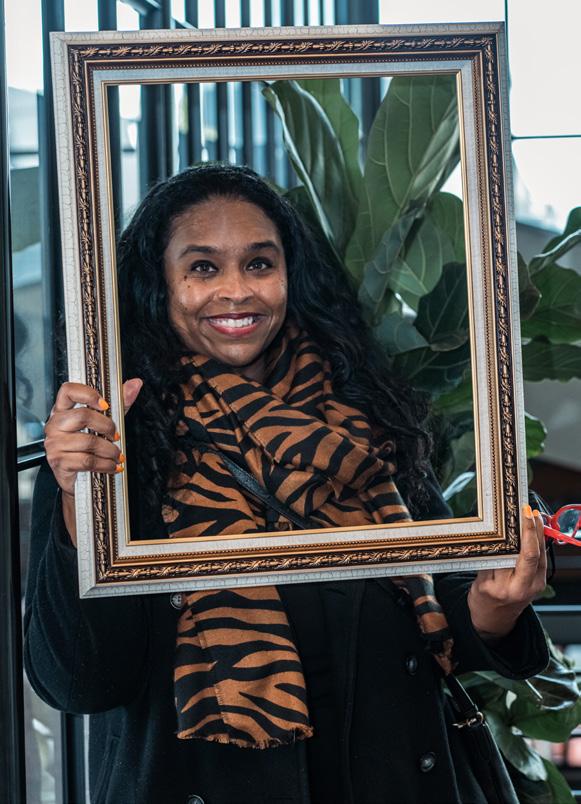
myself thin. There are times when I need to kind of fall back and say no.”
The pandemic, according to many of the women in the room, helped them to slow down, to say no and to create healthier boundaries for themselves. The social justice demonstrations that coincided with the pandemic also created changes for many of them.
“In the wake of COVID,
and social justice and civic engagement, I found it a blessing because it finally gave me the platform that I needed to be able to do this advancement,” Keisha explained. “We’ve been working hard toward social justice for so long. It’s just now popular but I’ll take that. We were able to bring social justice to the forefront, and make some lasting differences and changes that will go on in perpetuity. And it’s not just checking the box.
“In the pandemic, Fox Entertainment put together a female mentorship program which I’ve recently been asked to be the executive in charge of. It’s important for someone like me at that level, and probably the only Black person in the group at that level, to be an advocate and make sure I’m involved in the decision making,” said
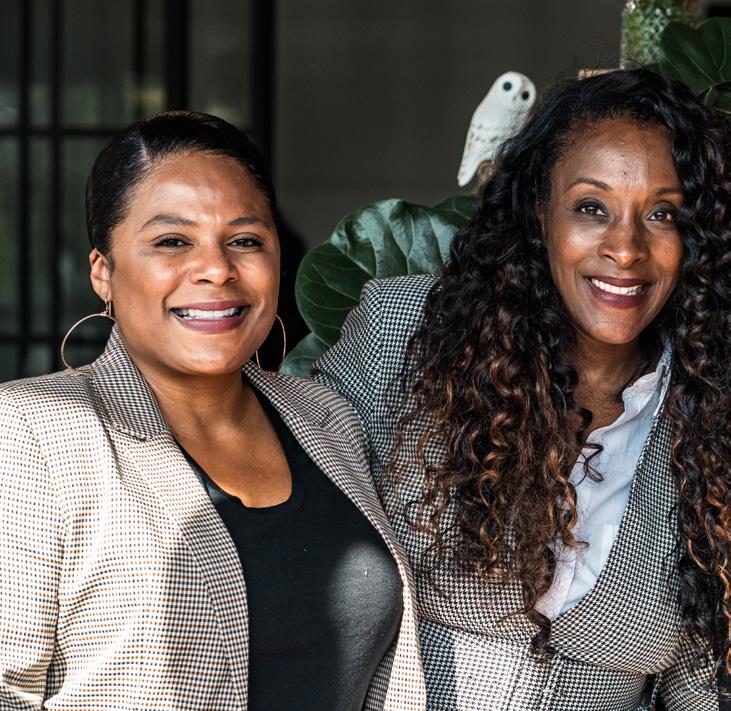
Mamie Coleman, who shared that she’d shown up that day despite dealing with serious health issues in her family.
Mentorship—more than anything, that’s what the sisterhood of Black women in philanthropy means to Sony Music’s Towalame Austin.
“As someone coming in on the entertainment and sports side initially. I reached out to Susan Taylor Batten, and asked her to mentor me and help me learn how to properly govern. And that
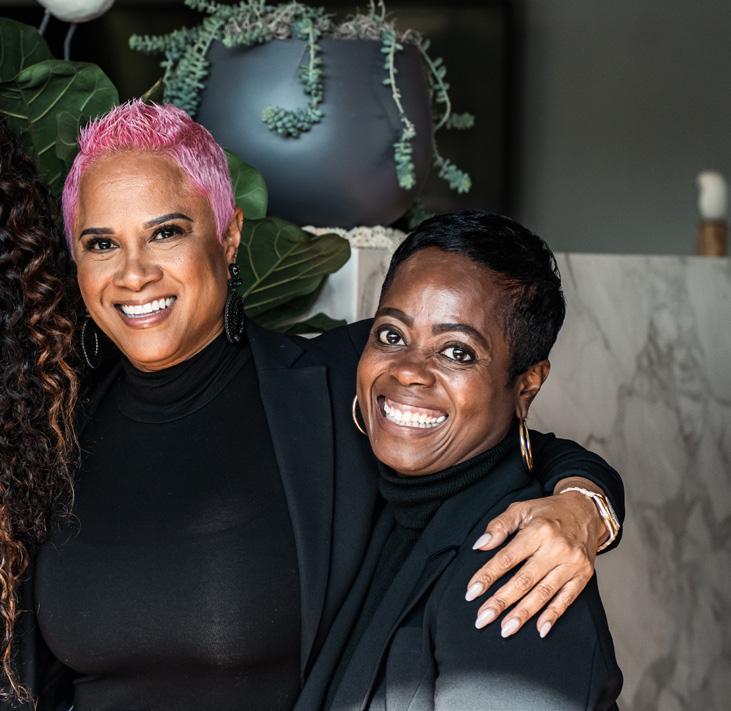
sisterhood has brought me wisdom. They embraced me,” said Towalame, a former ABFE board member, who joked that she does whatever Toya Nash Randall tells her to do. “For those coming after me, I would tell them to lead by example and be fearless,” she continued, “Find your why and let that guide your work.”
Nichol Whiteman of the Los Angeles Dodgers Foundation credited Towalame with inviting and pushing her a little extra to be there that day. She selected the card: I am the guardian of my happiness. “I chose this because I feel like 2022 is the beginning of a journey for me as far as happiness is concerned. My husband, my children, my parents, my job have all certainly defined my happiness. I think this is true for a lot of women. So I’m taking that back and being here is a reminder to continue to take that back.”
In her work, Nichol explained that the mission of the Dodgers Foundation is to tackle LA’s most pressing problems—homelessness, education, health care and social justice: “We’re very intentional about the fact that the word social justice
is in there, our vision is that every Angeleno should have an opportunity to thrive. When I talk to people about ‘marginalized populations’ I’m completely unapologetic about that meaning Black and brown people in Los Angeles.”
Los Angeles is one of the most diverse cities in the country but not one of the most equitable. In LA County, Black residents make up 8% of the population and 34% of the homeless population.
“I do believe that the pandemic and George Floyd’s murder helped to advance racial equity because it gave all of us who’d been screaming about racial justice an opportunity to double down,” she continued. “But a lot of it is in the partnerships. It’s about coming together
and not letting down. And being clear about the communities we want to serve, not just when someone is murdered.”
Native Angeleno Sharyn Church noted that people in philanthropy in LA who are actually from LA are few and far between. She chose the card: I release control of my plans to make way for my destiny. “As a Black woman, my mother raised me telling me I had to be smarter, brighter, faster than your white colleagues. And so we plan, we plan, we plan and certainly life happens. But if I release those plans, I believe God has bigger plans for me than I could ever imagine.”
Sharyn, who is the first Black woman Managing Director at Arabella Advisors, shared that the best piece of advice she’d received since entering
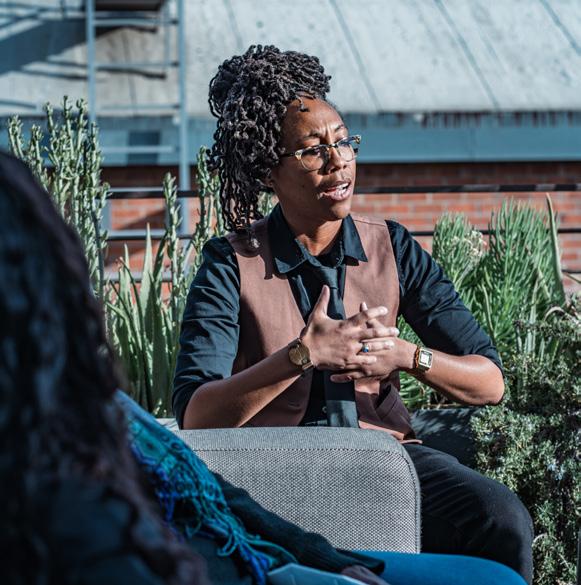
the field is to know your worth, know that you have agency and that, there’s certainly a lot of pressure to be the first, but there is also a community of women and people who can be the wind beneath your wings. This advice came from her mentor, Judy Belk.
Judy Belk selected the card: I’m allowed to say no. “Most of you know that I just made the announcement that after almost nine years, I’m leaving the best job in the world,” she said addressing the women at Blackbird. In
2014, the Oakland native came to LA to lead Cal Wellness, one of the state’s largest health-focused foundations, with more than $1 billion in assets. In 2022, under Judy’s direction, the organization gave most of its grantmaking dollars to BIPOC-led organizations and poured millions of dollars in investments into initiatives to address health issues that disproportionately affect women of color.
“I had to say no to working a little longer, staying a little longer. I had to keep saying no,” she said of her decision to leave the field. “But I think even in terms of us managing families, and we’re great at multitasking, I often just say, yes, yes. And so I’m trying to get used to allowing myself to say no.”
Judy mused that sisterhood
for her, among Black women in philanthropy, had been somewhat of a trusted kitchen cabinet. It meant a group of women who shared her values, provided unconditional support and wanted her to succeed:
“This means at times, they will embrace me and other times they might be giving me a swift kick in the butt.”
“As the elder, I’ll say this. Be very protective of your personal brand. Be really particular about who you follow. And find work that you love and a partner that you love even more.”
Judy Belk’s name rings out all across the country. Countless people in philanthropy, Black women especially, consider her a mentor. But the group that sat before her, listening to some parting words of wisdom, inspire great optimism that she’s leaving the field in good hands. The hands of women who feel up to the
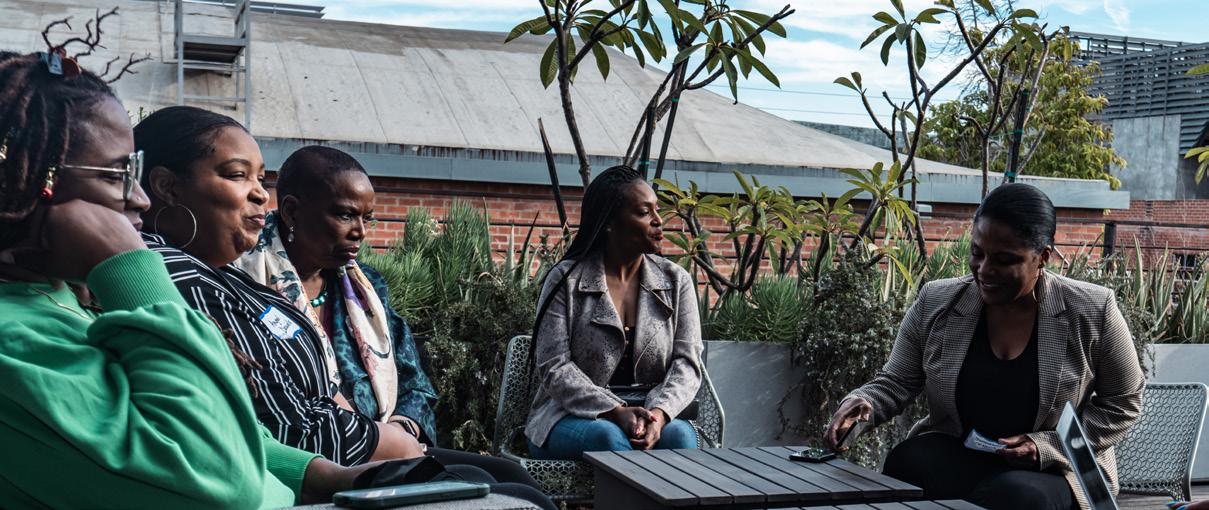
challenge of representing their communities despite vulnerably expressing the struggles they grapple with.
Victoria Bridenstine’s affirmation card read: My future self can handle it. “When I began to move into leadership roles, I was very insecure. But it was insecure internally,” Victoria, who works at the Levitt Foundation, shared with the group. “People didn’t feel that way or view me that way externally.”
She had to be reminded, by Angel Roberson Daniels of the Angell Foundation, that when she walked into a room, she didn’t come across insecure. Angel, who also urged the women to prioritize their own self care when thinking about the liberation of our people, helped Victoria realize the
solution in dealing with her insecurities was to be aware of what you’re putting yourself through internally and allow yourself to be the person you want to become.
As more testimonials were put forth, the theme of learning to push through self-doubt and imposter syndrome emerged.
“There were so many moments of feeling like a fish out of water,” Nicole Pritchard of the James Irvine Foundation confessed. “I’d come home to my husband and express just how uncomfortable I felt and how much work it took just to amp myself up so that I could feel empowered and feel like I should be using my voice.”
While it’s become more and more common for Black women to be advised to speak out and use
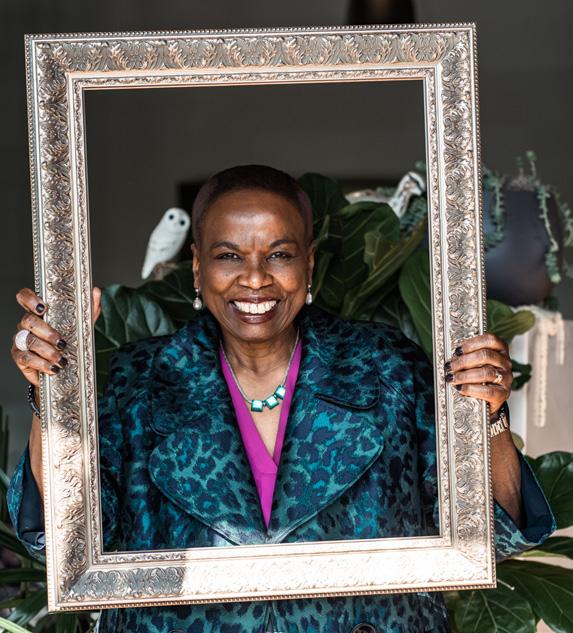
their voices, Nicole had experienced advocating for herself and losing her job for it. After this, she developed a tendency to shrink back and blend in: “It’s really about being intentional and telling myself, no, I need to create my lane, I need to use my voice and be an advocate because me doing this is going to make it easier for others who are newer to the organization.”
If Joanna Jackson of the Weingart Foundation could go back she would’ve
trusted herself more, did less second guessing and less compromising: “I would tell my 20-years-ago self, don’t compromise yourself, your health, your well-being, your values. We don’t say no enough and it impacts our health as black women. There’s a reason why the rate of deaths from heart disease is so high for Black women or we can talk about maternal health stats. We burn ourselves out.”
W.
Foundation’s Alandra Byrd Washington implored folks in the room to remember how important it is for them, as Black women, to be there pushing against the sector rather than giving into it. She’d been mentored to show up in credible and authentic ways, to promote the racial equity agenda, ensuring that their voices, their grantees’ and the voices
of the communities they work with are heard. “We are an extension of the people we serve. We represent their ideas, their needs, their hopes, their dreams in that room at every turn.”
Alandra selected the card: I have the power to create change. “I chose this because oftentimes as Black women, we are invisible and I always have to remind myself that I am a powerful Black woman.”
This belief, among Black women, that we do, in fact, possess the power to create change and the will to take on that mission regardless of
the obstacles is a superpower. It was this belief that pushed Silicon Valley Foundation’s Keisha Sexton from the programming side to the funding side of the work.
“A lot of the time funders ask people in programming to do things based on the results they want to see,” Keisha pointed out. “But when you think about movement building or social change, it’s those little things in between—the
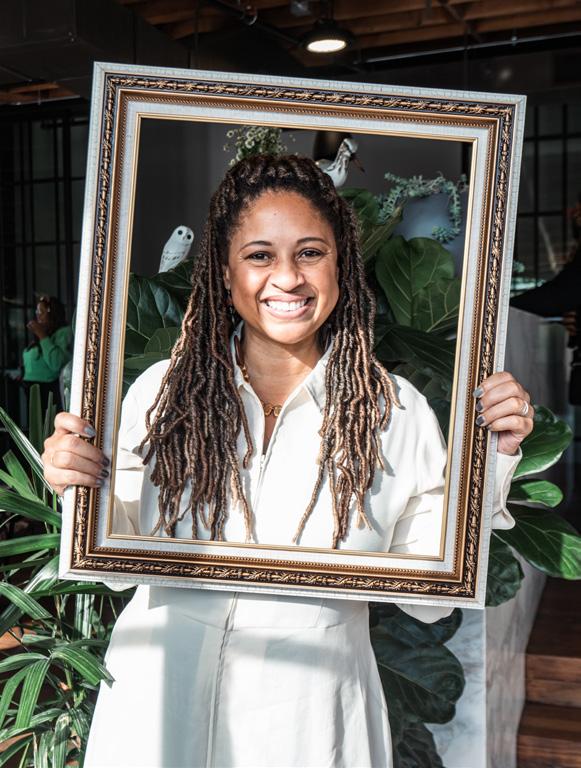
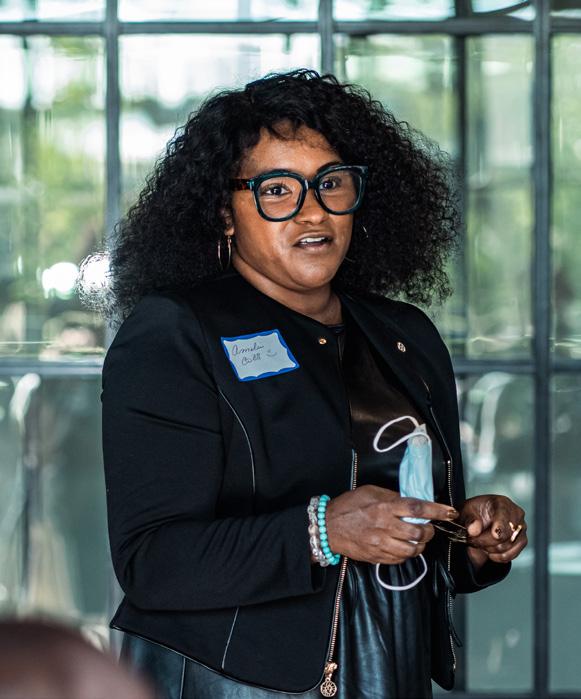
relationship building, righting the historical wrongs of organizations—that makes people feel empowered to make a difference. I wanted to be able to bring what I know is happening on the ground into the foundation space. So that those who are on the frontlines feel like they have what they need to actually do the work.”
Andrea Collins, co-chair for Southern California Leadership Network and Vice Chair for Los AngelesContemporary Exhibitions, applies the checks and balances of the three As, to her approach to the work: advocacy, allyship and being an ambassador. This means simply to simultaneously be firm in your commitment to being an advocate for the communities you’re serving; be an ally and identify your allies in the people and organizations you’re partnering with; and act as an ambassador for your organization and the movements you align with.
For Janae Oliver of Kaiser Permanente the trick to having a real impact is simply to trust your gut. Leaning on her instinct and ingenuity, Janae’s created brands and projects like #Blac-cinated, to amplify vaccine education and awareness in the Black community during Covid, and Mindful Beauty, a
program to train hairstylists to identify signs and symptoms of depression in their clients. “All of this I’m creating on the side outside of a system. These systems don’t easily understand our culture or it’s applicable within a healthcare space. So, when they don’t get it, create your own, right? Do that authentically and unapologetically.”
For Black women in philanthropy, the theme of authenticity is clearly central to successfully uplifting the communities you represent and claim to serve. Sometimes being authentic means not diminishing yourself or shying away from your lived experience. For Dawn Frances Reese, part of being authentic means learning who you are in every space you’re in and being consistent about that, for credibility.
Kim Pattillo Brownson from the Ballmer Group, selected the card: I am always guided. She expanded on her affirmation selection saying, “I find the greatest strength and the most ferocious version of myself when I am guided to thinking about this work as a mission, not a job. That makes it easier to say, ‘I hear your no and I’m moving forward anyway.’”
A reminder about authenticity for The Boeing Company’s Tamika Lang came when a colleague joked that he’d be looking for her at a conference and she wouldn’t be hard to find.
“It was a reminder that—often being the only Black woman in the
room—as much as I may have tried to cover up, blend in, cower down a little bit, it’s impossible,” she said. “You’re going to be noticed. So you might as well validate yourself. A lot of times, I dismissed my lived experience. I automatically thought those around me had more value. That is something that I had to unlearn, especially in the field of philanthropy. Because, if that’s how I felt about myself, what was I saying about the value of the people we work for? How are we validating their voices? How are we making sure that they are being seen? That’s something that I’m constantly exploring. And it’s a journey.”
Janae Oliver’s card read: I learned everything I need in life simply by being me. Growing up in South LA, she was constantly told she had to code switch and adapt. She now understands the necessity, however, of taking her upbringing and background and experiences and bringing them inside the doors of the spaces she enters, including at Blackbird, that day.
“I am growing. I’m an introvert and normally I would’ve been figuring out my escape route to get out of here,” she admitted to the group, filling the room with laughter. Notwithstanding, chronically jam-packed schedules, social anxieties and Covid-induced tendencies toward isolation, the women all showed up that day—more women than expected. The message
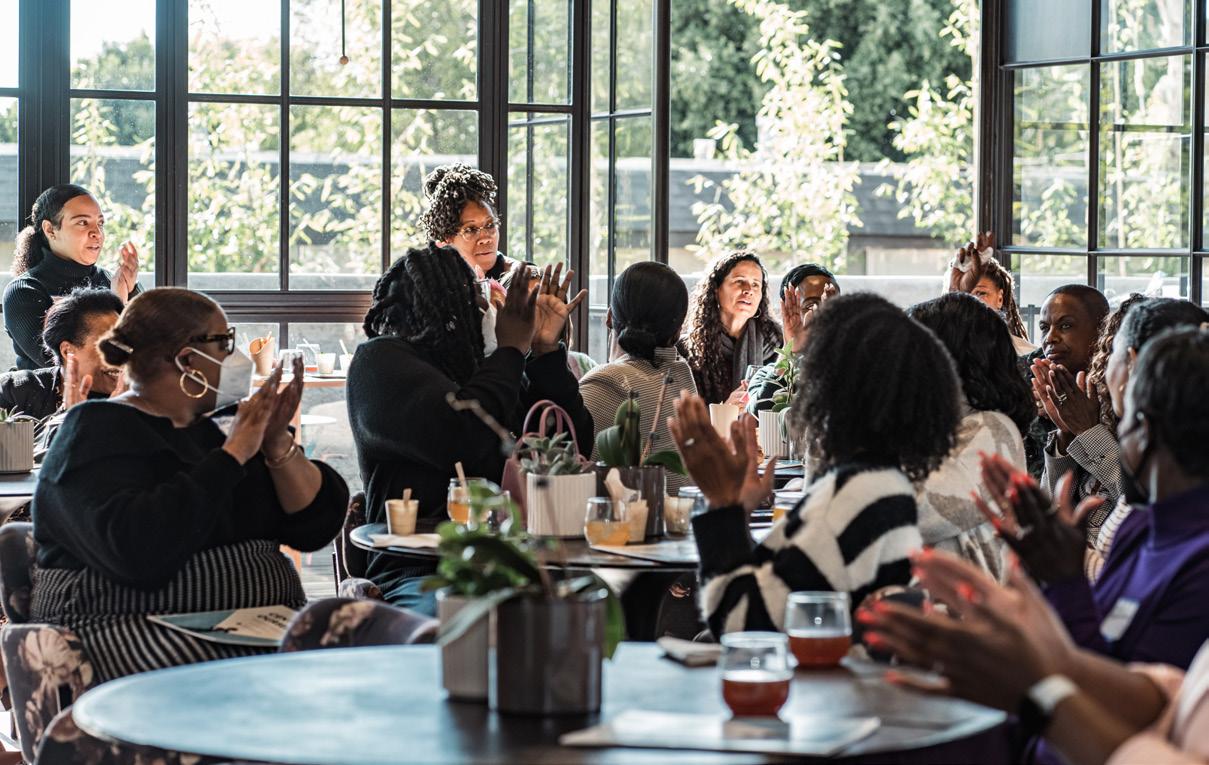
was clear, in the room, that building relationships and fellowshipping with people who intrinsically recognize so many of the things you experience is not just valuable, but crucial to longevity.
If Joanna Jackson of the Weingart Foundation could impart wisdom on younger women coming up in the field, she’d tell them to find their sister circle and don’t feel like you have to navigate
the terrain alone: “I think many of us have frequently been the only black women in a space. You need to have your tribe, your circle, whatever you’re gonna call it. Those women have held me up and pulled me through. It’s essential.”
And sisterhood will mean different things depending on what you need. For Angel Roberson Daniels, sisterhood means a trusted network of people who care about
your well-being and having aligned values and vision for the changes you want to see in the world. For Kim Pattillo Brownson, sisterhood once looked like being pulled to the side and reminded not to play small even if that makes people uncomfortable. For Andrea Collins, sisterhood manifests itself as relentless support and the shared combination of dynamism and an altruistic nature, so commonly found in Black women.
“I think sisterhood is how we show up for one another, particularly on those rough days, when we are close to the edge and when we’re ready to sometimes tell someone off,” said Janae Oliver. “We have that friend, that sister that says ‘reel it back, start all over, you’re going to be okay.’
I think it’s intuitive. There
are times when we may see one another and we’re like, ‘okay, let me just talk to you real quick because I see that you’re frustrated or I see that they’re doing X, Y or Z to you.’ It’s something that naturally comes up for us. And that is really sisterhood, that’s community.”
“You know, people say nobody’s got you like a Black woman got you,”
Jennifer Roller Victoria Bridestine

Brittany Daniel said on the subject of sisterhood in philanthropy. For her, this means honesty and looking out for your best interest. And that’s more, at times, than just telling you that you’re doing well. “It’s also calling us in. It’s course correction. And you’re able to take that in stride and adjust because you know that it’s coming from a good place.”
The work, as with any work meant to push Black people forwards, is a lesson in care and compassions, and commitment to the constant process of growing and learning. Unsurprisingly, a thought-provoking sermon on this subject was delivered by Southern California Grantmaker’s new master of dialogue, Sequoia Thompson. She discussed having the privilege of facilitating
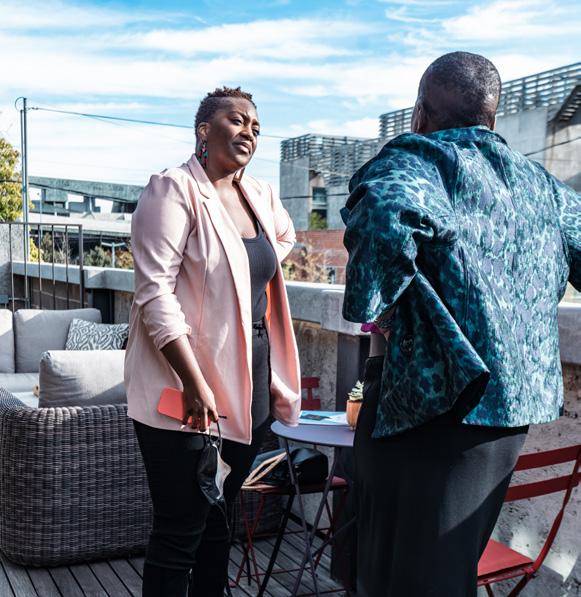
conversations in Black affinity groups and similar spaces, where Black folks get to drop their guard and get candid about dismantling white supremacy and dealing with anti-Black racism. A topic she’s noticed pop up on occasion is the unique hurt that Black people feel when another Black person isn’t supportive of them in the way that they’d like.
Often, in these discussions an old Black proverb that we’ve all heard is thrown out: all skin folk and kinfolk.
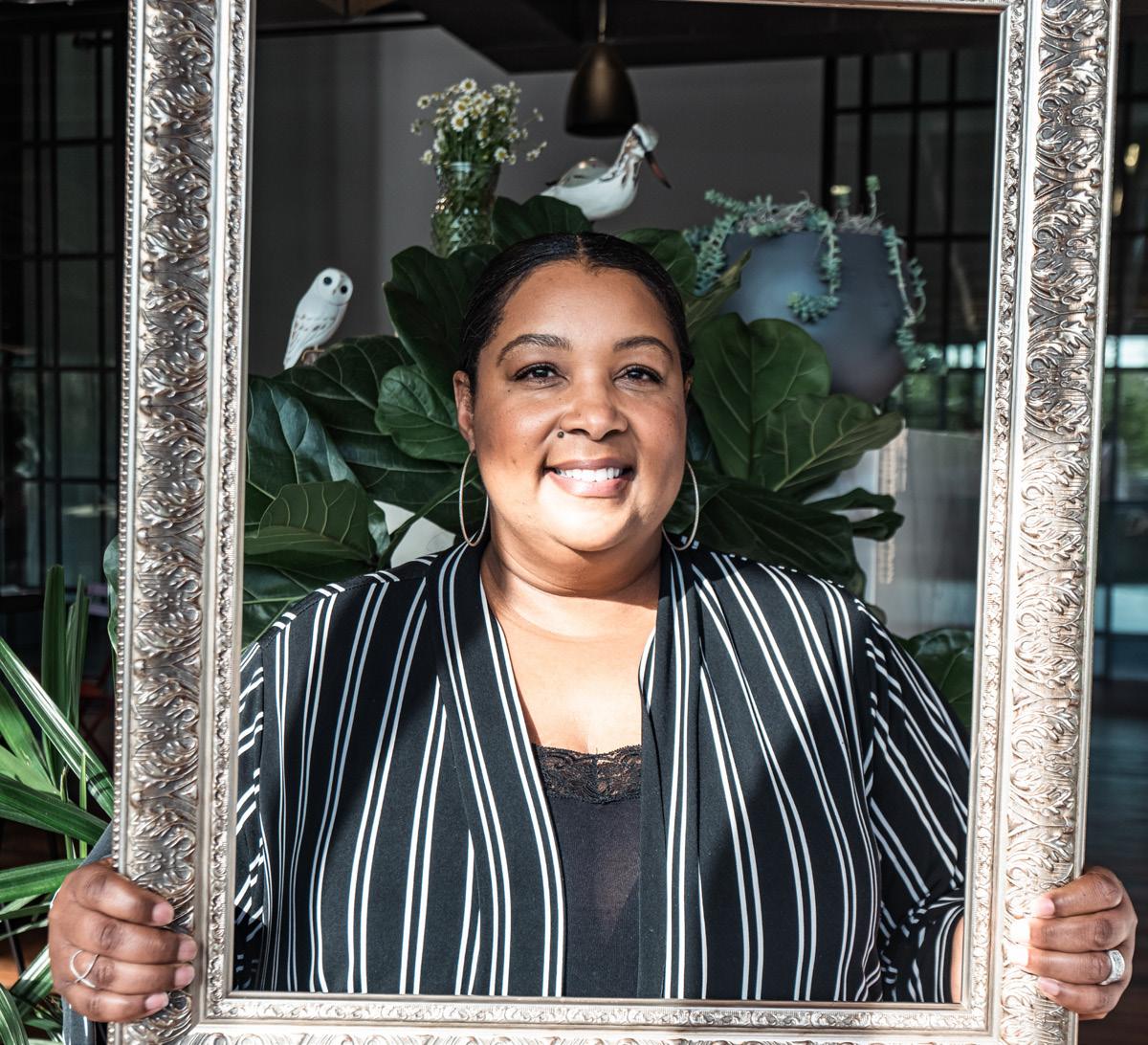
“I absolutely have said that and believed in it,” Sequoia acknowledged. “And now I vehemently absolutely believe in “all skin folk ain’t kinfolk and so many of our kinfolk haven’t found healing. That perspective grants me compassion for people. There’s generational trauma
that’s been given to us. And I don’t want to internalize that as being personal. We often talk about the crabs in a bucket mentality, centering the faults of our community but who put crabs in the bucket in the first place?” she asked.
“The crabs are acting out because they are not in their natural environment. We say, ‘look at what they’re doing to each other, they’re pulling themselves down.’ But this framing is failing to place accountability on the structures that are in place and the people that are in power, making us feel like we’re in competition and not community. And this isn’t to say that we should excuse individual behaviors; sometimes our siblings need to be called in. But we need to acknowledge that this hurt that was given to us is still filtering through us and keeping us disconnected.”
Toya wrapped up the group discussion, the very last of the Vision Voice Value book mixers, thanking the women for their contribution to a project made possible only because Black women all over the country said yes to coming together and sharing their stories.
She described the honor, inspiration and aw she holds for the women in the room and the women across the country who showed up so brilliantly for this project. “None of it would be possible if we didn’t look to and lean on one another.”
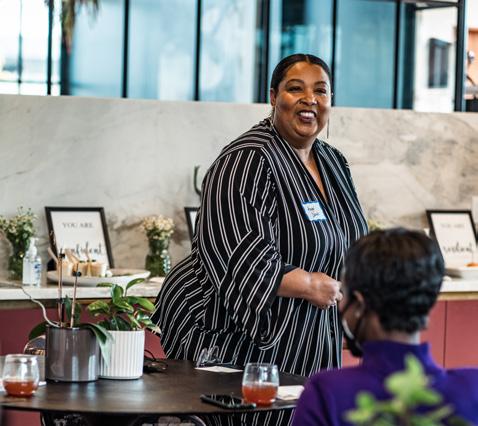
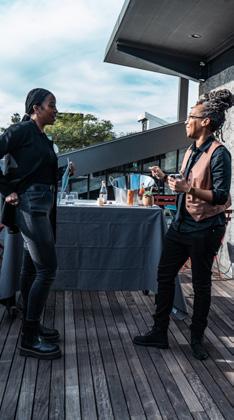


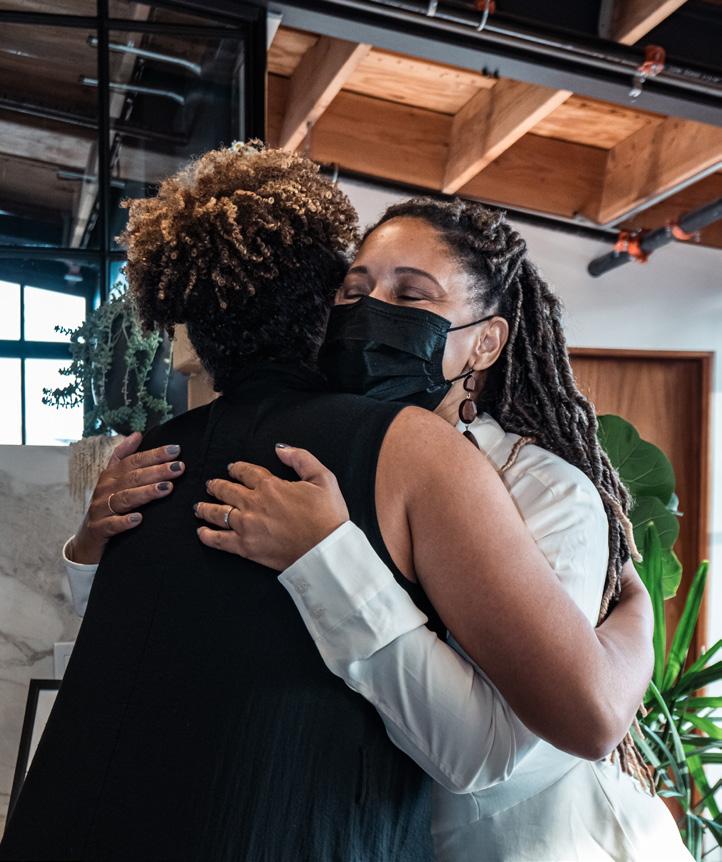
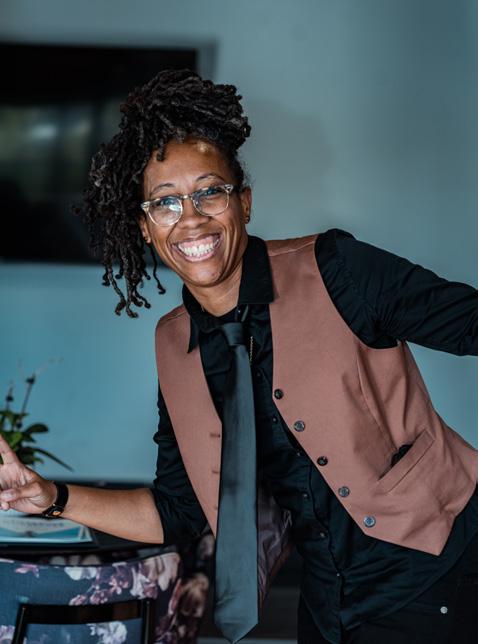
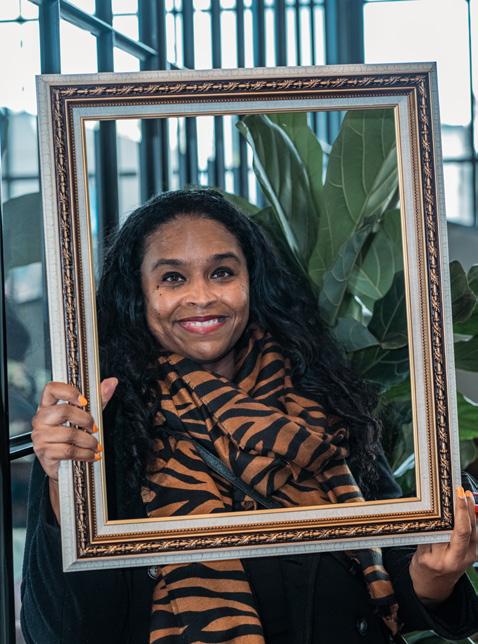
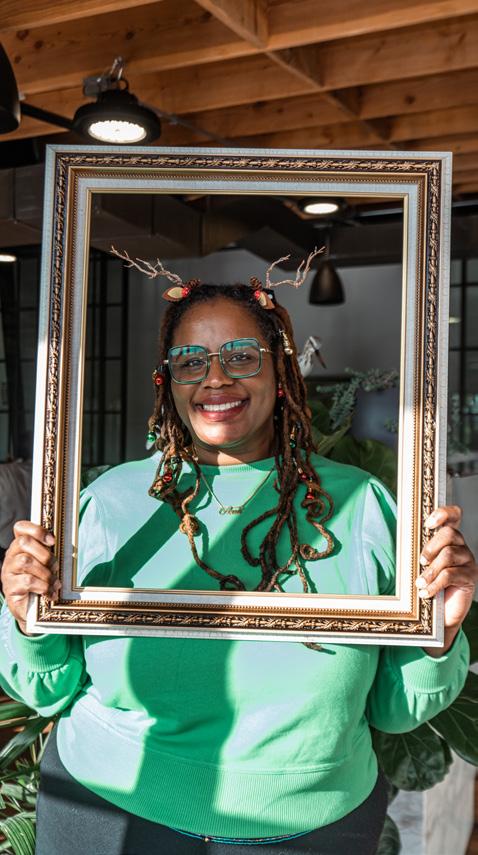
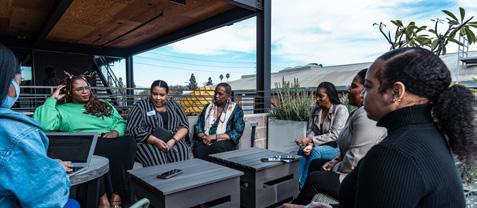
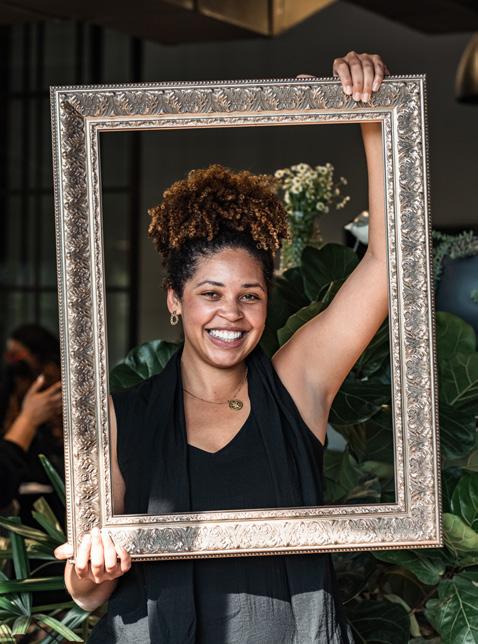

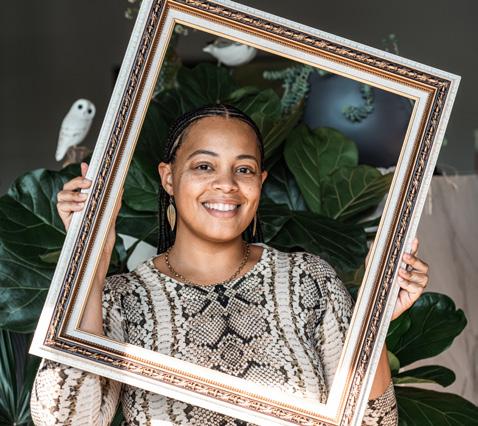
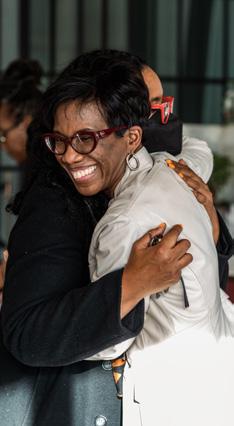
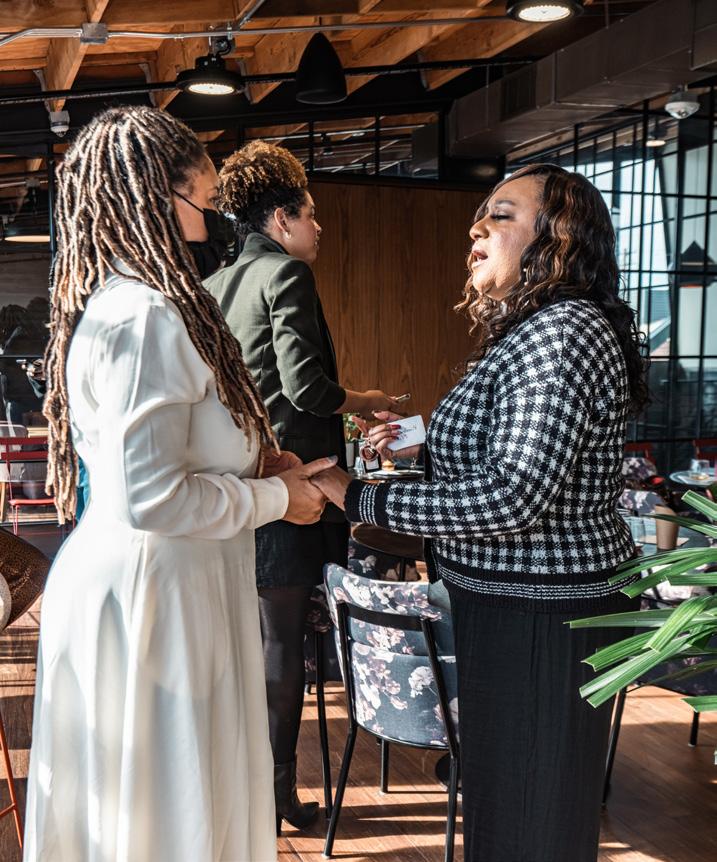
Thank you Antoinette Malveaux for your leadership, endless thought partnership and trust. Your demonstration of how to make room, share space and share power is masterful. The field of philanthropy is better because you show up everyday to make it so.
The following people paved the way for Portraits of Us by extending social capital, moving money and investing time early and often to listen and advise. Their collective investment moved the idea of a book about Black women in philanthropy
from a desire in my heart to Portraits of Us, the reality we now hold in our hands. I am forever grateful to Kirsten Livingston, Christy Wallace
Slater, Ciara Coleman, Ada
Williams Prince, Judy Belk, C’Ardiss Gardner Gleser, Angel Roberson Daniels, Chanda Smith Baker, Heather Parish, Katrina
Mitchell, Susan L. Taylor, Mary Thomas, Olivia Thai, Gladys Krigger Washington, Tajma Beverly, Erika Seth
Davies, Dr. William Bell, Carmen James Randolph, Trista Harris, Susan Taylor
Batten, Elaine Rasmussen,
Jennifer Dobossy, Alicia Dixon, Towalame Austin, Lateefha Simon, rashid shabazz, Corliss E. Harlen, Takema Robinson-Llewellyn, Karen McNeil Miller, Linetta
Gilbert, Lauren Casteel, Flozell Daniels, Qiana
Thomason, Monique Brunson
Jones, Charles West, Sana
Jafri, Nicole Robinson, Janice
Dunbar Travis, Sherece
West-Scantlebury, Caronina
Grimble, Nashawn Johnson, Deborah Bennett, Eva
Montalvo, Dani Johnson, Gisele Shorter, and Traci
O’Neal Ellis.
Thank you to all of the co-curators featured on the cover for their masterful outreach and convening power; the gifted contributing writers and photographers who traveled by train, plane, and automobile to capture the images and words so
beautifully in real time.
To all of the women who showed up to share your stories with grace and courage. Thank you for opening your hearts and trusting the process.
Many, many, thanks to the persistent and patient Malana Joseph Mitchell, Beverly Vappie, Dejah
Tanner, Rachel Zinsel and Mike Harnett who are all part of the amazingly talented creative team of graphic designers, digital artists, brand and communications professionals at Spears Group.
Thank you to my favorite guys Zachary and John, for the limitless love, joy and support.
Toya Nash Randall has grounded her 20+ year career in philanthropy around the legacy of sisterhood and giving created by her beloved grandmothers; those values and life lessons have shaped a body of work that places Toya among the country’s top thought leaders in professional philanthropy. In 2020, she created and launched the revelatory digital narrative platform, Voice Vision Value
Black Women Leading
Philanthropy to elevate, celebrate, and document the historic impact of Black women, the largest BIPOC community of leaders across the talent pipeline in professional philanthropy. As Curator & Catalyst of Voice Vision Value, Toya has established a bold research agenda solely dedicated to documenting the unique experiences of Black women leading at the intersection of race, gender, and class. She also designs brave spaces for dialogue and develops holistic
professional and personal development experiences that support career advancement, prioritize selfcare, and facilitate strategic network building.
Toya is many admirable things—a compassionate and generous philanthropist, a keenly gifted writer and speaker, an energetic and dedicated board member and leader, a staunch sponsor and champion of women leaders, and a fierce advocate of equity and inclusion.
Though she holds many titles and wears many hats, being a mom is highest on her list. Toya centers family and
community as her foundation and is raising her son Zachary with the values taught by her grandmothers and in keeping with their rich legacy.
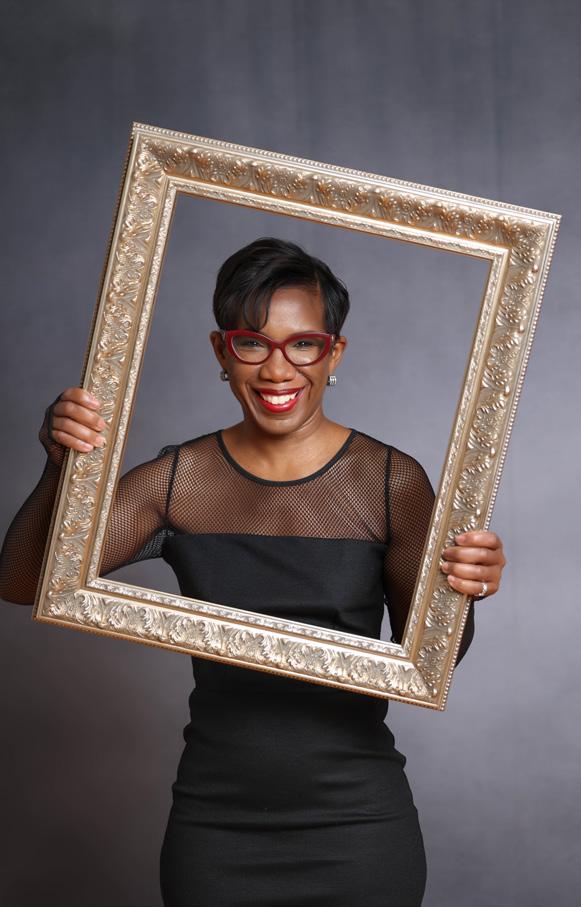
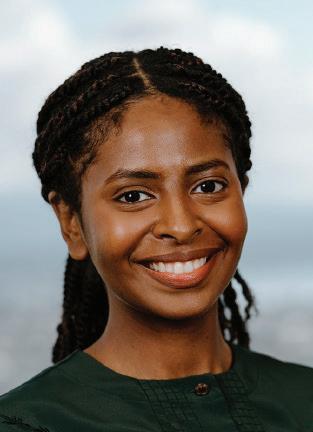


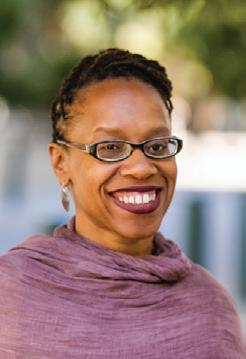
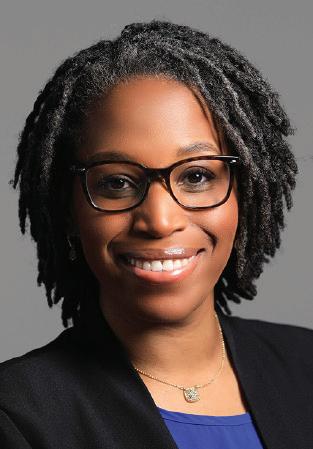

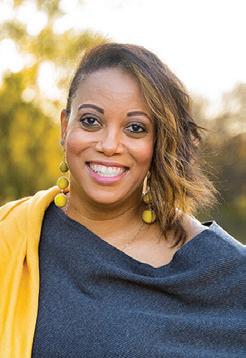
Portraits of Us is the latest addition to Voice. Vision. Value.'s growing body of research and literature documenting the wisdom, fortitude, and ingenuity of Black women leading and reshaping professional philanthropy.
It features essays written by these and other Black women authors and writers.
“I was born and raised in Ohio, and I don’t remember many stories told by or about Black professional women. The Voice. Vision. Value. convening quickly revealed that Black women in philanthropy need a safe space to talk, connect and breathe."
— Kelly Harris DeBerry, author of Freedom Knows My Name
"Nobody loves harder than Black women and that was evident at the Chicago mixer for Voice. Vision. Value. As soon as the women arrived, it felt less like a professional dinner and more like a reunion of sisters.”
— L'Oreal Thompson Payton, author of Stop Waiting for Perfect: Step Out of Your Comfort Zone and Into Your Power
“These women, who do amazing work under di cult circumstances, are undeterred in using their power to bring more opportunity and equitable outcomes to Black and other historically marginalized communities.”
Traci O'Neal Ellis, author of The Exceptional Negro: Racism, White Privilege and the Lie of Respectability Politics